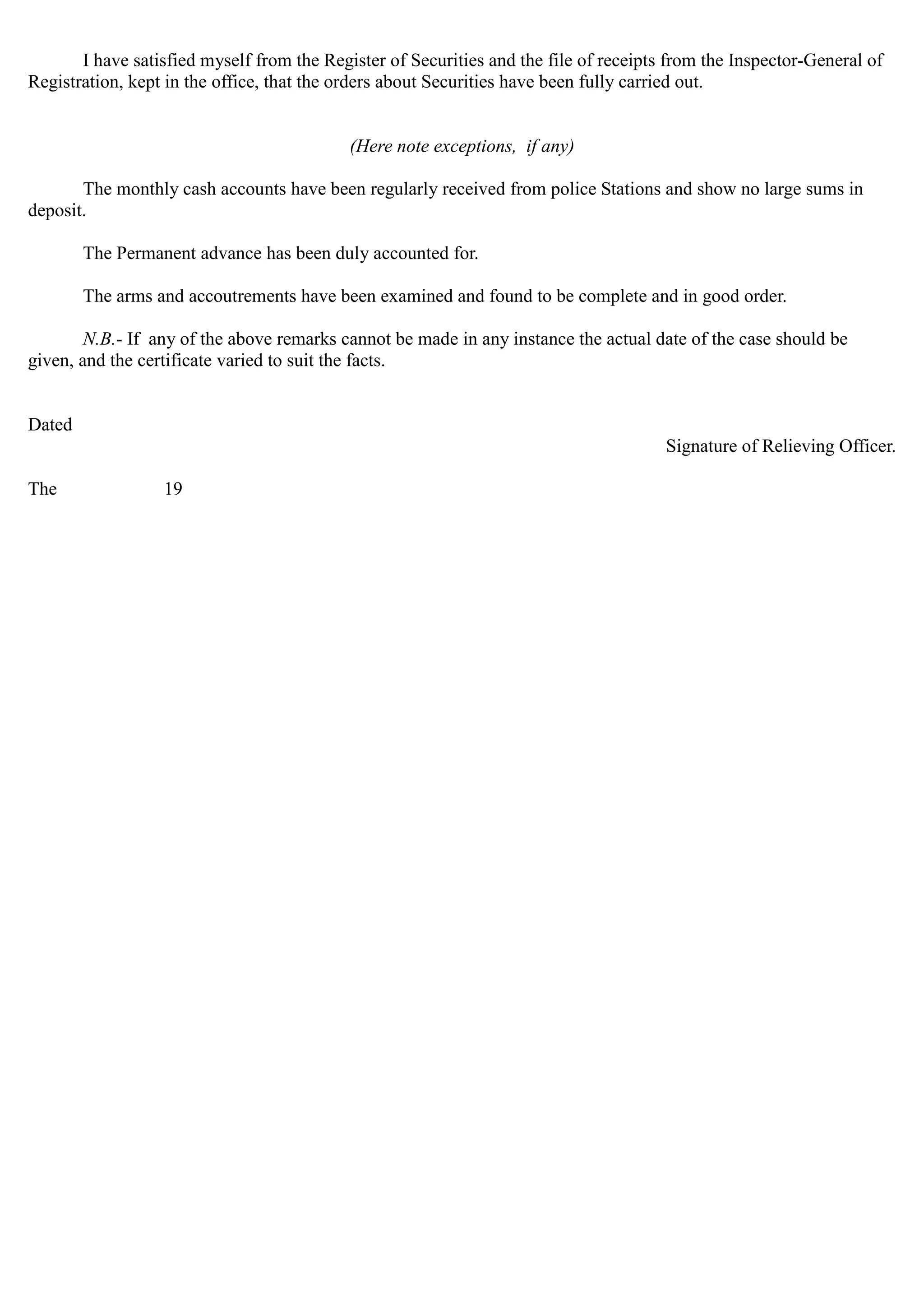This document outlines the structure and organization of the Civil Police Force in the Province of Assam, India. It discusses:
1) The Civil Police Force consists of the District Police, Railway Police, River Police, and Criminal Investigation Department. It includes Gazetted Officers and Non-gazetted Officers.
2) Police administrative areas include the district, sub-division, circle, police station, outpost, town outposts, and beat houses. Districts generally correspond to civil districts, while sub-divisions correspond to civil sub-divisions.
3) The circle is generally conterminous with the sub-division and is under the charge of an Inspector of Police. The police station, headed by
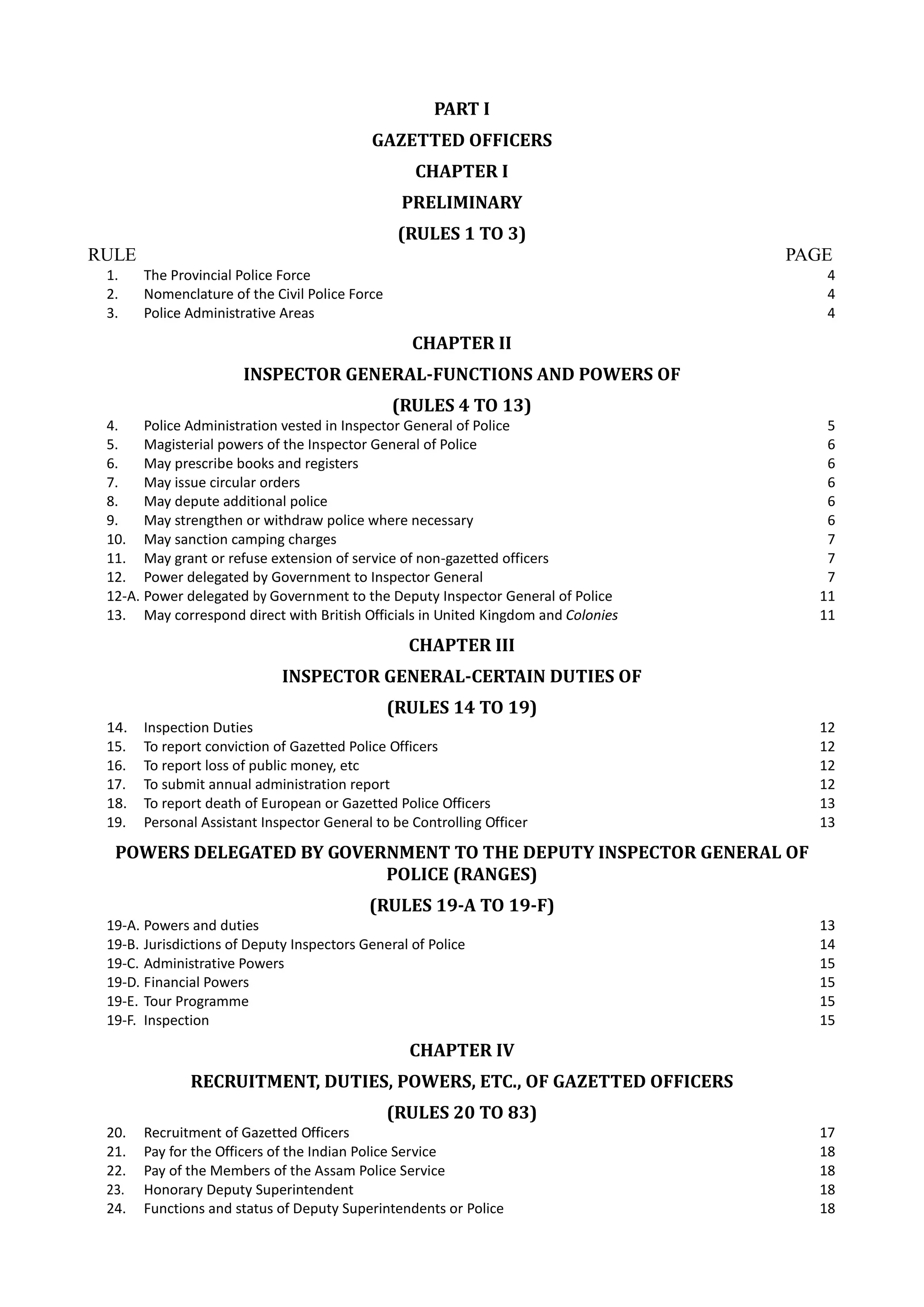
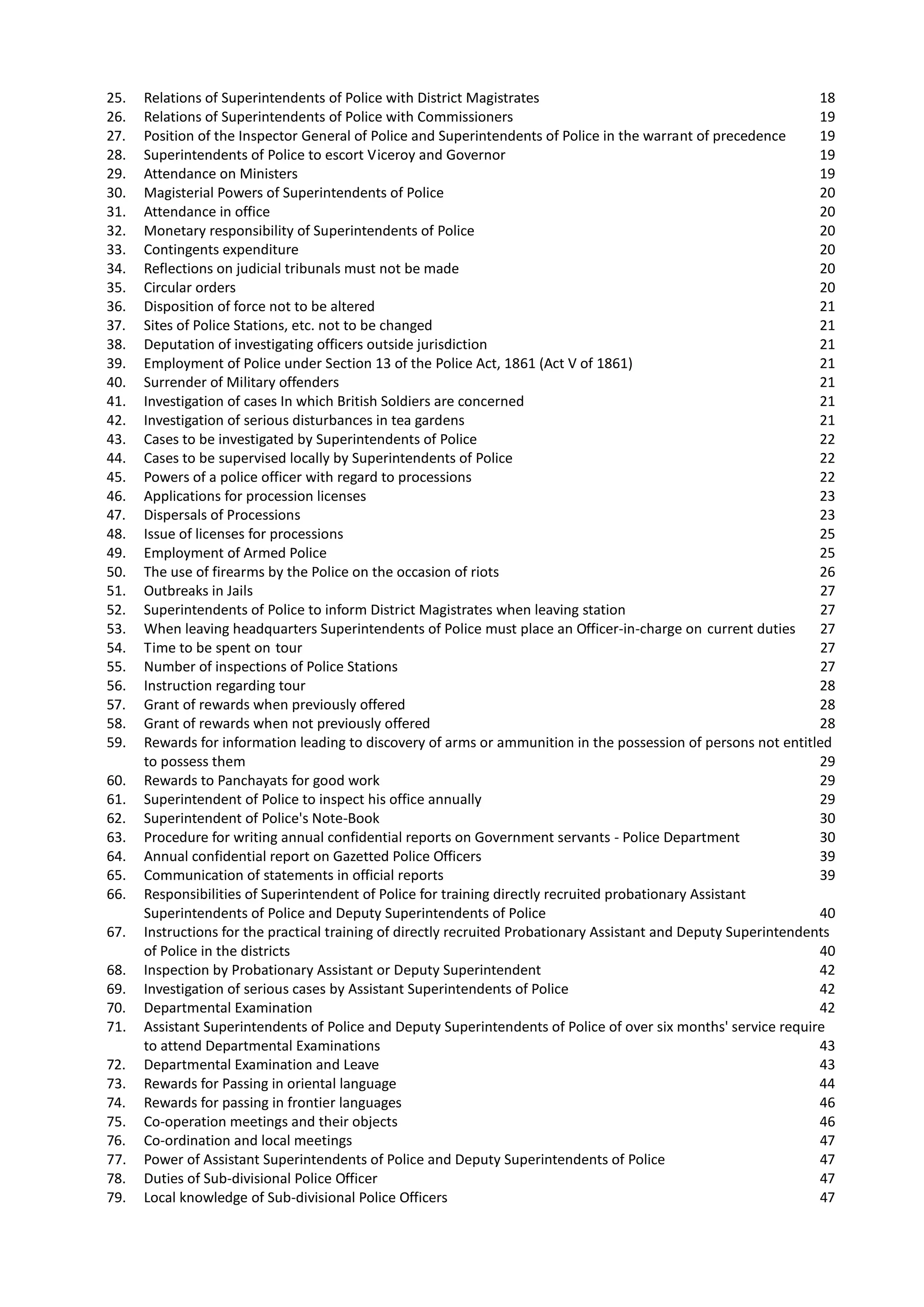
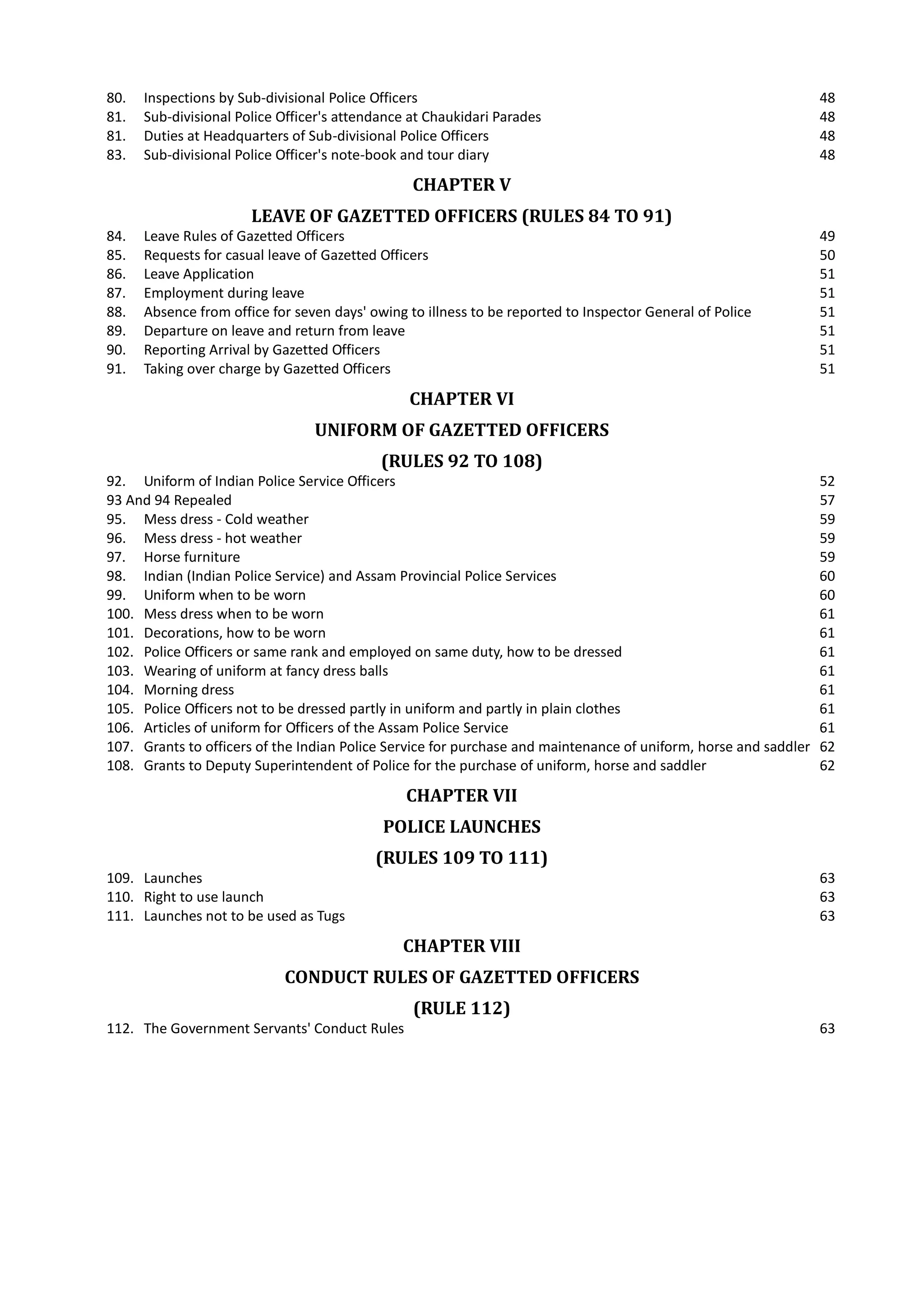
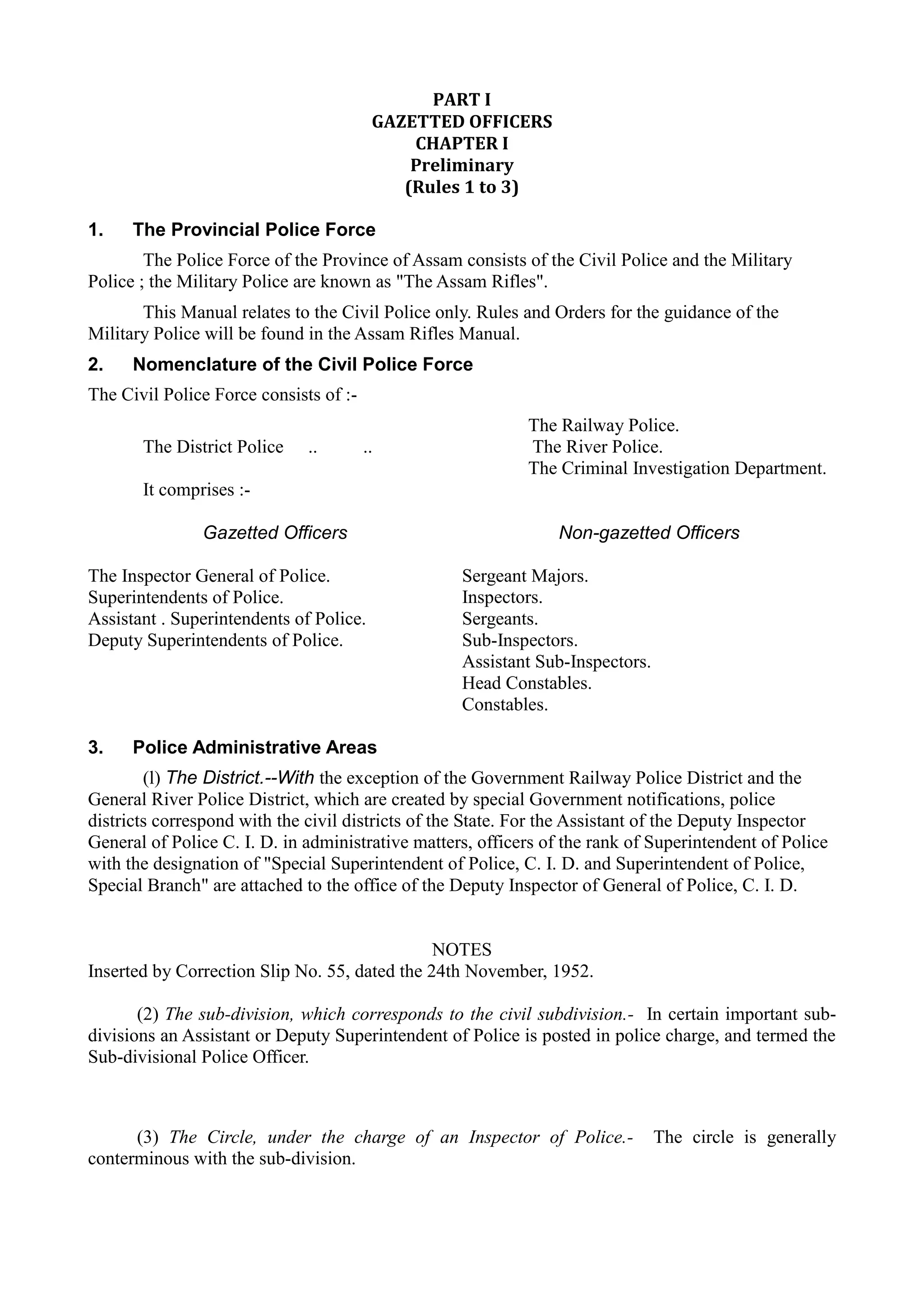
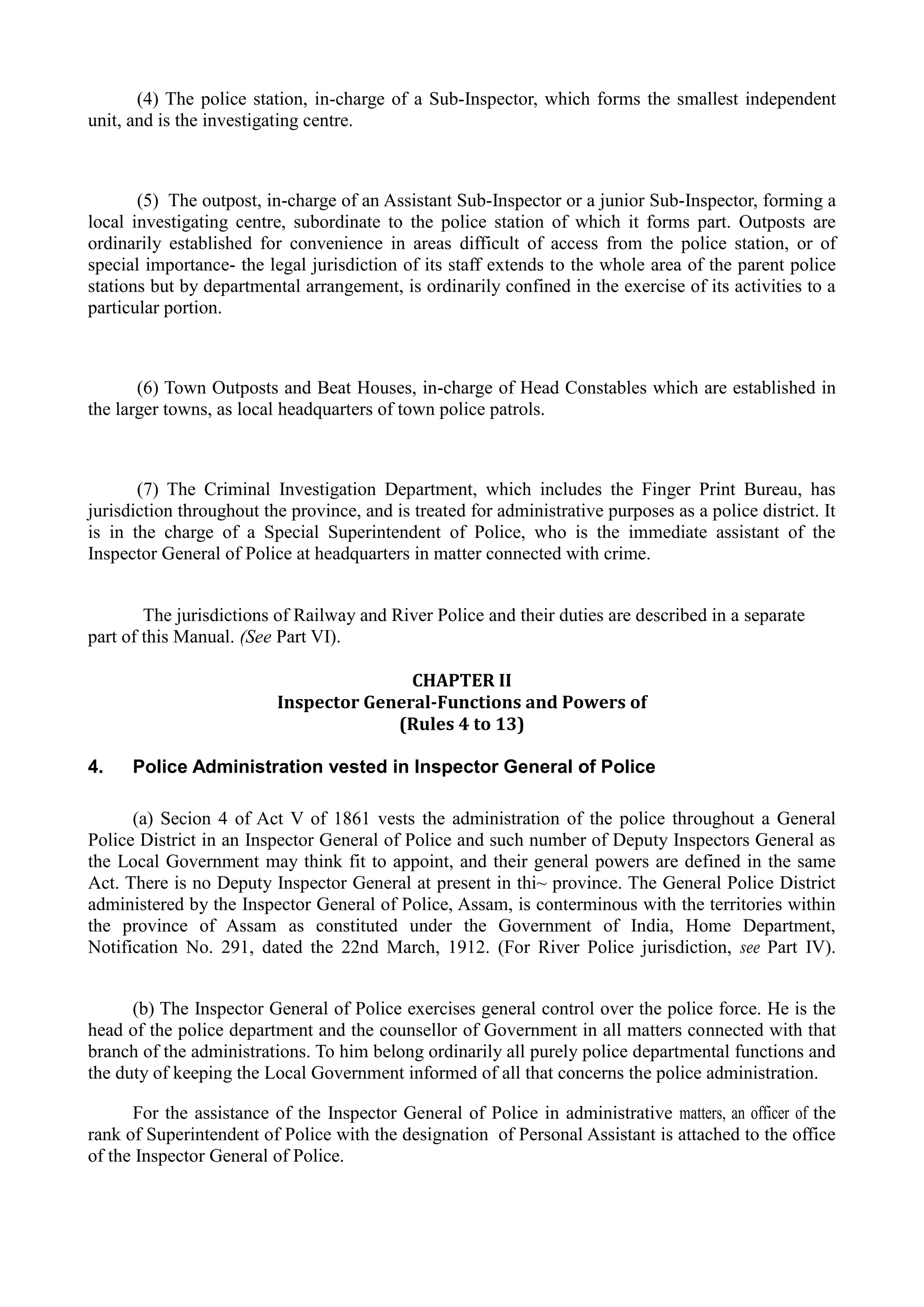
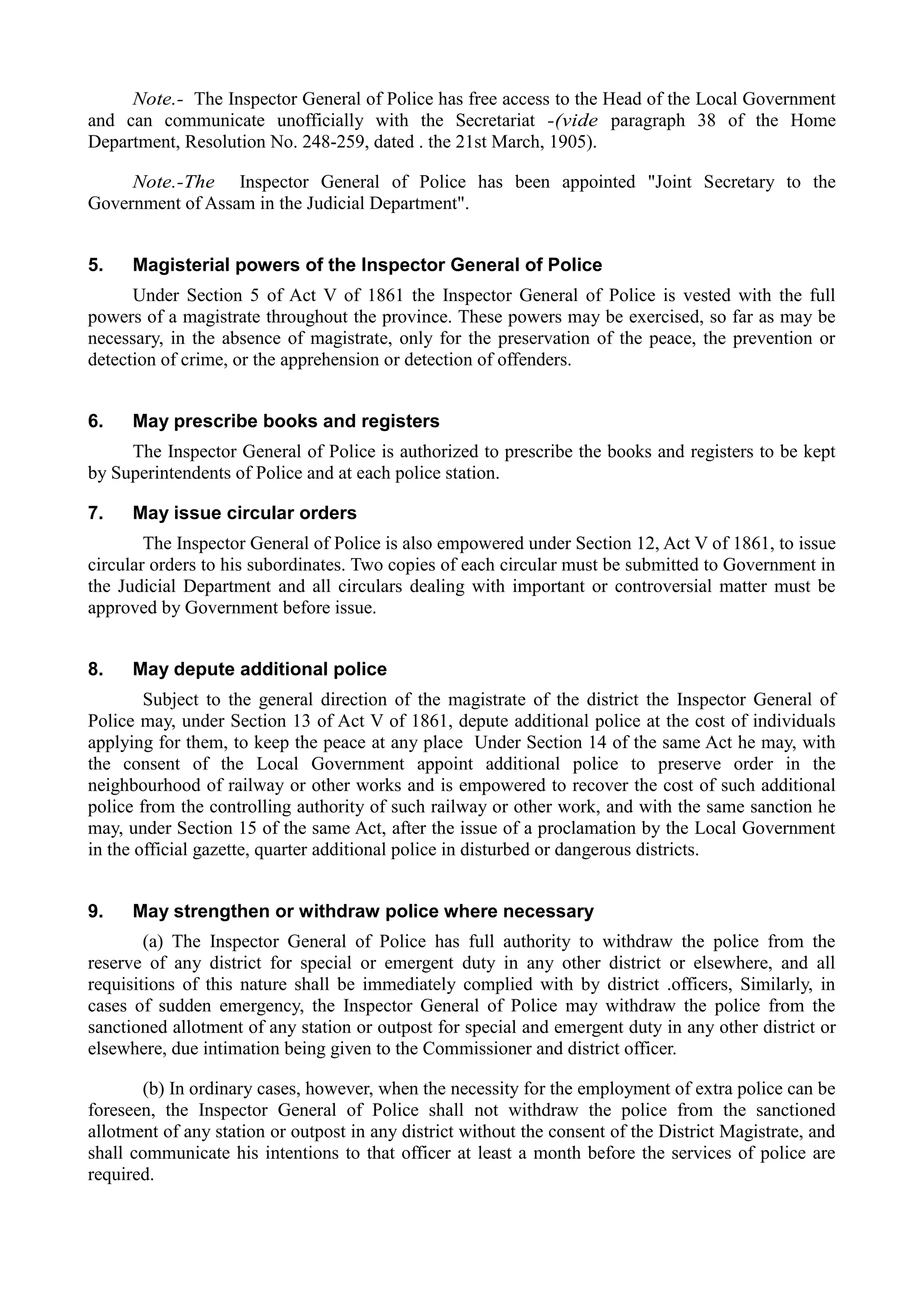
![(c) If the District Magistrate objects to the order of the Inspector General of Police he shall
refer the question to the Divisional Commissioner, and if the Inspector General of Police does not
accept the Commissioner's opinion on the question he must refer it to Government.
10. May sanction camping charges
(a) When the Inspector General is satisfied that it is in the interests of the public service that
a particular Government servant on tour should send his horses; motor cars, motor cycles, bicycles
or camp equipment by railway or steamer or by country craft when no steamer service exists
capable of conveying the goods or animals or when such means of carriage is cheaper or more
expeditious, he may, by special order in such case, permit him to recover, in addition to mileage
allowance or daily allowance or both, the actual cost or part of the actual cost of transporting them.
[Vide Assam Subsidiary Rule 87 (a)].
(b) In the case of a motor car, the cost of transporting a chauffeur or cleaner, and for such
horse the cost of transporting one syce and one grass cutter may be drawn.
(c) The Inspector General may by general or special order prescribe limitations, subject
to the maxima shown in Appendix II, Items 14 and 15 of the Fundamental Rules and Assam
Subsidiary Rules on the weight of camp equipment and the number of conveyances and animals to
be carried at government expense under clause (a) of this rule by a particular government servant or
class of government servants under him. [Vide Assam Subsidiary Rule 87 (b)].
(d) A return of such sanctions should be submitted annually on the 15th January to the
Local Government with brief notes, explaining the circumstances of each case.
NOTES
Deleted vide correction slip No. 14, dated the 17th June, 1936.
11. May grant or refuse extension of service of non-gazetted officers
(a) The Local Government have delegated to the Inspector General- (I) The power of
declaring any non-gazetted subordinate to be efficient, and permitting him to remain in the service,
provided he continues to be efficient for a definite period upto, but not beyond, the age of 60 years,
except in very special circumstances, and in the case of inferior servants. (Vide Fundamental Rule
56).
(II) The Governor in Council, however, reserves to himself the right of finally deciding, in
the event of an appeal, the case of each subordinate, who may be compelled to retire under Rule 1.
(b) Extension of service should not be granted for more than one year at a time and no
extension of service beyond the age of 60 years can be given except by Government. [Vide
Fundamental Rule 56 (a) and Article 459 (c) of the Civil Service Regulations].
(c) The Comptroller should at once be informed of all extensions given. [Vide Article 62 (h)
of the Civil Account Code, Volume 1].
12. Power delegated by Government to Inspector General
The following powers have also been delegated to the Inspector General :](https://image.slidesharecdn.com/assampolicemanualpart1-210925043445/75/Assam-police-manual-part-1-7-2048.jpg)
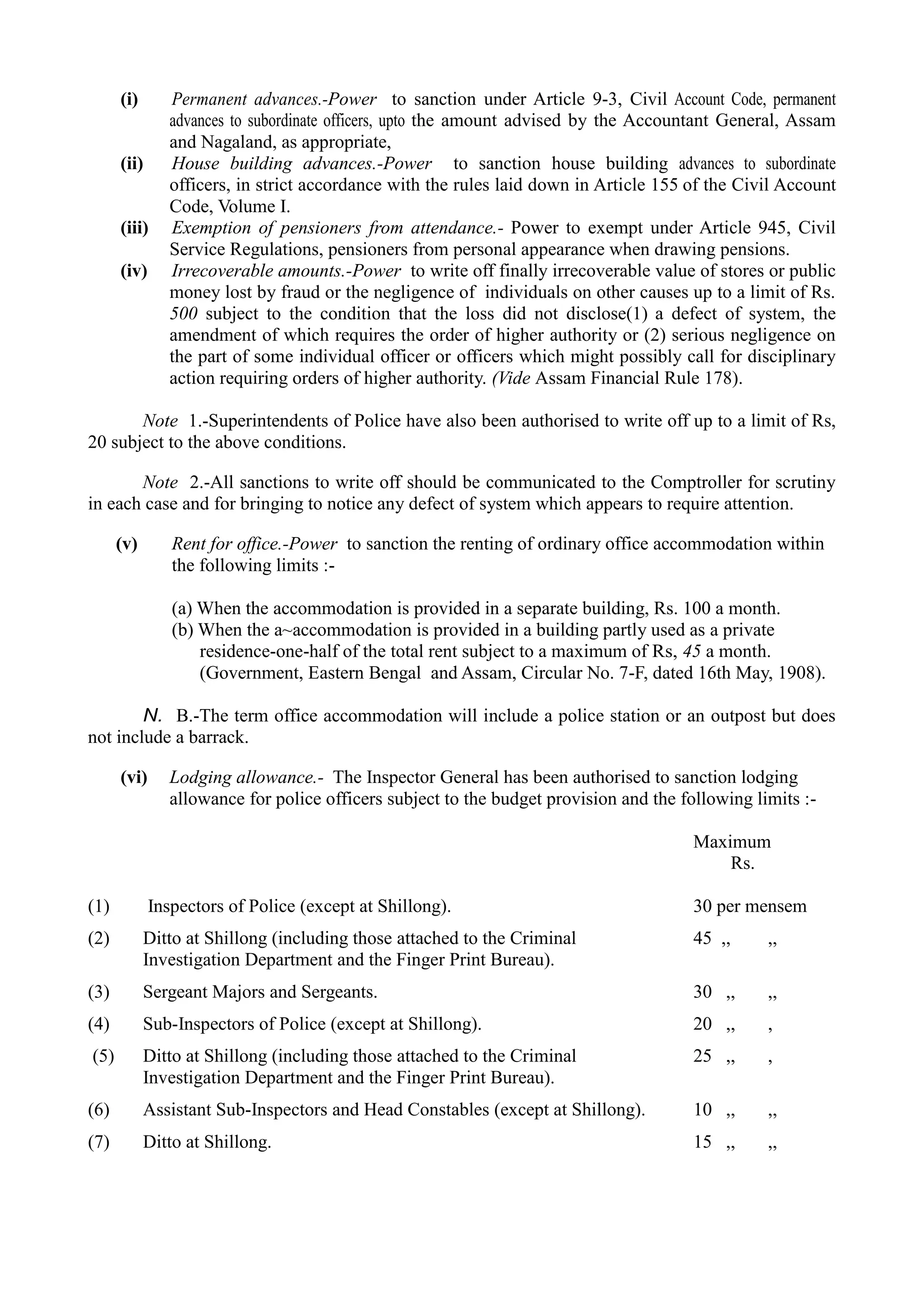
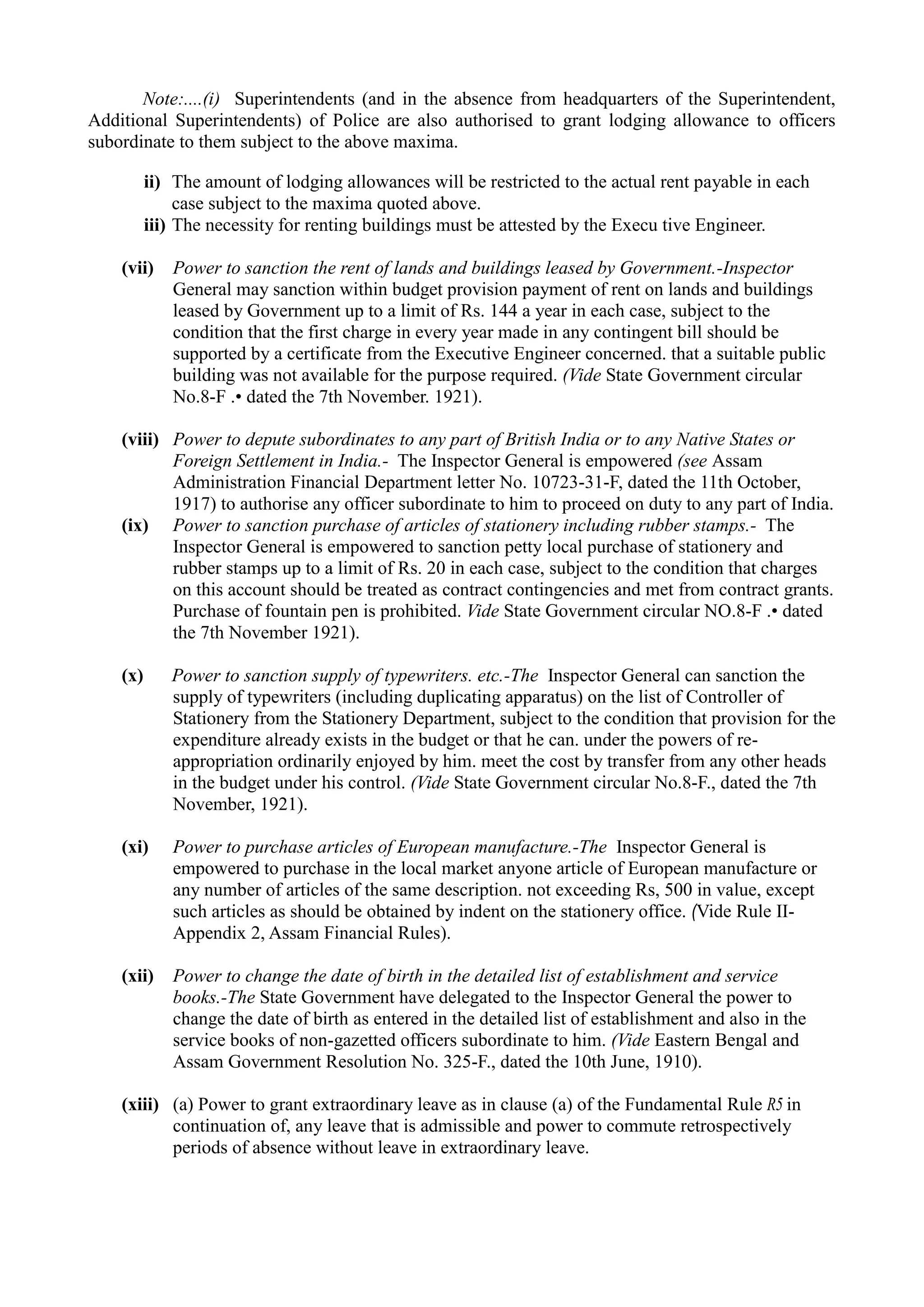
![(b) Power of accepting medical certificates of incapacity lor further service.-If an officer
applying for an invalid pension is sixty years old or upwards no certificate by a medical
officer is necessary; it suffices for the head of the office to certify to the incapacity of the
applicant. Otherwise incapacity for service must be established by a medical certificate
as laid down in Article 442 of the Civil Service Regulations.
An officer who has submitted under Article 442 of the Civil Service Regulations a medical
certificate of incapacity for further. service, must not (except for special reasons to be
reported to the State Government) be retained in active serving pending a decision on his
application for pension nor can he obtain leave of absence.
Without the special orders of the authority which has power to sanction the pension, service
after the date of such medical certificate does not count for pension. (Vide Article 455 of
the Civil Service Regulations.)
(c) Power of accepting a medical certificate bearing a later date than that of the application
for pension. [Vide Article 911 (c) of the Civil Service Regulations.]
(d) Power to sanction condonation of breaks in service under Article 422 of the Civil
Service Regulations.
(e) Power to sanction condonation of deficiencies up to three months under Article 423 of
the Civil Service Regulations in cases where the applicant for pension is serving on a
provincial establishment.
(xiv) Power to vary details of temporary establishment.- The Inspector General has been
empowered to vary details (namely the rates of pay of particular posts, the number of
hands employed and the period of employment) of any temporary establishments
employed under him whether entertained for full periods of one year or for longer or
shorter periods. The delegation of this authority is, however, subject to the following
conditions :
(a) that the cost of a temporary establishment should not be raised beyond the total
amount sanctioned for the establishment by the authority which sanctioned its
employment.
(b) that where the authority sanctioned the employment of the temporary establishment
is the Local Government, the pay of no post shall exceed Rs. 50 per mensem, Without
the special sanction of the Local Government. [Vide Article 910 (c) of the Civil Service
Regulations.]
(c) that in other cases, the pay of no post shall be raised above the l~mit of the sanction
enjoyed by the authority which sanctioned the employment of the temporary
establishment. (Vide Assam Government circular No.8-F., dated the 7th November,
1921.)
(xv) Power to recruit probationary Sub-Inspectors.
(xvi) Power to retain probationary Sub-Inspectors for further training.
NOTES
Both the clauses (xv) end (xvi) were deleted vide correction Ship No.9, dated the 27th November,
1935](https://image.slidesharecdn.com/assampolicemanualpart1-210925043445/75/Assam-police-manual-part-1-10-2048.jpg)
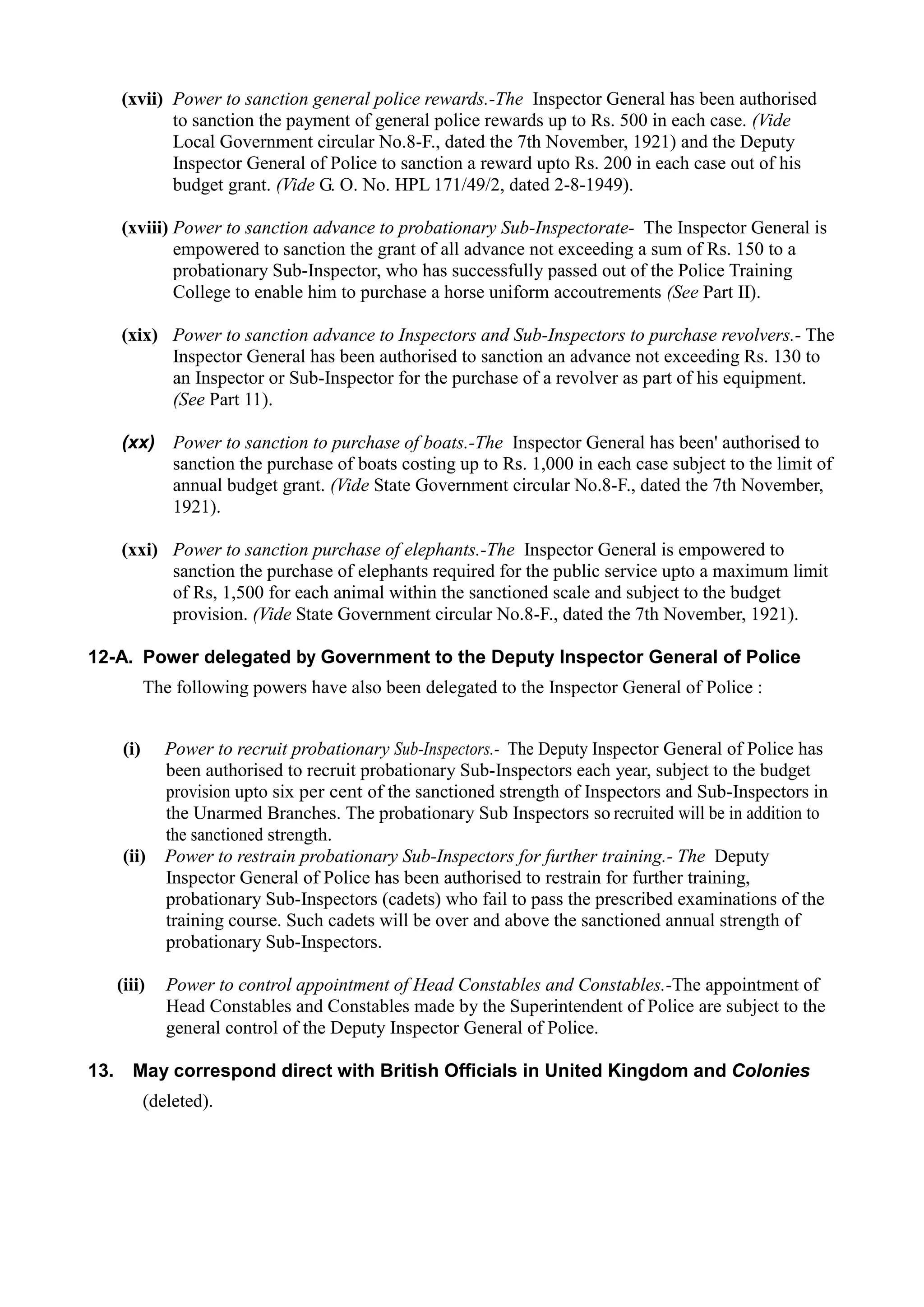
![CHAPTER III
Inspector General-Certain Duties of
(Rules 14 to 19)
14. Inspection Duties
The Inspector General of Police should inspect, personally, a certain number of districts each
year and should so arrange that in the course of three years all the districts of the province will be
visited and inspected. He should also visit as many sub-divisions and police stations as he finds
possible.
He should make the acquaintance of Government officials and all others whom it is useful
for him to know and should make a point of seeing all gazetted police officers, all Inspectors and as
far as possible all Senior Sub Inspectors. Inspectors should come into headquarters on the occasion
of the Inspector General of Police's visits. The inspection statements [Forms Nos. 181 to 186 of
Schedule XL (A) (Part 1)] should be prepared in anticipation of Inspector General of Police's
arrival.
15. To report conviction of Gazetted Police Officers
The Inspector General of Police will report for the information of Government when any
gazetted police officer is convicted of a criminal offence. To enable him to do so, the Magistrate of
the district will report any such case to the Inspector General of Police through the Commissioner.
The Inspector General of Police will send on this report for the orders of Government with his
opinion on the case and a report on the previous conduct of the officer concerned.
16. To report loss of public money, etc
(a) Whenever a defalcation or loss of any public money, stamps or opium, belonging to or in
the custody of the police department, is discovered a report will immediately be made by the
Superintendent of Police to the Inspector General of Police who will forward a copy to the
Comptroller, Assam.
When the matter has been fully enquired into, a further and complete report will be
submitted as to the nature and extent of the loss, showing the errors or neglect of rules by which
such loss was rendered possible. Bengal Government Order No. 4353-J., dated the 2nd December,
1892).
(b) The discovery of forged currency notes should be reported to the Deputy Controller of
Currency, Calcutta. (Letter No. BK/735, dated the 23rd February, 1922, from the Comptroller to the
Special Superintendent of Police in-charge of Criminal Investigation Department, Assam).
17. To submit annual administration report
(a) The Inspector General of Police is required to submit to Government an annual report
showing the administration of his department in all those districts in which Act V of 1861 is or may
be in force. The materials for this report will be obtained from the reports of his subordinates. (Vide
Part II of this Manual).
(b) In the preparation of these reports consciousness should be studied. The object aimed at
being to convey the greatest amount of information in the fewest words possible. The practice of
weaving into sentences figures already given in tabular statements should be avoided, and extracts
from the reports of subordinates should not be strung together at considerable length when they
might with advantage by summarised.](https://image.slidesharecdn.com/assampolicemanualpart1-210925043445/75/Assam-police-manual-part-1-12-2048.jpg)
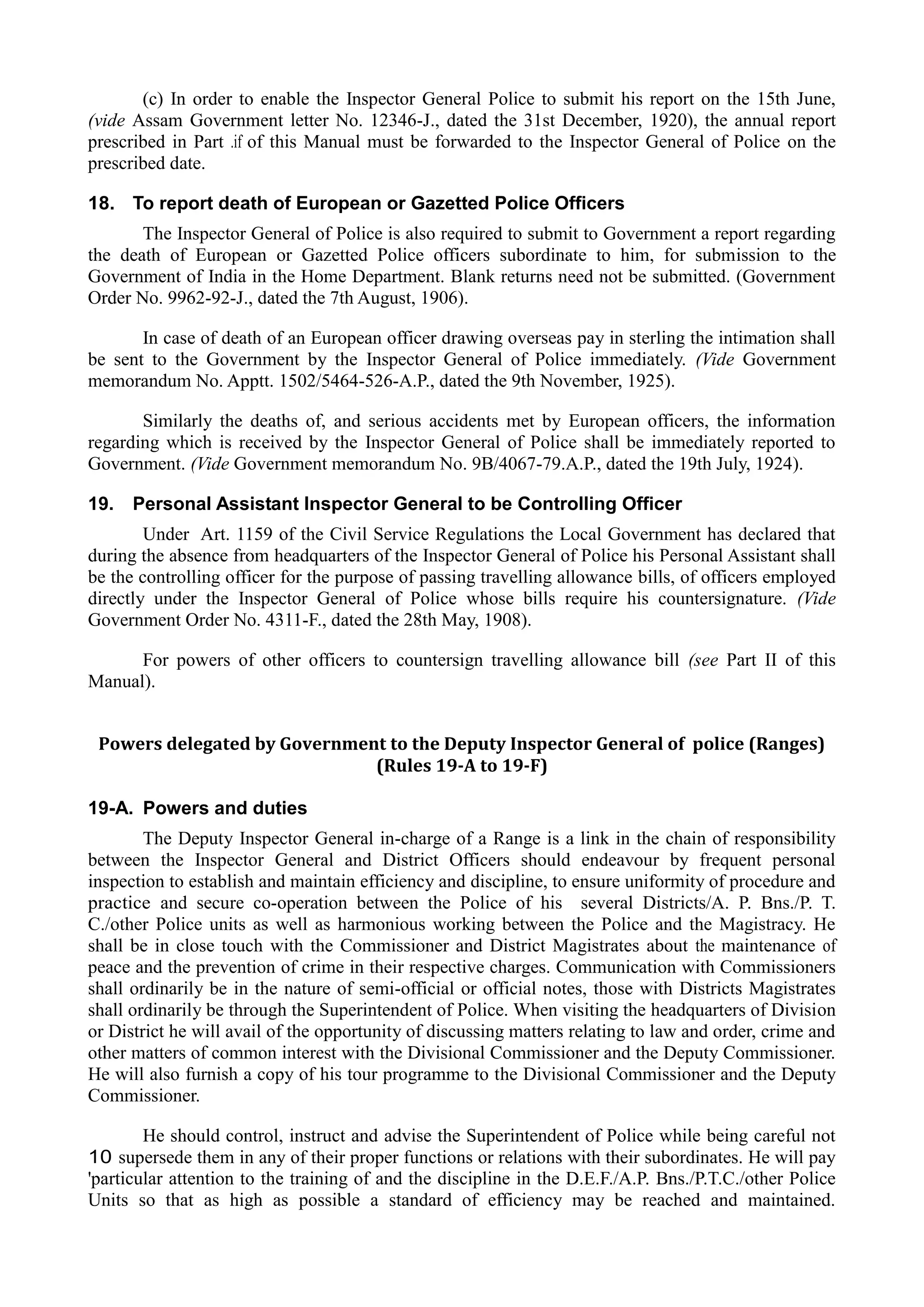
![Superintendents/Commandants/Principal, P.T.C./other heads of police Units on their part, should
treat the Deputy Inspector General with frankness, assist him in his inquiries, being to his notice the
requirements of their Districts/Units and consult him confidentially in all matters of difficulty.
19-B. Jurisdictions of Deputy Inspectors General of Police
The jurisdictions of the following Deputy Inspectors General of Police are distributed as
shown against each. [Authority Government letter No. HPL. 109/69/10 (a), dated the 29th July,
1969.]
1. Deputy Inspector General of Police, Eastern,
Range, Jorhat,
2. Deputy Inspector General of Police, Western
Range, Guwahati.
3. Deputy Inspector General of Police,
Southern Range, Haflong.
4. Deputy Inspector General of Police, Criminal
Investigation Department, Assam, Guwahati.
5. Deputy Inspector General of Police, Border,
Assam, Guwahati,
6. Deputy Inspector General of Police,
(Administration), Assam, Guwahati.
7. Deputy Inspector General of Police, Training,
Armed Polioe and Technical Wings,
Guwahati.
8. Deputy Inspector General of Police, S.B.
Assam, Guwahati.
9. Deputy Inspector General of Police, North-
Eastern Range.
10. Deputy Inspector General of Police,
Communication.
11. Deputy Director, Commandant General,
Home Guards, Civil Defence, etc.
12. Deputy Inspector General of Police, O.S.D.
13. Deputy Inspector General of Police, Nagaland
Border.
1. Dibrugharh. 2. Sibsagar. 3. Karbi Anglong,
1. Kamrup. 2. Goalpara. 3. Nowgong. 4.
Railways.
1. Cachar. 2. North-Cachar Hills.
1. Criminal Investigation Department.
2. Village Defence Organization.
1. Bangladesh Infiltration, Nepal Infiltration and
all other Infitrations, etc.
1. Headquarters Administration.
2. Anti-corruption Branch.
1. Assam Police Battalions.
2. Assam Police Training College.
3. Armed Police Training Centre.
4. Fire Service.
5. Assam Police Radio Organisation.
6. Traffic.
7. Detective Training School.
8. Central Workshops and Stores.
1. Special Branch Organization.
1. North-Lakhimpur .
2. Darrang.
1. Assam Police Radio Organization.
1. Home Guards and Civil Defence.
1. Attached to Home Department.
*1. Assam & Nagaland Bordering areas.](https://image.slidesharecdn.com/assampolicemanualpart1-210925043445/75/Assam-police-manual-part-1-14-2048.jpg)
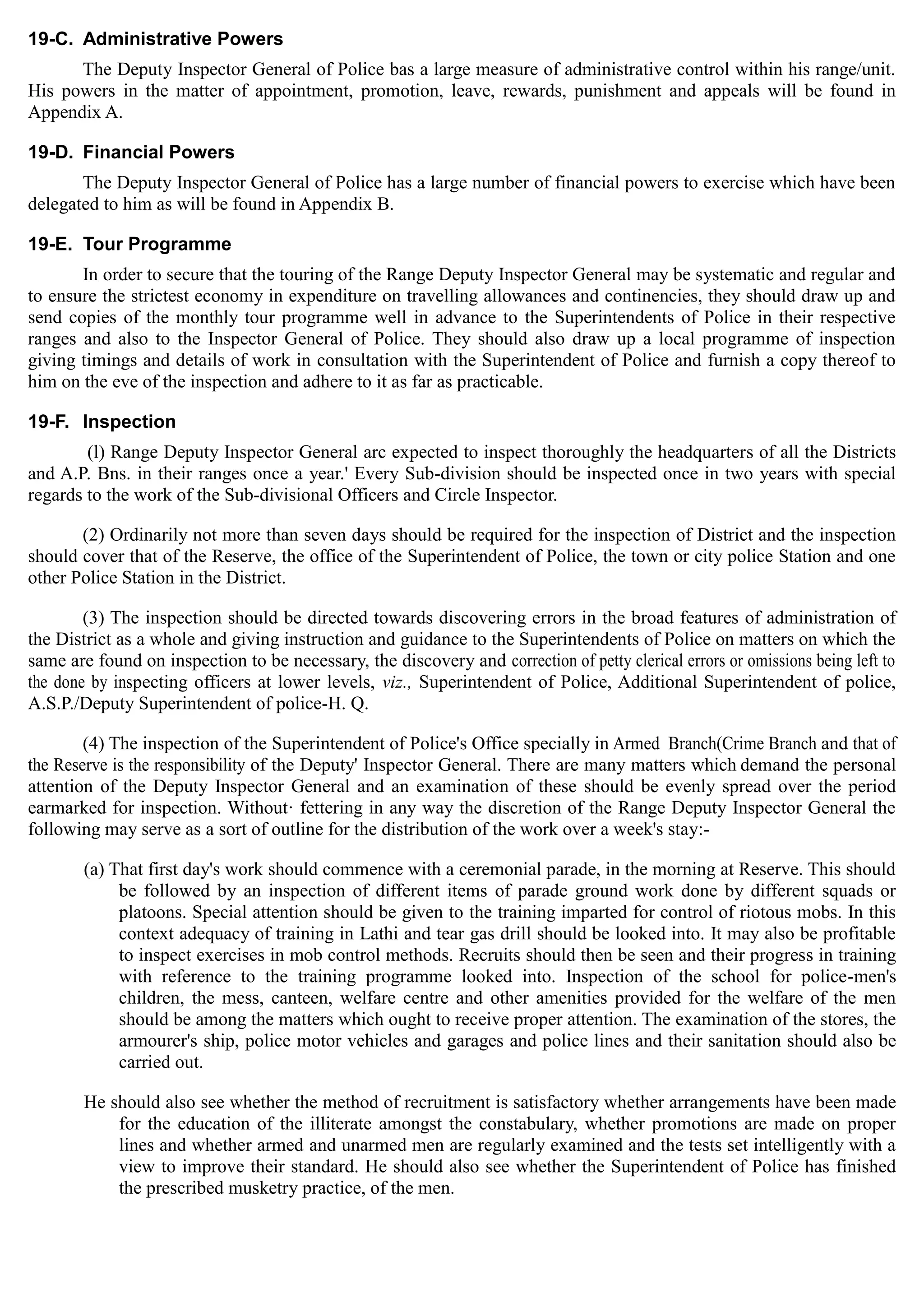
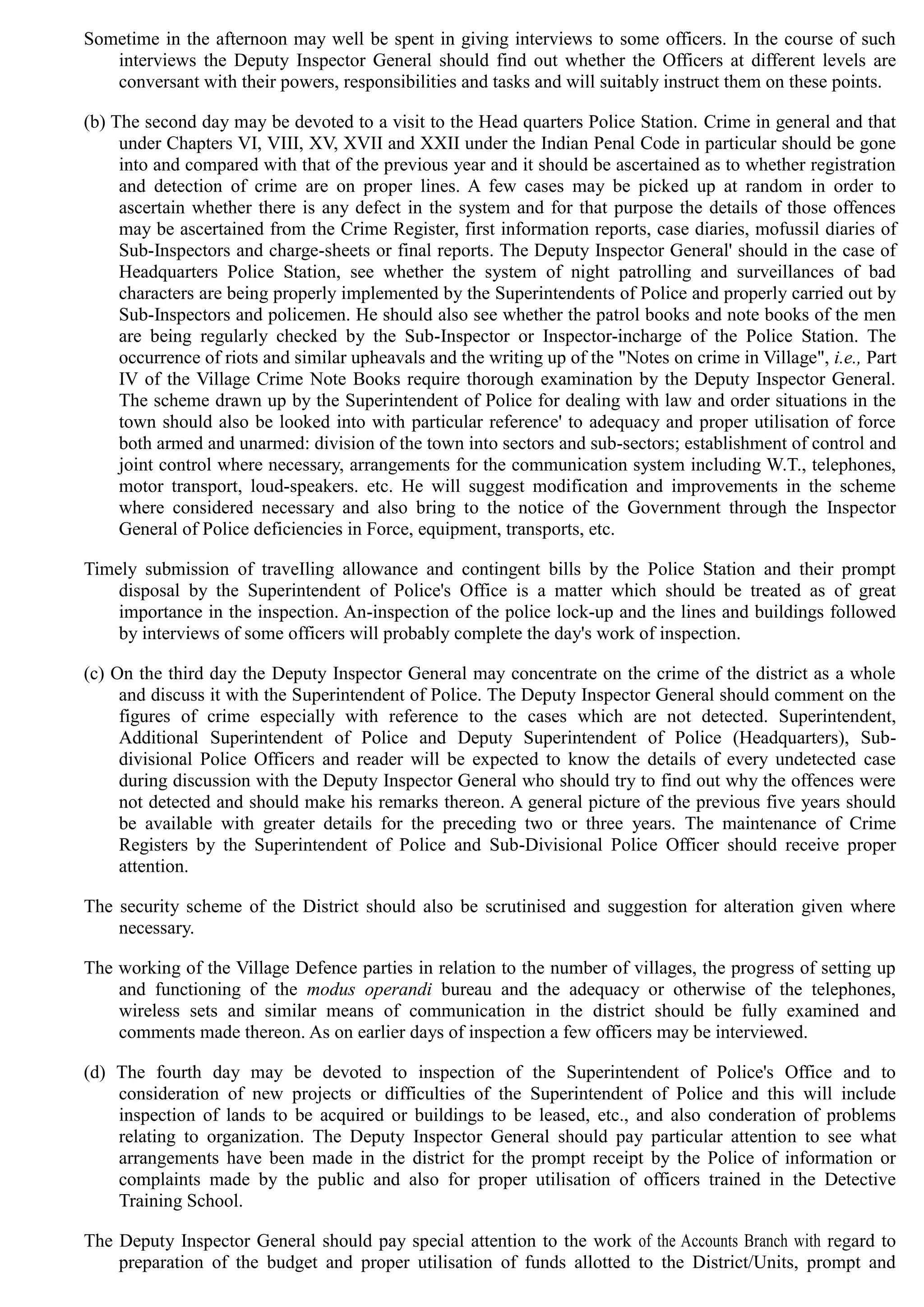
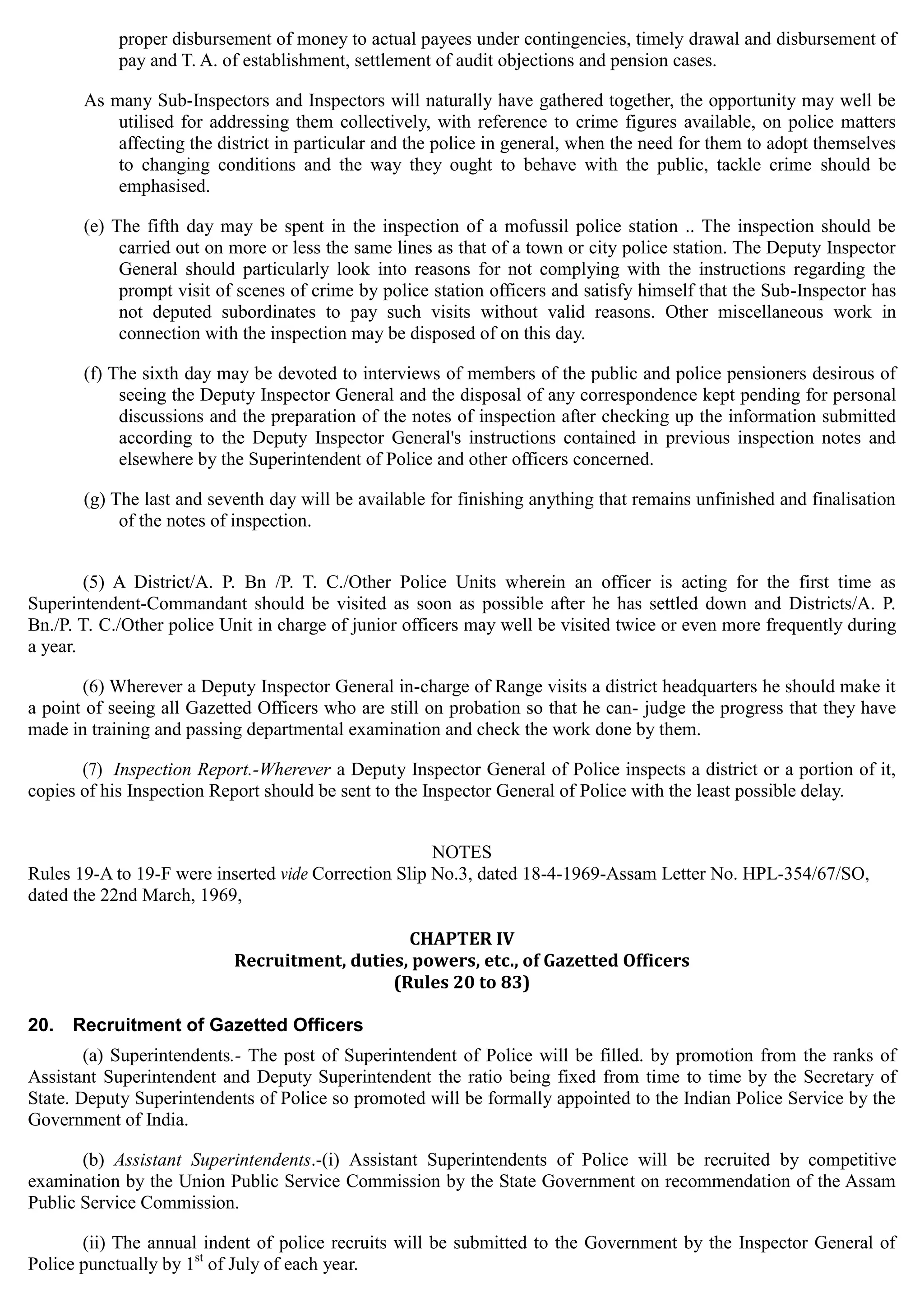
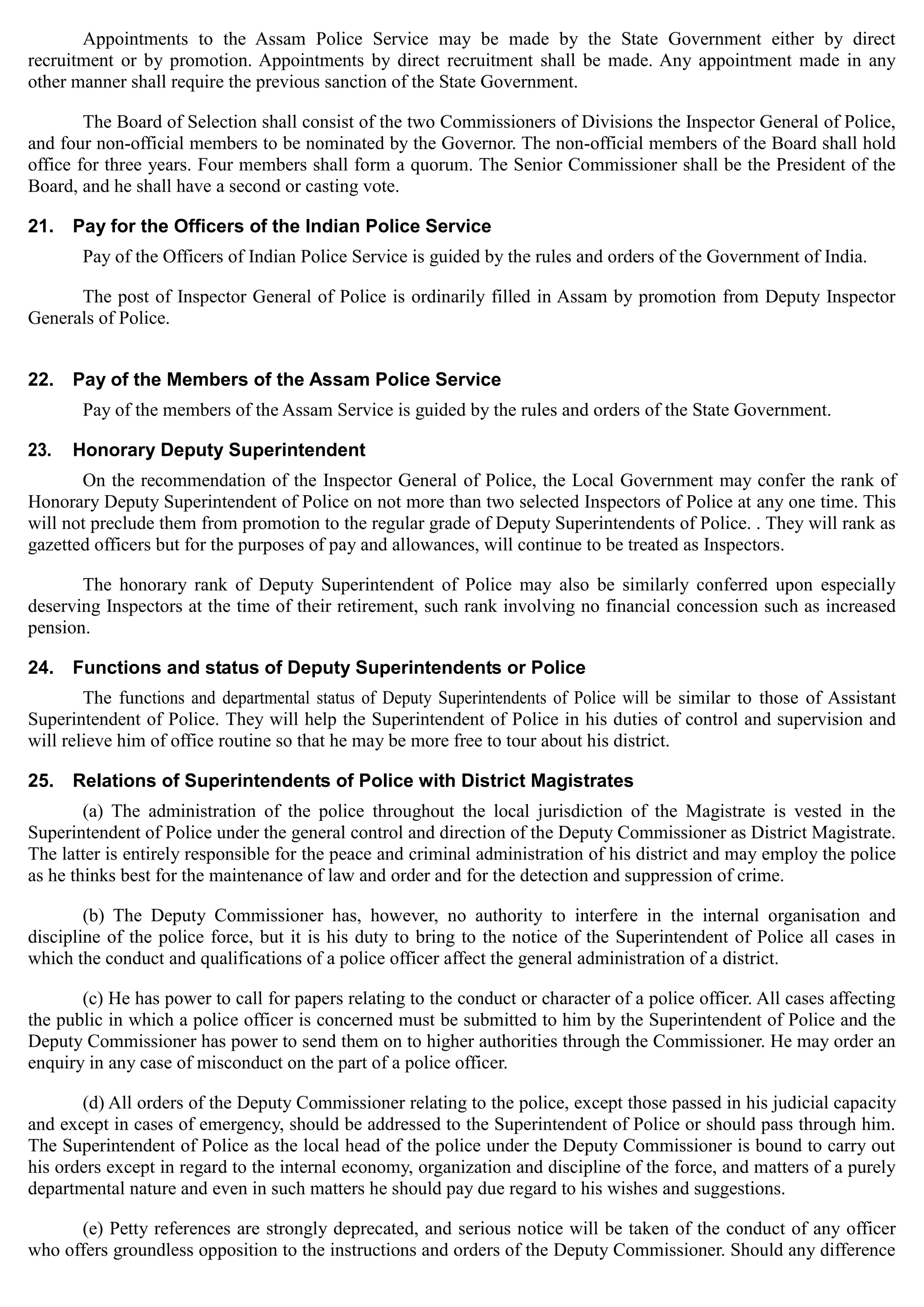
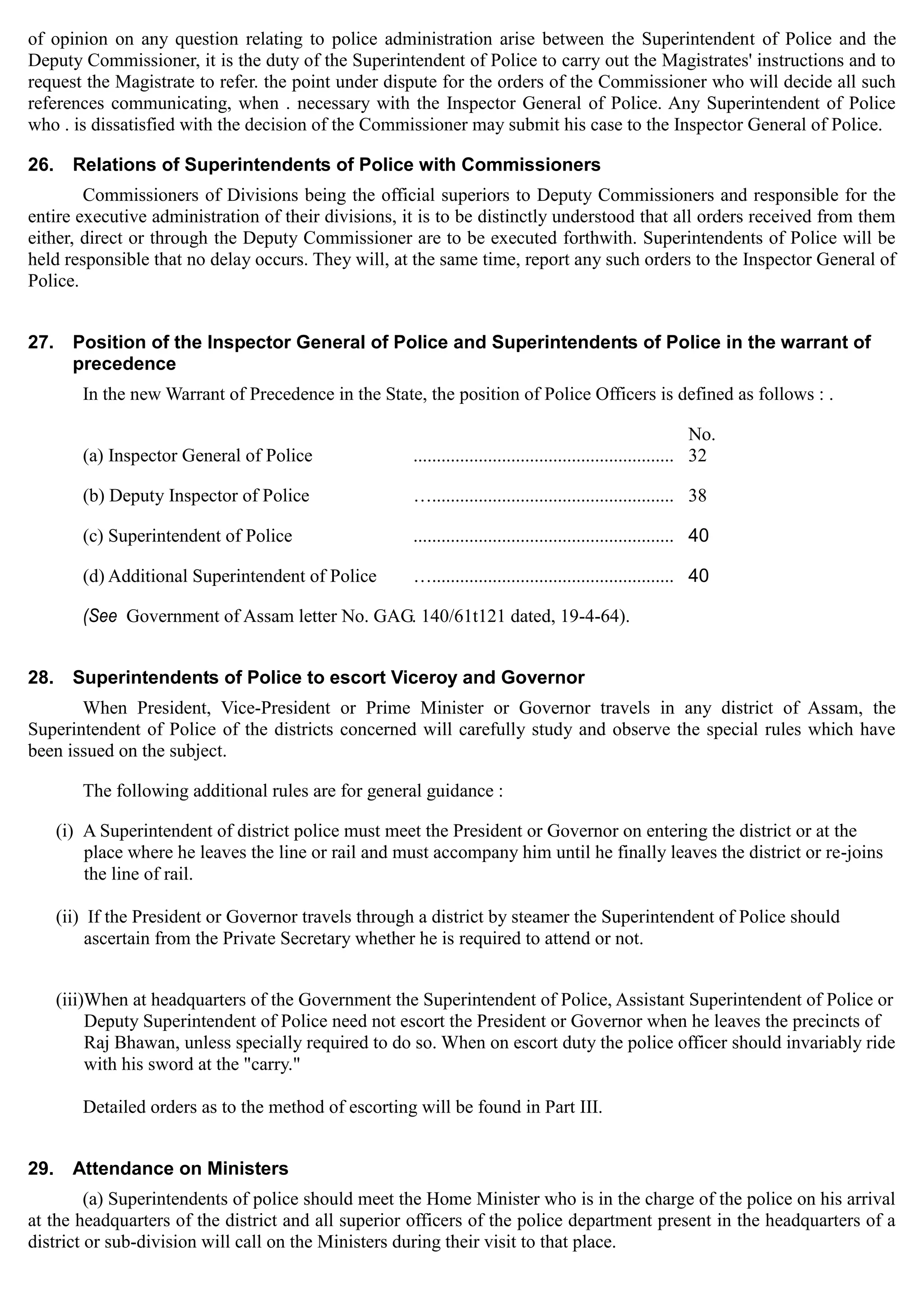
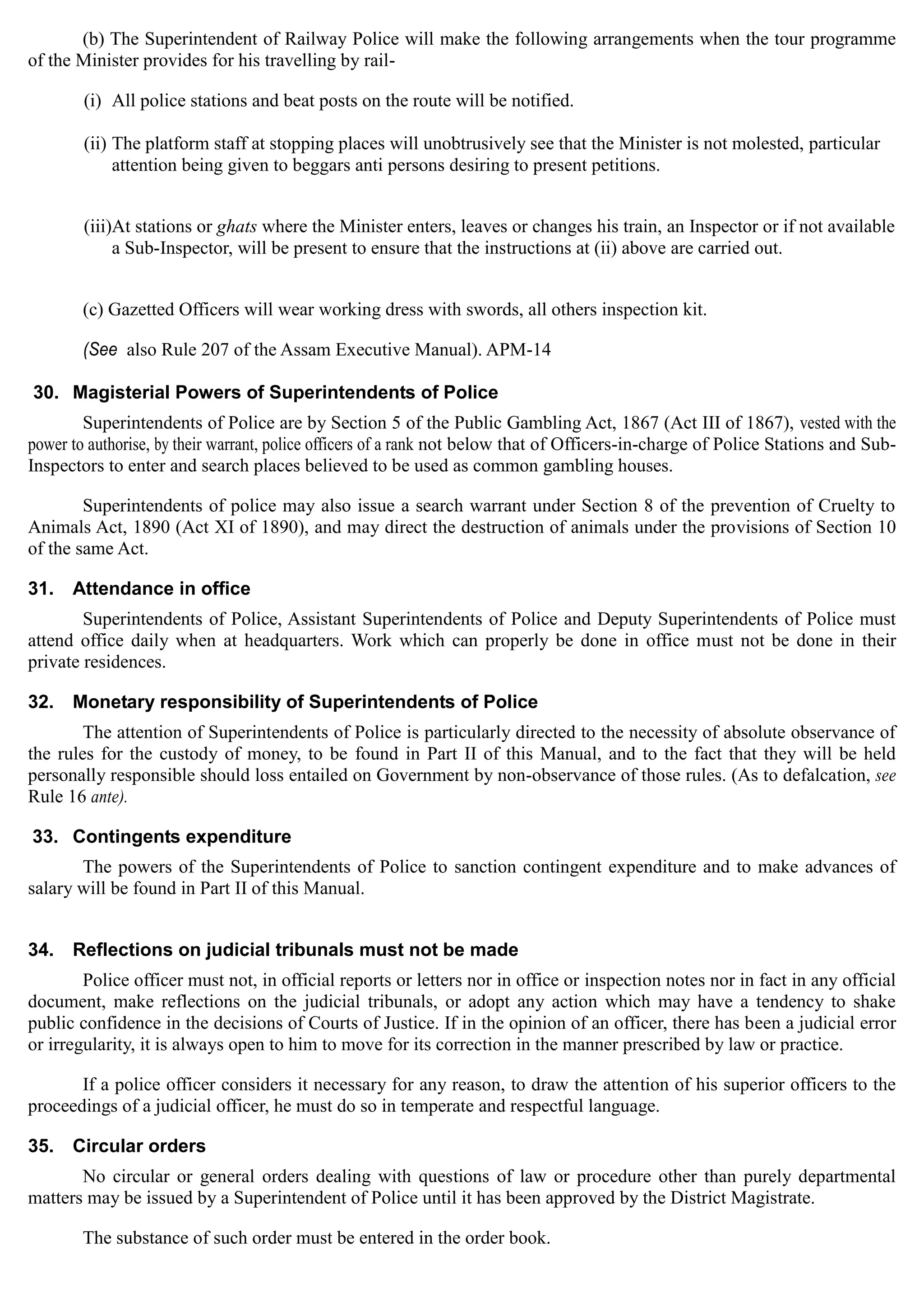
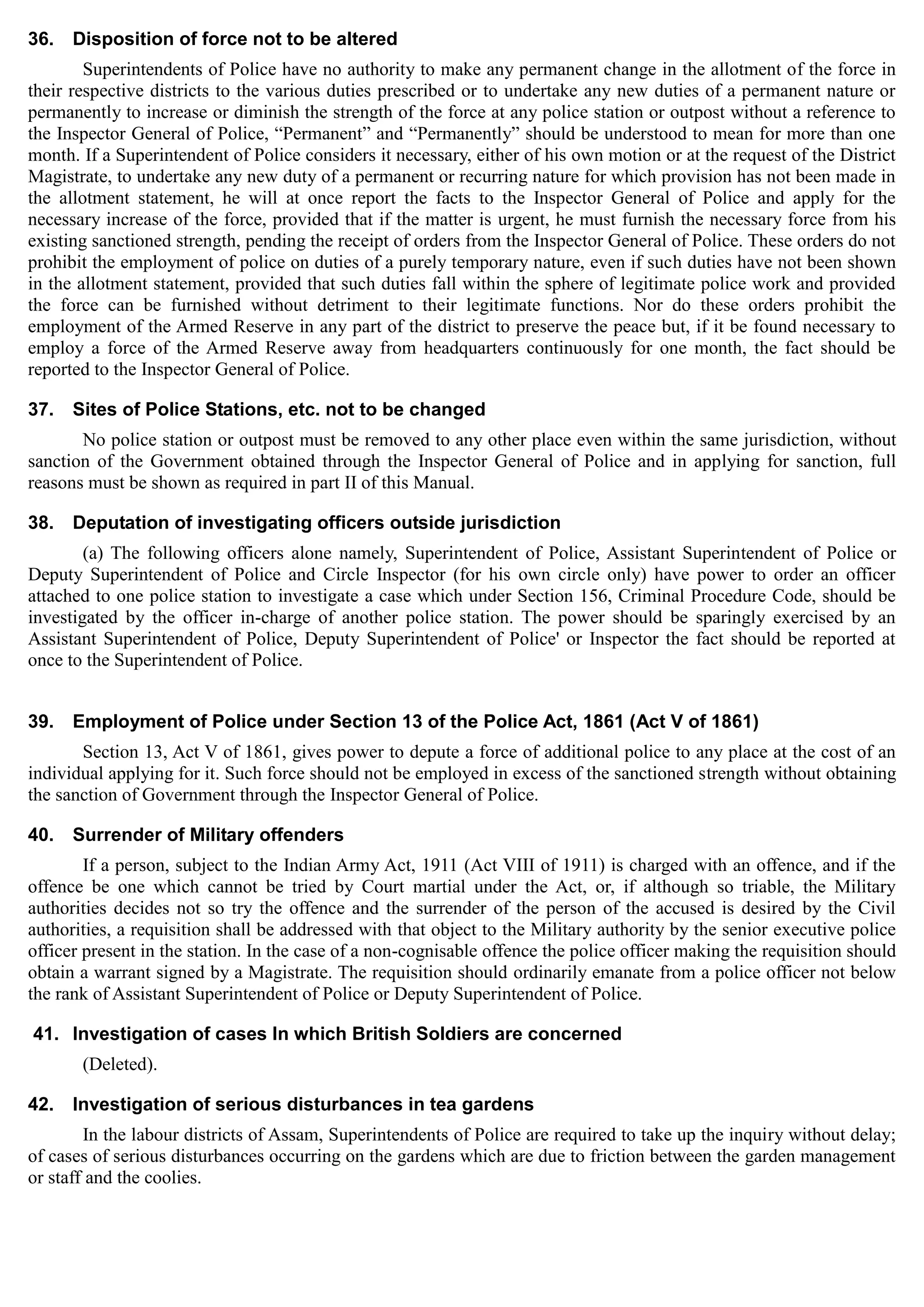
![43. Cases to be investigated by Superintendents of Police
Speaking generally Superintendents of Police should personally investigate all serious cases in which
Europeans are accused and all serious cases in which racial feelings have been or are likely to be aroused. (See also
Rule 119 of the Assam Executive Manual).
44. Cases to be supervised locally by Superintendents of Police
The Superintendents of Police must, whenever possible, proceed will all speed to the place of occurrence,
and personally supervise investigation in all serious cases such as:
(a) Intricate murders (including attempts).
(b) Dacoity.
(c) Highway robbery between sunset and sunrise.
(d) Serious riots.
(e) Grave cases in which European land owners or others influential persons are concerned.
(f) Big burglary and theft cases.
In sub-division where there is a Sub-divisional police officer that officer is primarily responsible for this
duty. It is left to the discretion of the Superintendent of Police to attend also. The investigation of such of the above
cases as are immediately detected and present no difficulties need not be supervised by either officer.
(2) Supervision should be restricted to an examination of the diaries to see that the investigation is being
intelligently, vigorously, and legally conducted, that confession are not unlawfully obtained and if obtained are
treated with all caution, that clues are not neglected and every line of enquiry which may suggest itself duly
explored, and generally to ensure that the subordinate officers engaged are acting strictly within their powers and
without harassment of the public. The re-questioning of witnesses already questioned is left to the discretion of the
supervising officer. The practice is often dangerous and always causes delay which might prejudice the case. It
should only be resorted to when there is any suspicion that the witnesses have not been properly questioned, or their
statements wrongly recorded, by the investigating officer.
(3) If the Superintendent of Police or Sub-Divisional police Officer is prevented by unavoidable
circumstances from supervising the investigation of any serious cases, the duty should be entrusted to an Assistant
or Deputy Superintendent and the circumstances should be immediately reported.
(4) In column 5, page 2 of the half-yearly statement of serious crimes [Form No. 125 of Schedule XI (A)]
the stage or stages during which the investigation was conducted personally by the Superintendent of Police should
be clearly indicated.
(5) The name of any Superintendent of Police or Assistant or Deputy Superintendent of Police who seriously
neglects the instructions prescribed in these rules should be promptly brought to the notice of Government.
45. Powers of a police officer with regard to processions
A police officer has no power under the law to prohibit a procession. If he deems it necessary to do so he
should request the magistrate to take action under Section 144, Criminal Procedure Code.
(2) Under Section 30 (l) of the Police Act (Act V of 1861) a Superintendent of Police, Assistant
Superintendent or Deputy Superintendent of Police may, as occasion requires, direct the conduct of all assemblies
and processions, whether or not the promoters have applied for license on the public road or in the public streets or
thoroughfares, and prescribe the routes by which, and the times at which such procession may pass, In pursuance of
this duty he may, even ir, the absence of a notice under Section 30 (2) or of an application for license submitted in
accordance therewith, issue written directions prescribing routes and times. Disobedience to such directions by a
person who is aware of them is an offence punishable under Section 32 whether the directions are written or verbal.
An offence under Section 32 is a non-cognizable offence. Such disobedience does not of itself render the
processions an unlawful assembly or make it liable to be dispersed under Sections 127 and 1 28, Criminal Procedure
Code, unless a license has been applied for and granted under Section 30(3) of the Police Act, and the conditions of
that license have been violated.](https://image.slidesharecdn.com/assampolicemanualpart1-210925043445/75/Assam-police-manual-part-1-22-2048.jpg)
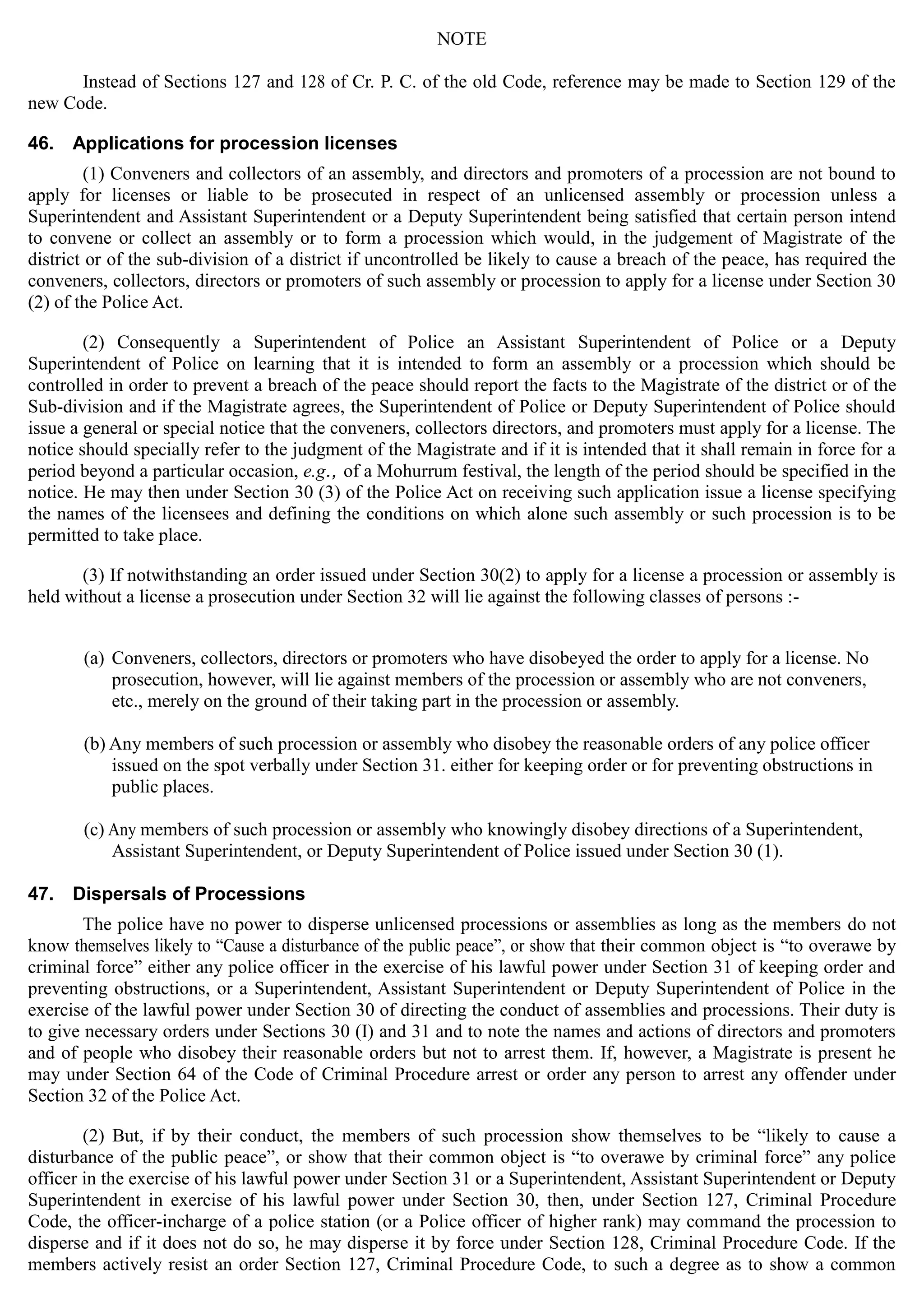
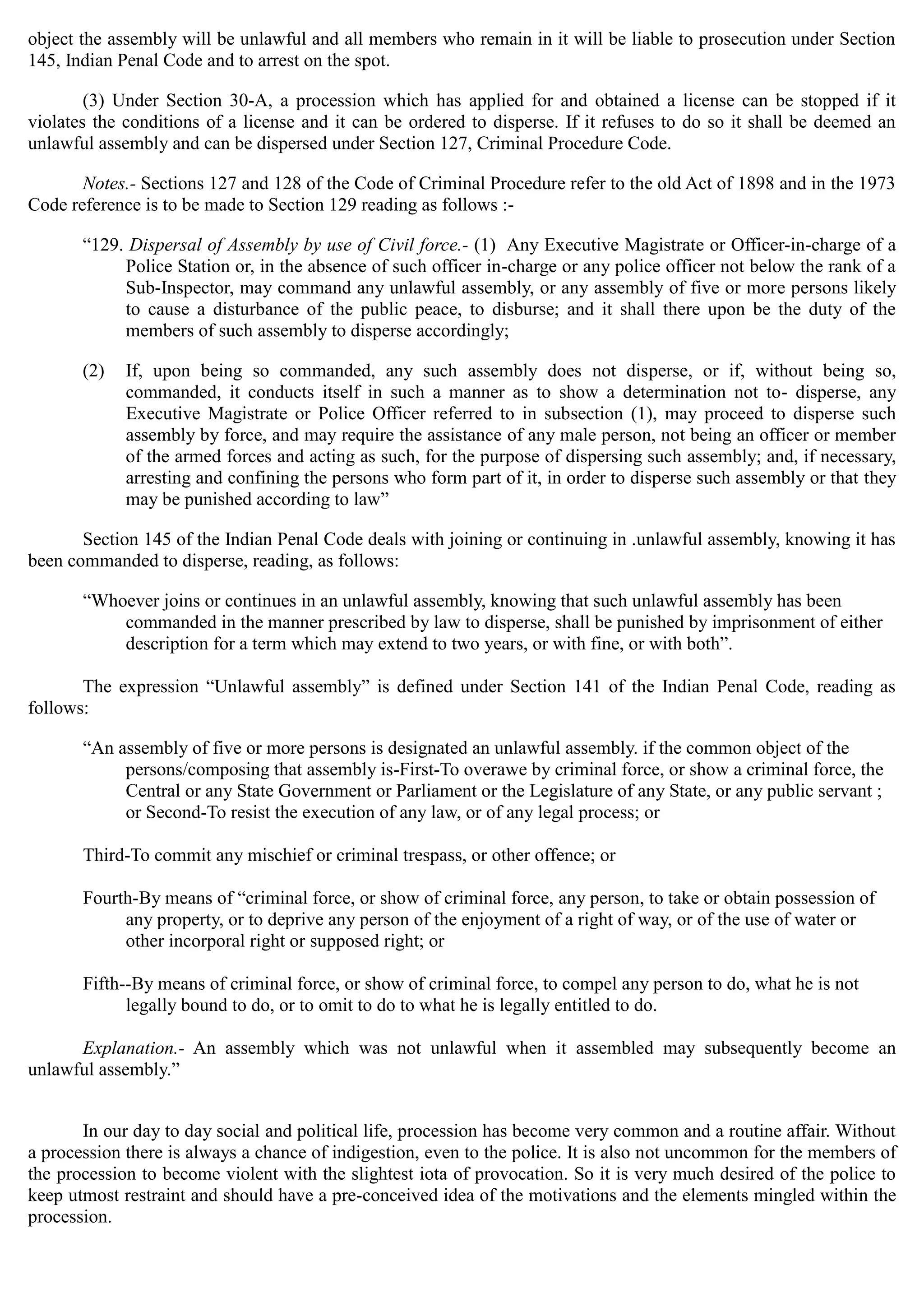
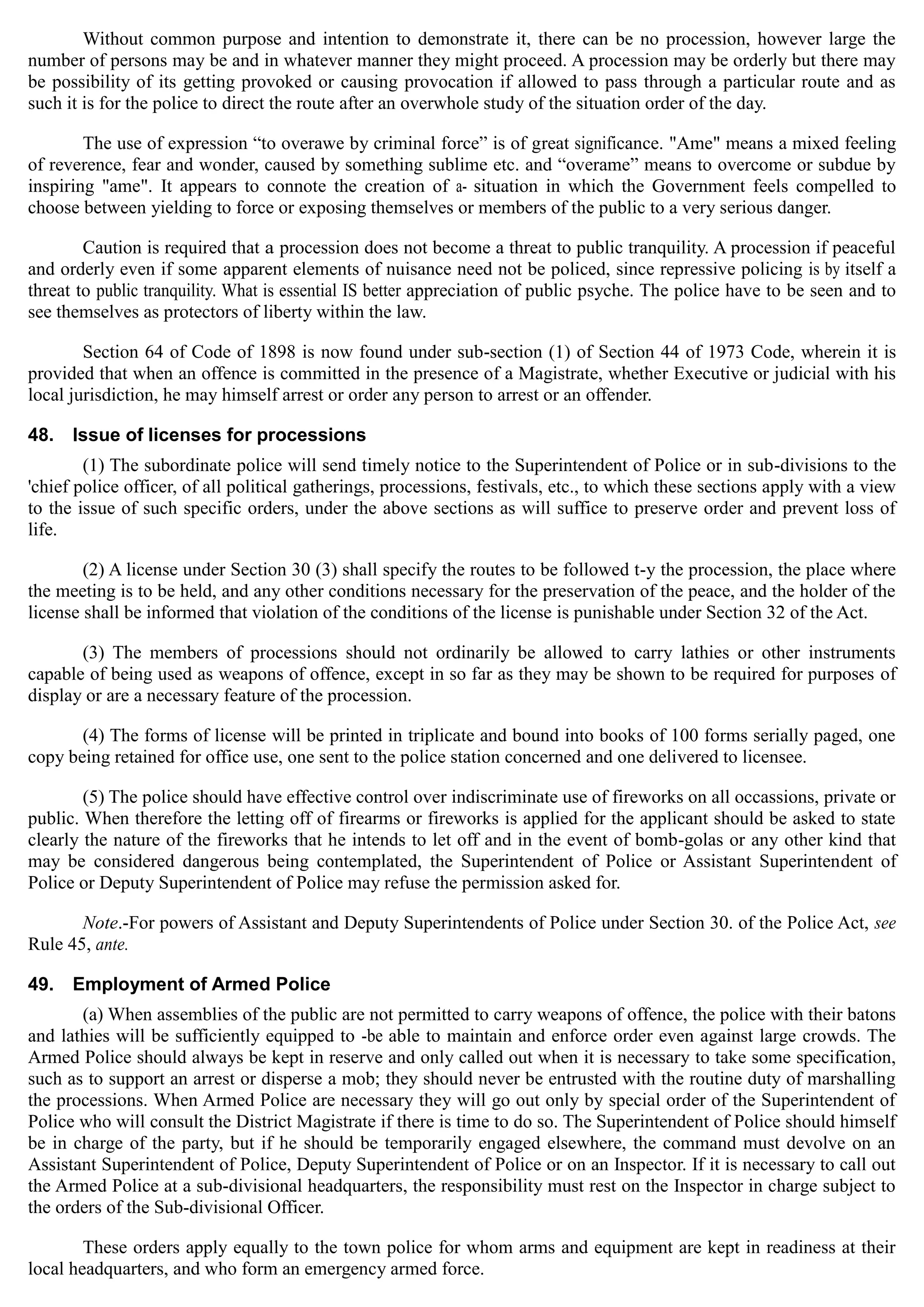
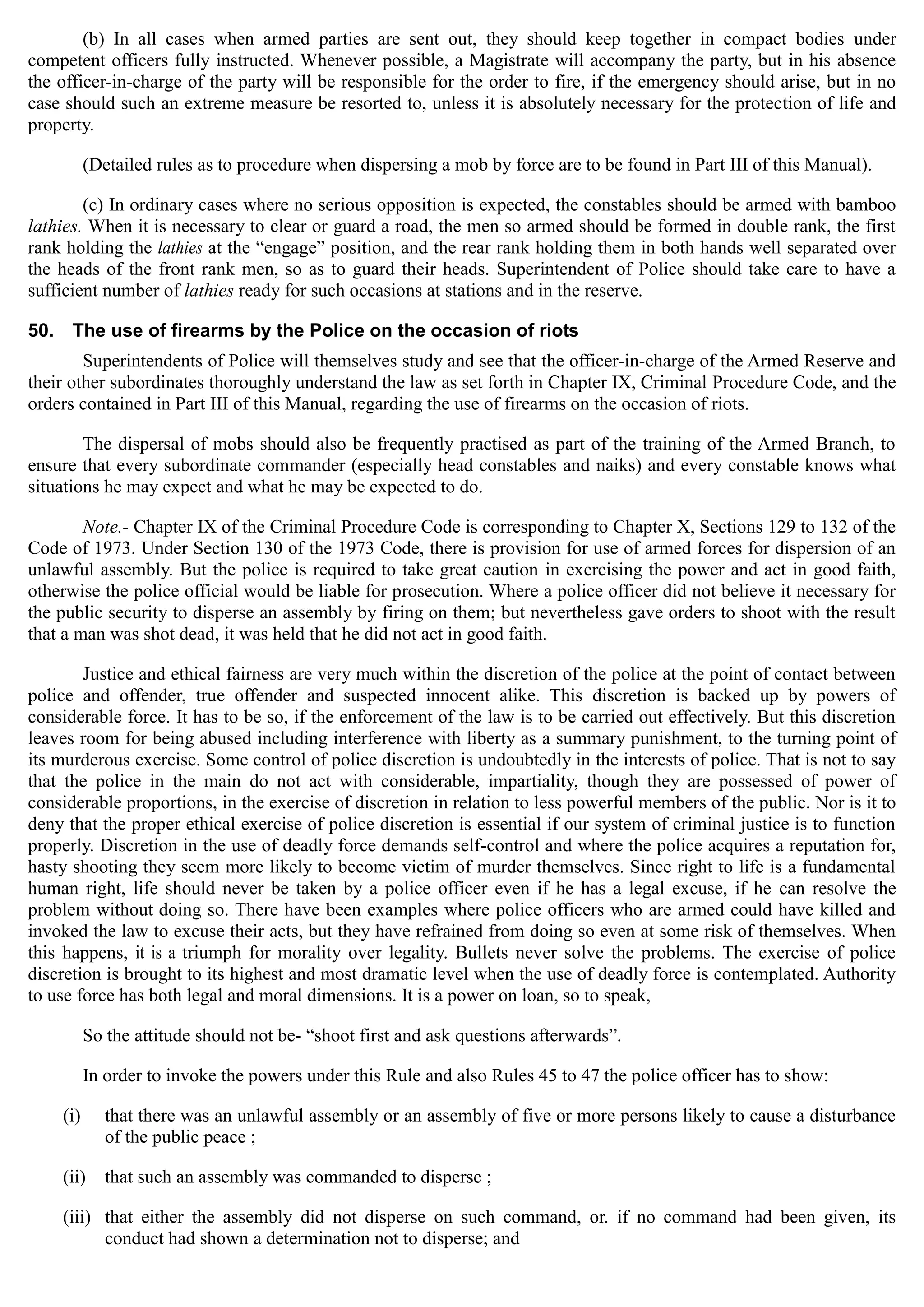
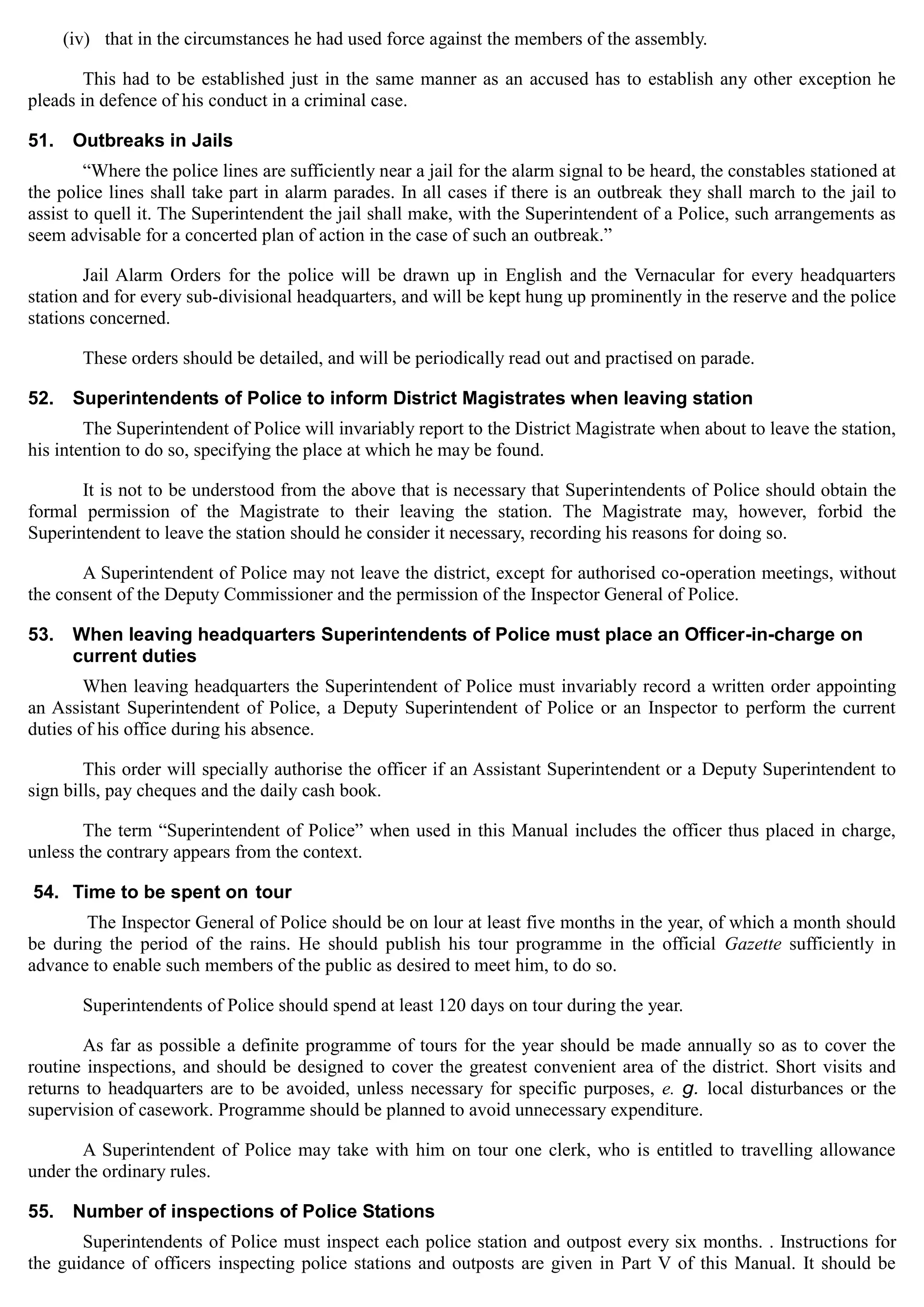
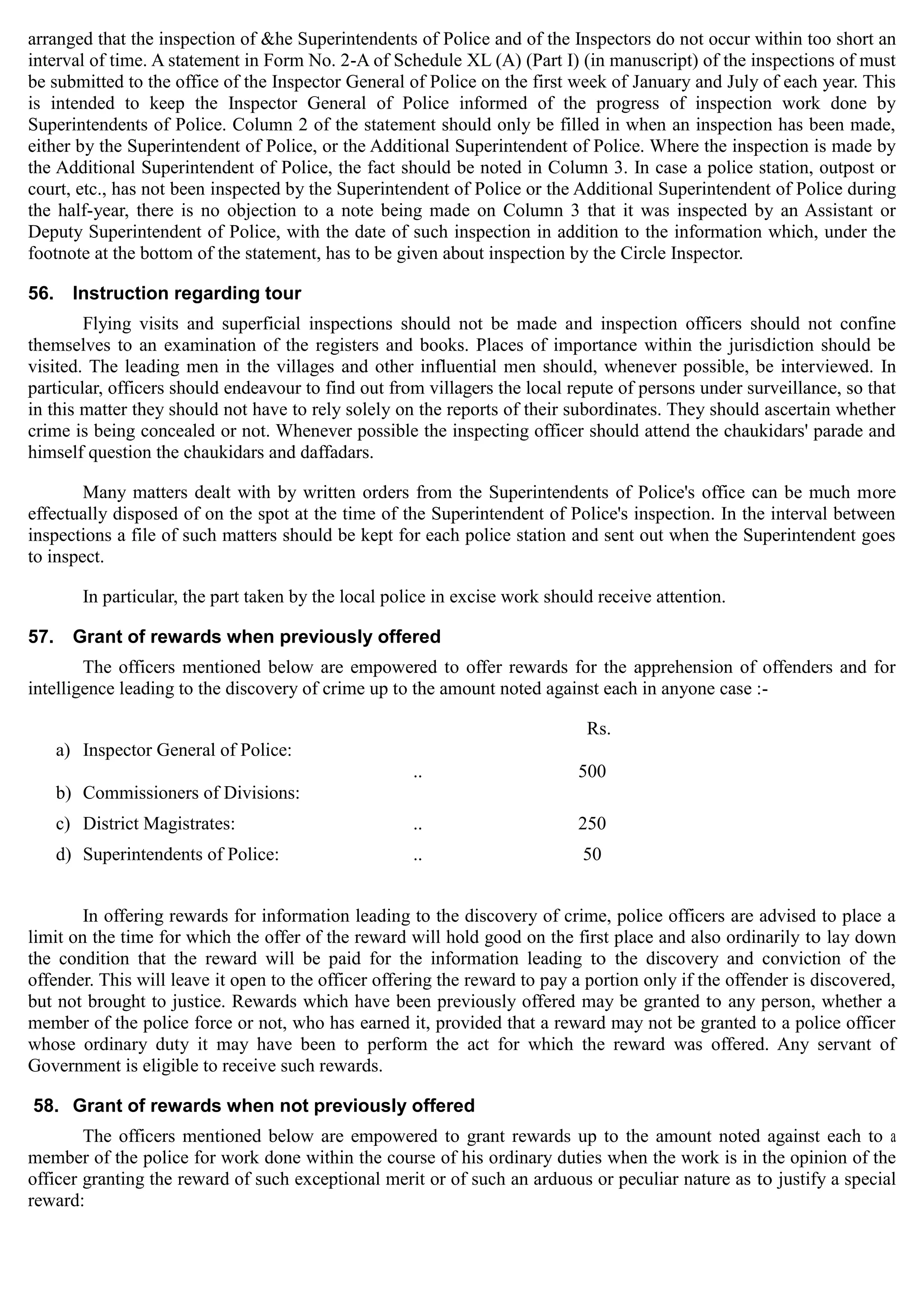

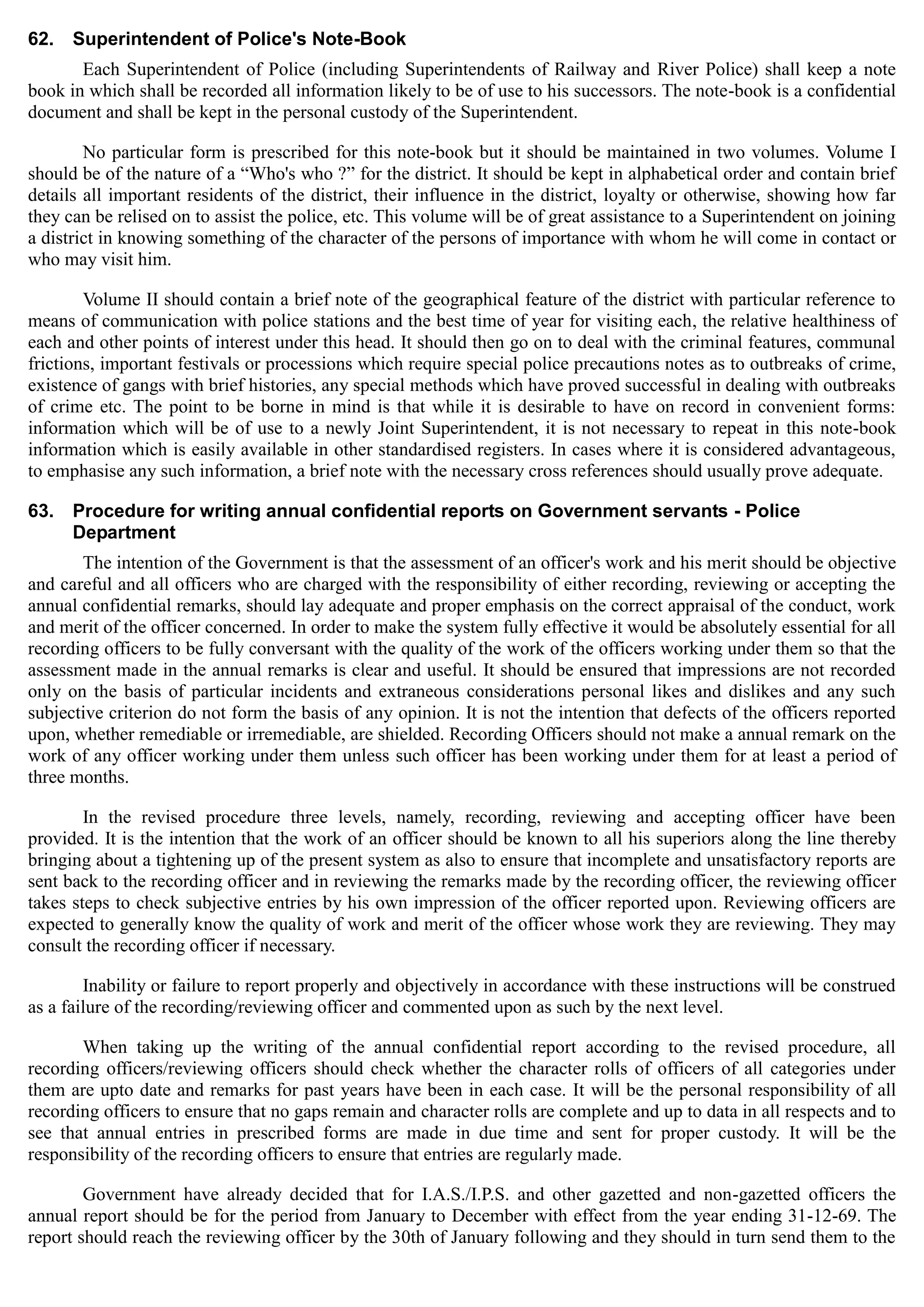
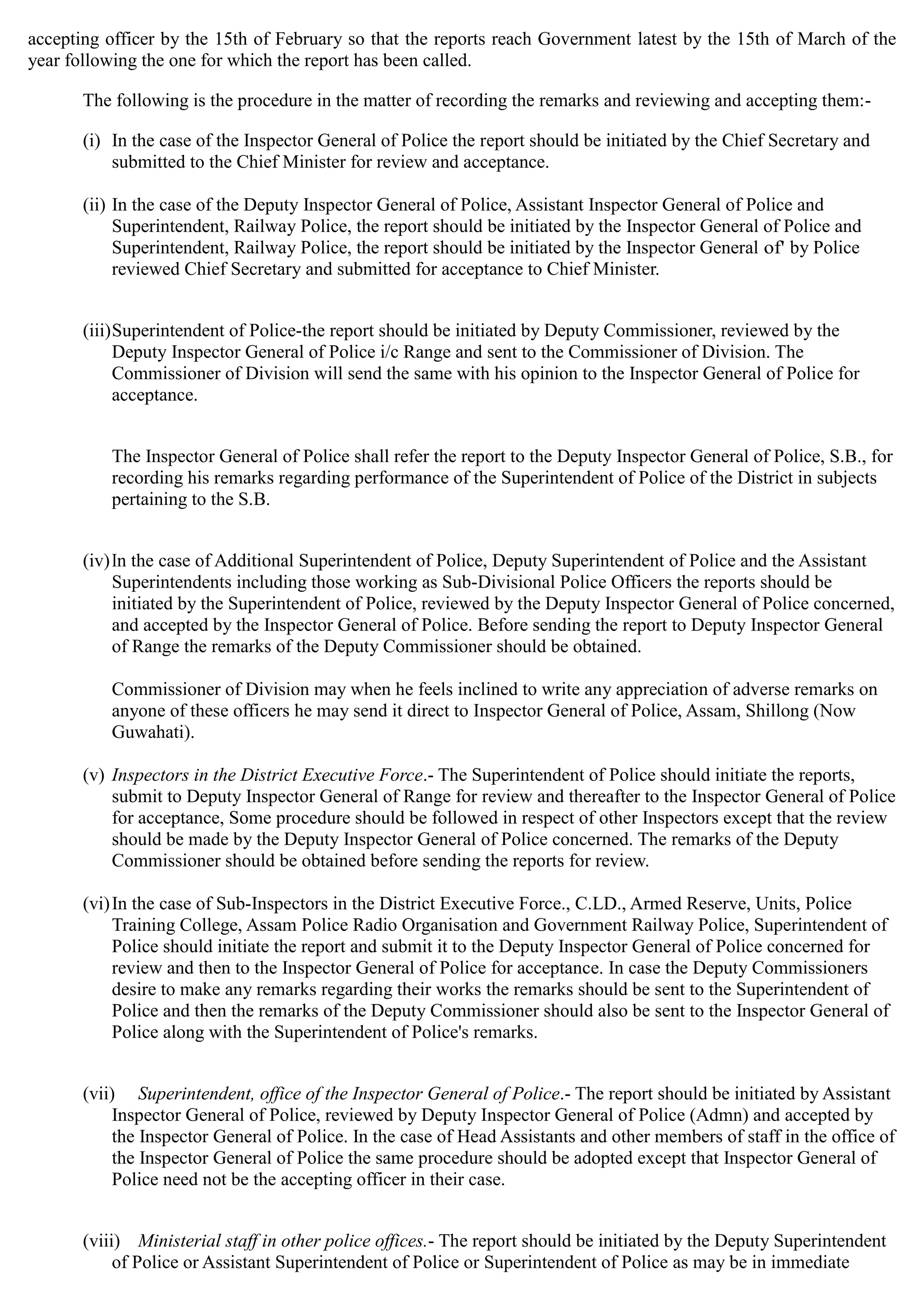
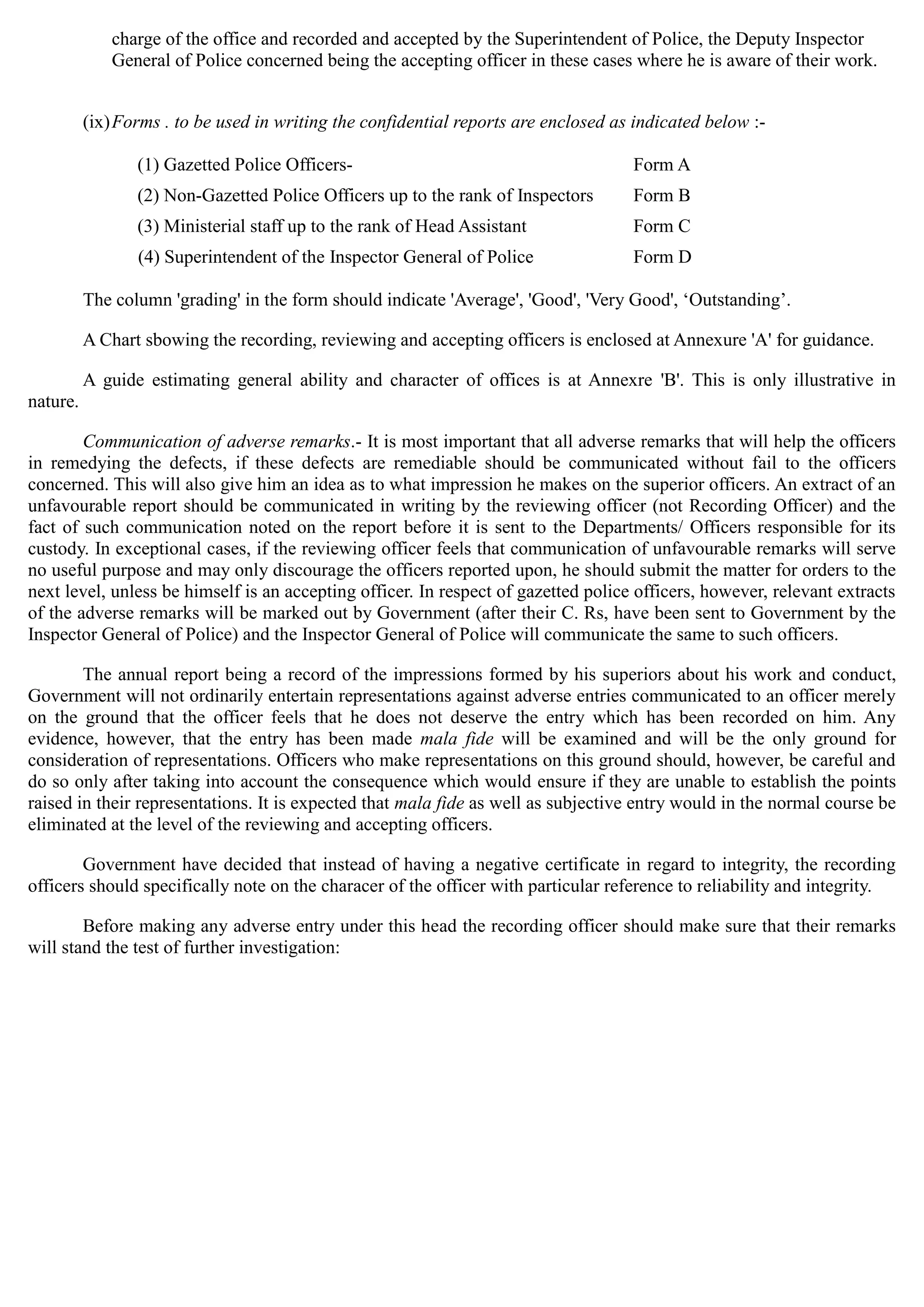
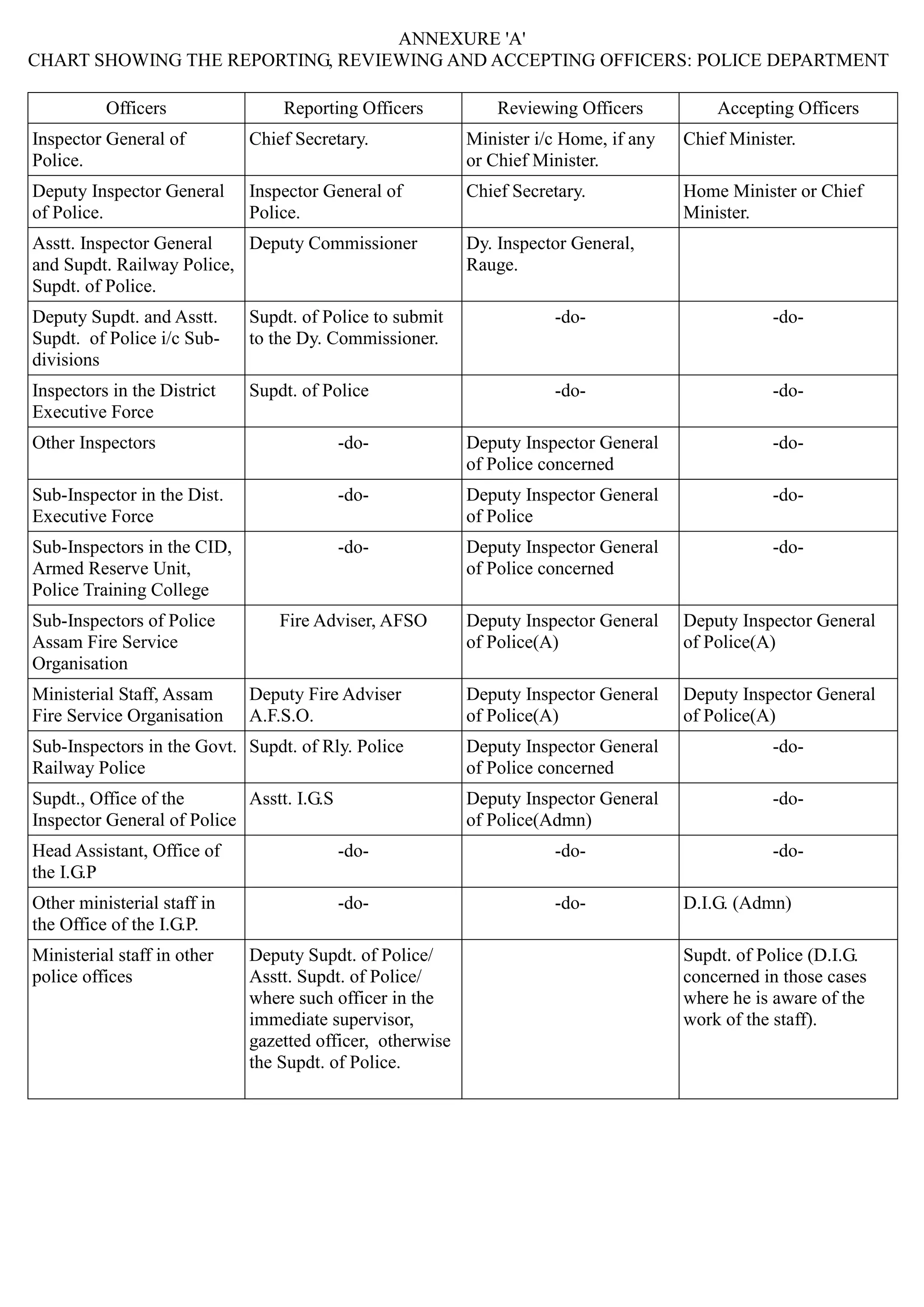


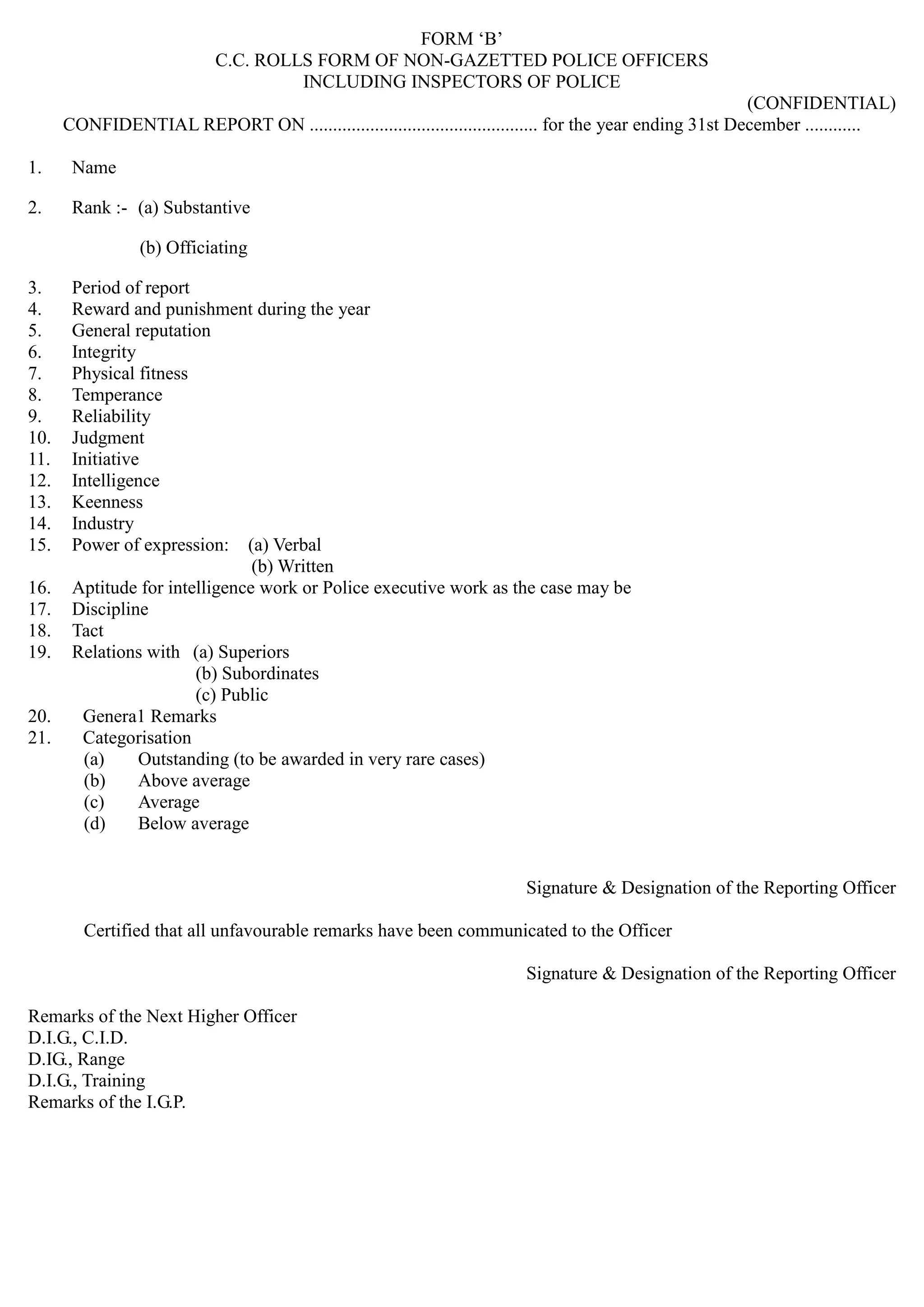
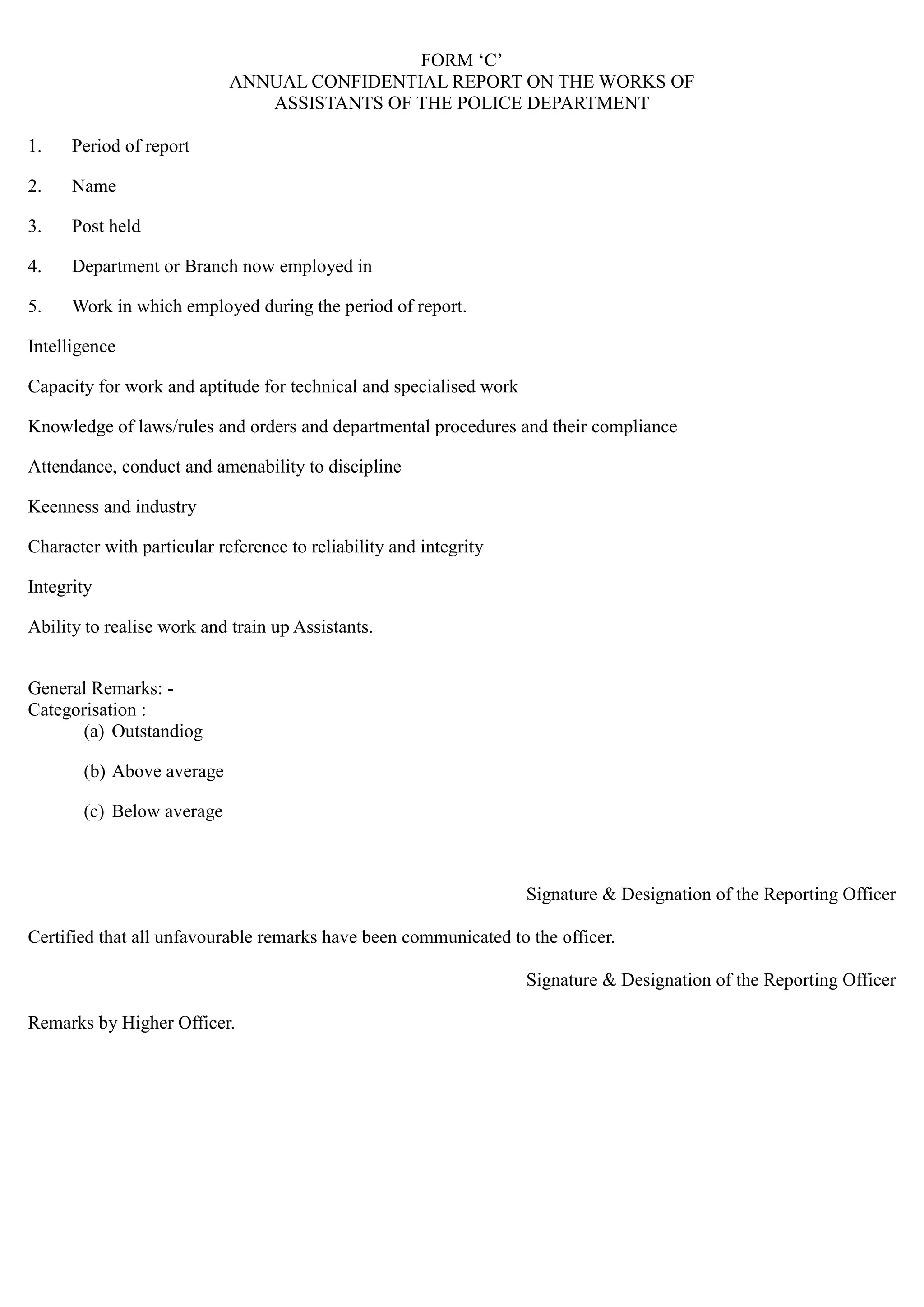
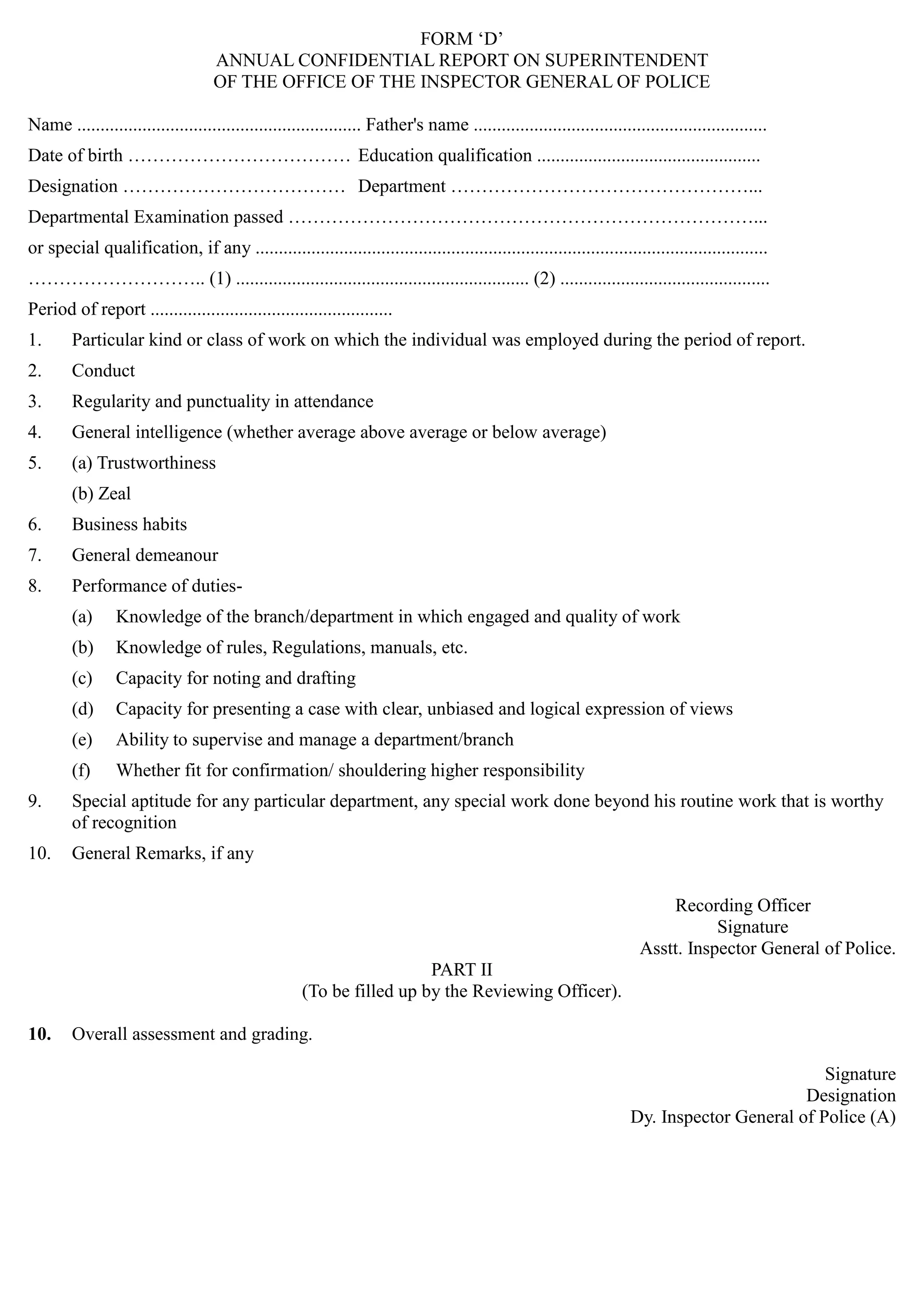
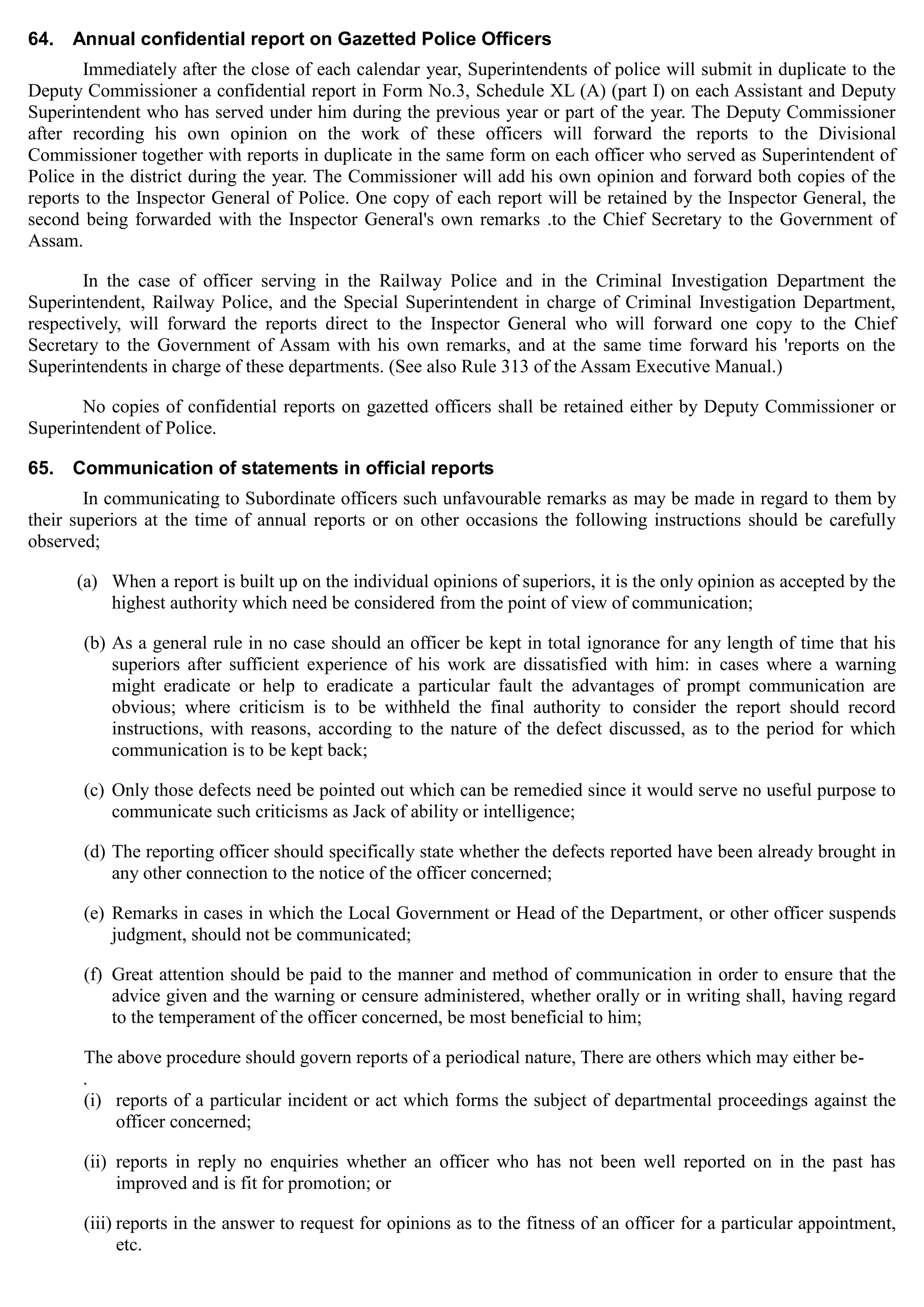
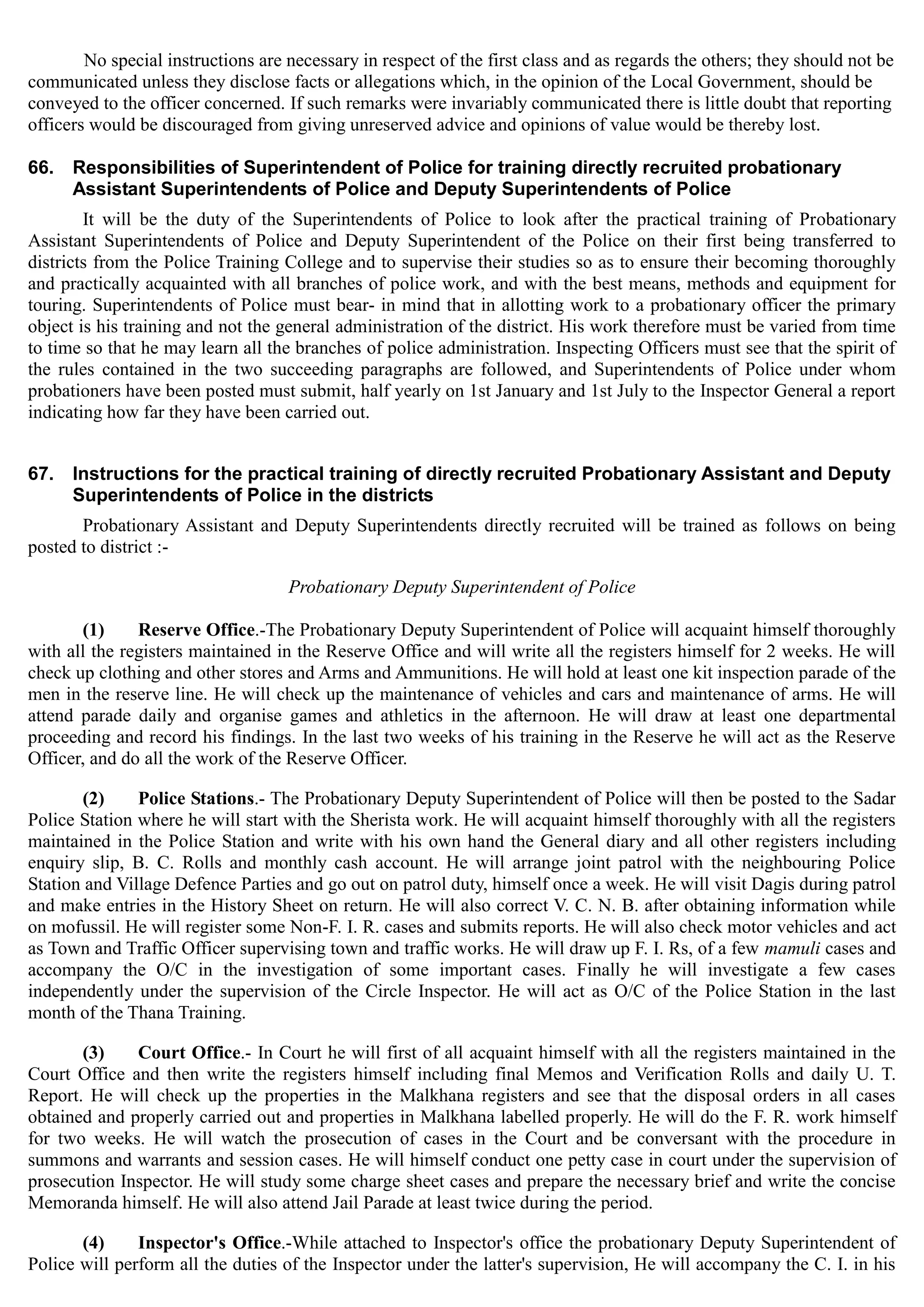
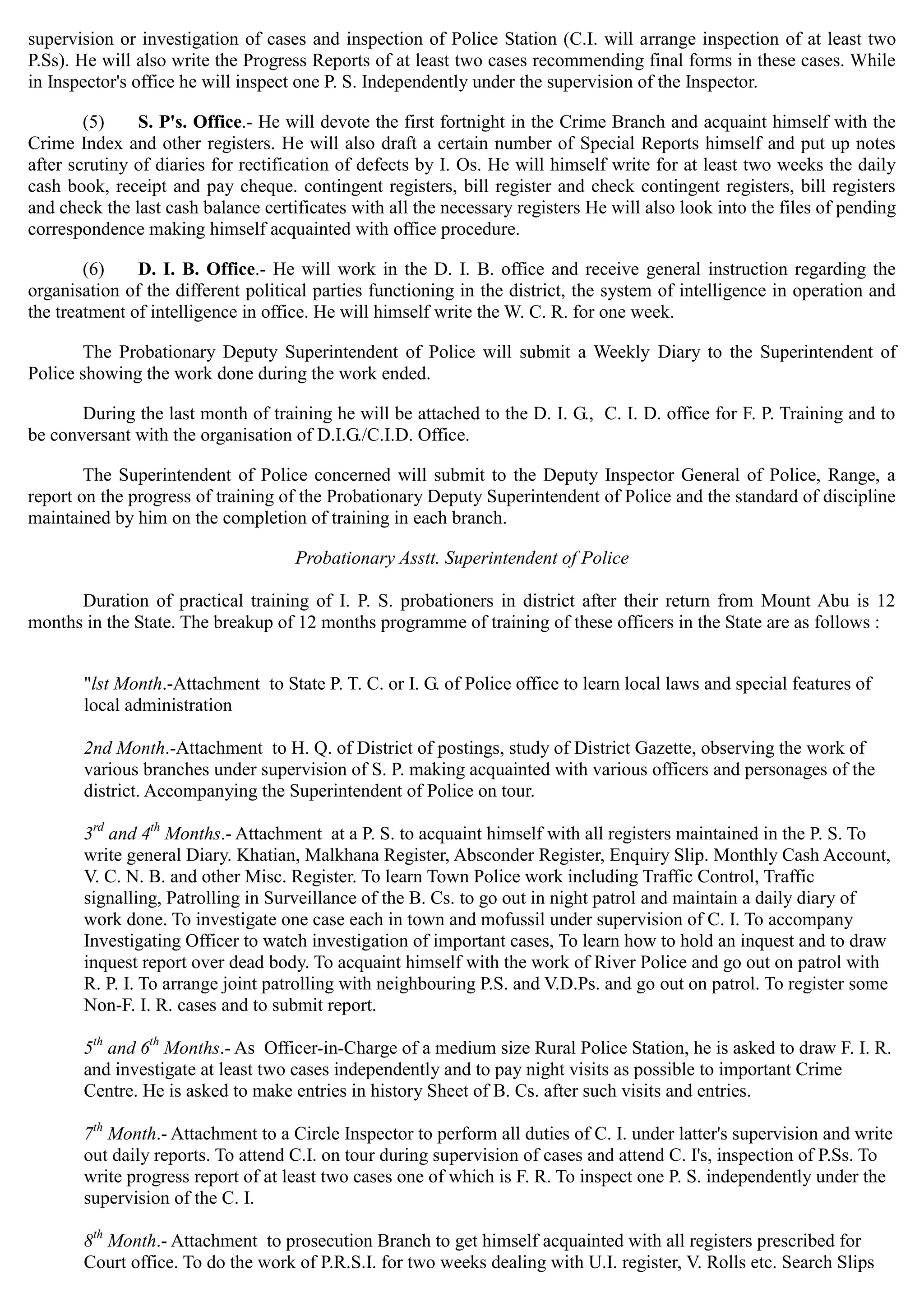
![and Record Slips. He is taught to write General Registers, Khatian and Malkhana Register and verify
disposal of property with relevant receipts etc. To issue final memos of cases disposed of. To study Charge
Sheet cases and prepare necessary brief and concise memoranda. To attend trial of cases for conversant with
the procedure of summons, warrant and session cases. To conduct petty cases under guidance of P. I. To
attend Jail parade and write up Jail Parade Form.
th th th
9 , 10 and 11 Months.- Attachment to District Police Office for 1½ months. To work in the Crime
Branch and to acquaint himself with Crime Index and other Registers. To draft certain number of Special
report. To write daily Cash Book, Receipt and pay cheque and last Cash Balance Certificate. To check the
Force pay and T. A. Bill and scrutinise A. Rolls.
To work in the D.I. B. Office and receive general instruction regarding organisation of different political
parties functioning in the District, the system of intelligence in operation and the treatment of intelligence, in
office. To compile a W. C. R. once with the reports of various officers. To acquaint with the work in the
Passport Section and study the rules, and regulations of Indo-Pak travel.
Reserve Office.- Attachment for 1½ - months to acquaint with all registers prescribed for use in Reserve
office. To write morning report Disposition Register, Casualty Register D. O. Book. To check up arms and
ammunition, clothing and other store register. To check vehicle Log Book, Drivers' Care diaries and
maintenance of Vehicle. To attend parade and organise games and athletics activities in the Reserve. To draw
up Departmental Proceedings and to record his findings.
12th
Month.- Attachment to miscellaneous officers to improve the probationers knowledge of development
programme.
68. Inspection by Probationary Assistant or Deputy Superintendent
(1) On the completion of training laid down in the foregoing rule the Probationary Assistant or directly-
recruited Deputy Superintendent of Police will inspect no less than two mufassil Police Stations, one Circle
Inspector's office one court office and supervise two important investigations.
(2) Superintendents will go through the inspection notes and supervision reports in the presence of the
Probationary Assistant or Deputy Superintendents concerned and point out all errors and omissions indicating in the
case of the inspection notes, the best methods of checking one register with another.
69. Investigation of serious cases by Assistant Superintendents of Police
Every Assistant Superintendent of Police unless specially exempted by the Inspector General of Police is
required every year to investigate personally, with the Assistance of an Inspector or Sub-Inspector, at least six
important cases preparing and signing all the diaries and documents pertaining to those cases, and generally seeing
them to completion in all their stages, including the proceedings in the courts.
The number of such investigations made and the results obtained should be noted by the Superintendents of
Police with their remarks on the work done, in the annual reports.
70. Departmental Examination
The detailed rules regarding the departmental examination of Probationary Assistant Superintendents of
Police and Probationary Deputy Superintendents or Police will be found in the Rules for the conduct of
departmental examinations published under the Assam Government Notifications No. 133 G. J., dated the 5th
January, 1934 and No. 2906 A. P., dated the 23rd March, 1936.
The main principles are that Assistant and Deputy Superintendents must pass in:
(a) Law [with and without books, and lower standard in one language (i.e., Assamese or Bengali) and in
colloquial Hindustani] within two years of appointment.
Probationary Assistant and Deputy Superintendents of Police directly recruited must pass in accounts in the
books prescribed by the Government of Assam while under training at the Assam Police Training College and
promoted Deputy Superintendents must pass in accounts within two years of promotion in prospective or
substantive vacancies as the case may be, under penalty of stoppage of increment.](https://image.slidesharecdn.com/assampolicemanualpart1-210925043445/75/Assam-police-manual-part-1-42-2048.jpg)
![(b) They must also pass in one language by the higher standard within three years, and European and
Anglo-Indian Officers must further pass the remaining language by the higher standard within four years
of appointment, in both cases under penalty of stoppage of increment. Until an officer has passed
completely in accordance with this rule, he will not be considered eligible for promotion either
officiating or substantive, to the rank of Superintendent of Police, unless the Local Government find
reasons for relaxing this condition in any special circumstances. (For rules regarding the examination of
non-Gazetted Officers, see Part III).
(c) No Assistant Superintendent of Police or Deputy Superintendent of Police will be considered eligible
for confirmation until he has passed the prescribed departmental examination.
(d) The seniority of Deputy Superintendents of Police shall be regulated by the date of their confirmation in
the Assam Police Service. Officers who are confirmed will ordinarily be placed above any of their
seniors who may not be found qualified for confirmation, but Deputy Superintendents of Police who
have lost places owing to delay in confirmation will be restored to their original position when they
qualify for confirmation.
NOTES
(i) A probationary Assistant Superintendent of Police will not be eligible for the second increment of pay
until he has passed the departmental examinations prescribed in Rule 6 (a) of the Rules for the Conduct
of Departmental Examination of Police Officers.
(ii) An Assistant Superintendent of Police will not be eligible for the third increment of pay until he has
passed in one language by the higher standard and if required to pass also in the second language by the
higher standard, he will not be eligible for the fourth increment until he has done so. [This amendment
has come into effect from the 15th March, 1932].
(iii) Assistant Superintendents of Police who pass their examinations regularly within the period prescribed
in Rule 6 (a) and (b) of the rules for the conduct of departmental examinations of Police Officers, will
nd rd th
be allowed to draw their 2 , 3 , or 4 increment of pay from the usual date of increment on the
publication of the results of the departmental examinations.
[Authority: Assam Government Letter No. C. P. 1650/6698. G. J., dated the 29th
December, 1936].
71. Assistant Superintendents of Police and Deputy Superintendents of Police of over six
months' service require to attend Departmental Examinations
All probationary Assistant Superintendents of Police and Deputy Superintendents of Police who have been
more than six months on duty must attend the half-yearly departmental examinations and will be examined in one or
more subjects until they have passed completely.
Those who have been on duty less than six months may, at their option attend the examination.
An officer is permitted to draw travelling allowance for journeys to and from the departmental examinations
twice for any particular examination or standard of examination. Halting allowance during the period of the examin
ation is not admissible, and any officer who appears to have neglected to prepare himself may have his travelling
allowance disallowed see also Rule 129 of the Assam Subsidiary Rules.
72. Departmental Examination and Leave
No application for leave from any officer liable to examination, will ordinarily be entertained if the
following half-yearly examination falls due before expiry of the leave applied for unless application specifies that
the applicant will attend the examination.](https://image.slidesharecdn.com/assampolicemanualpart1-210925043445/75/Assam-police-manual-part-1-43-2048.jpg)
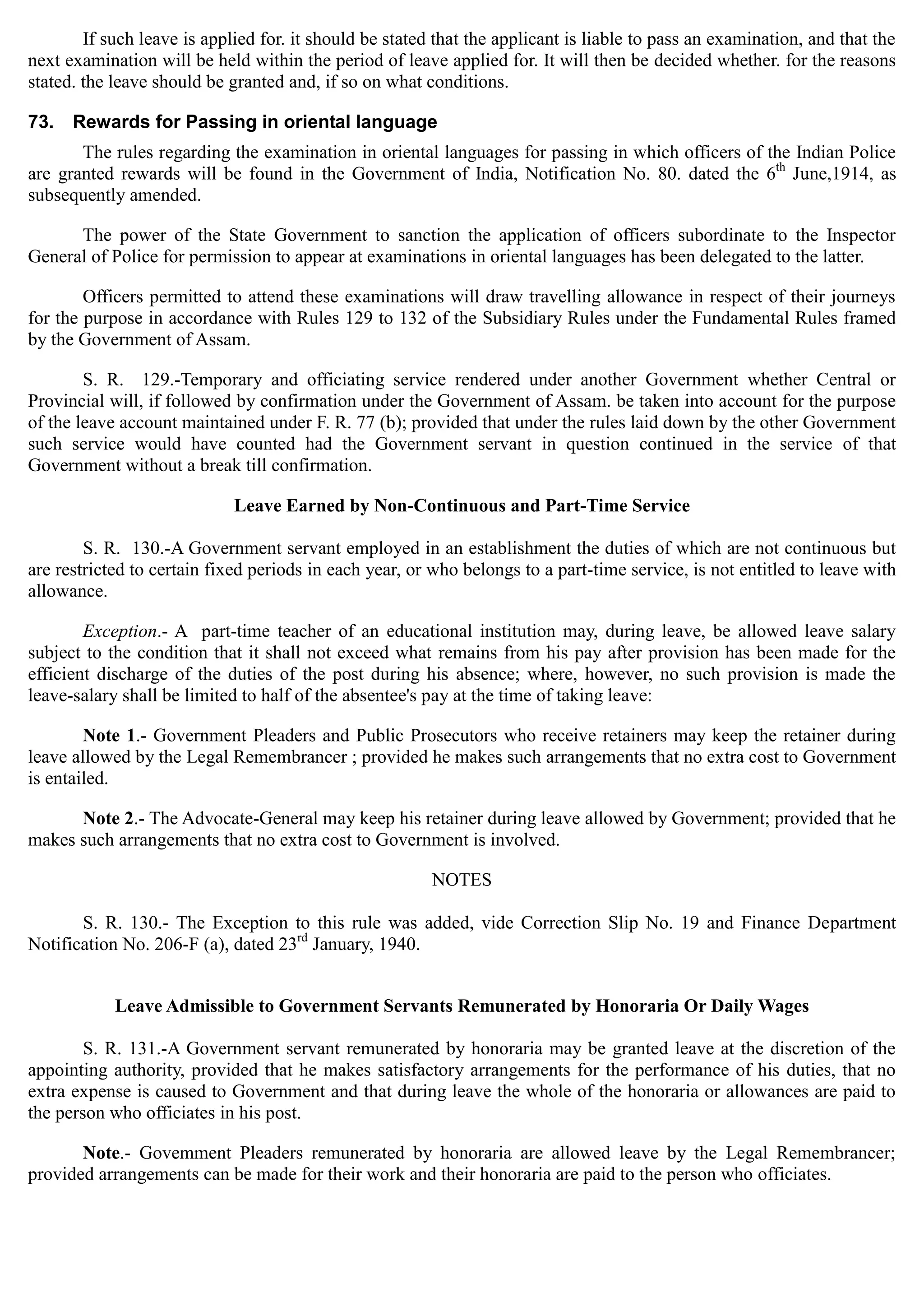
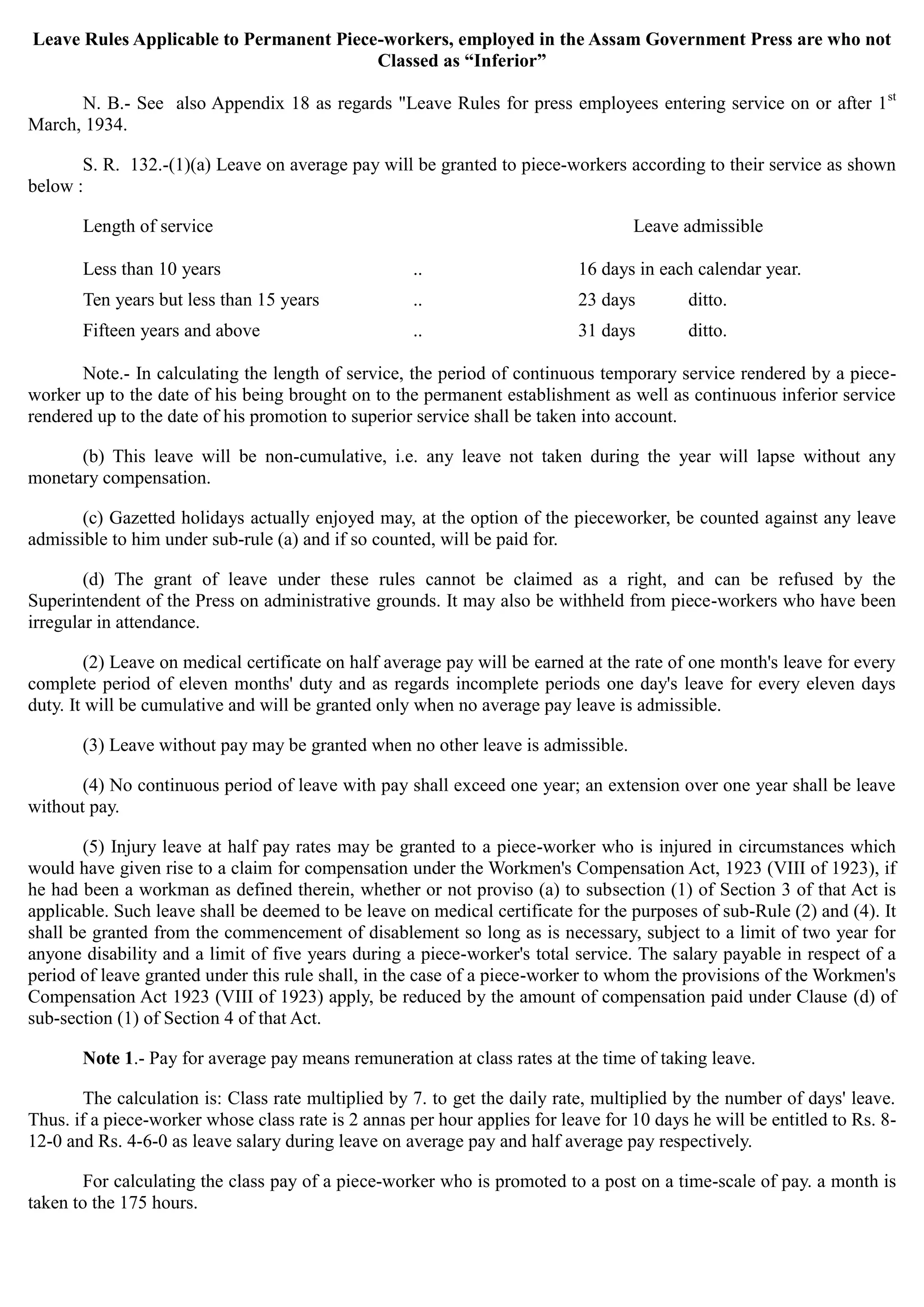

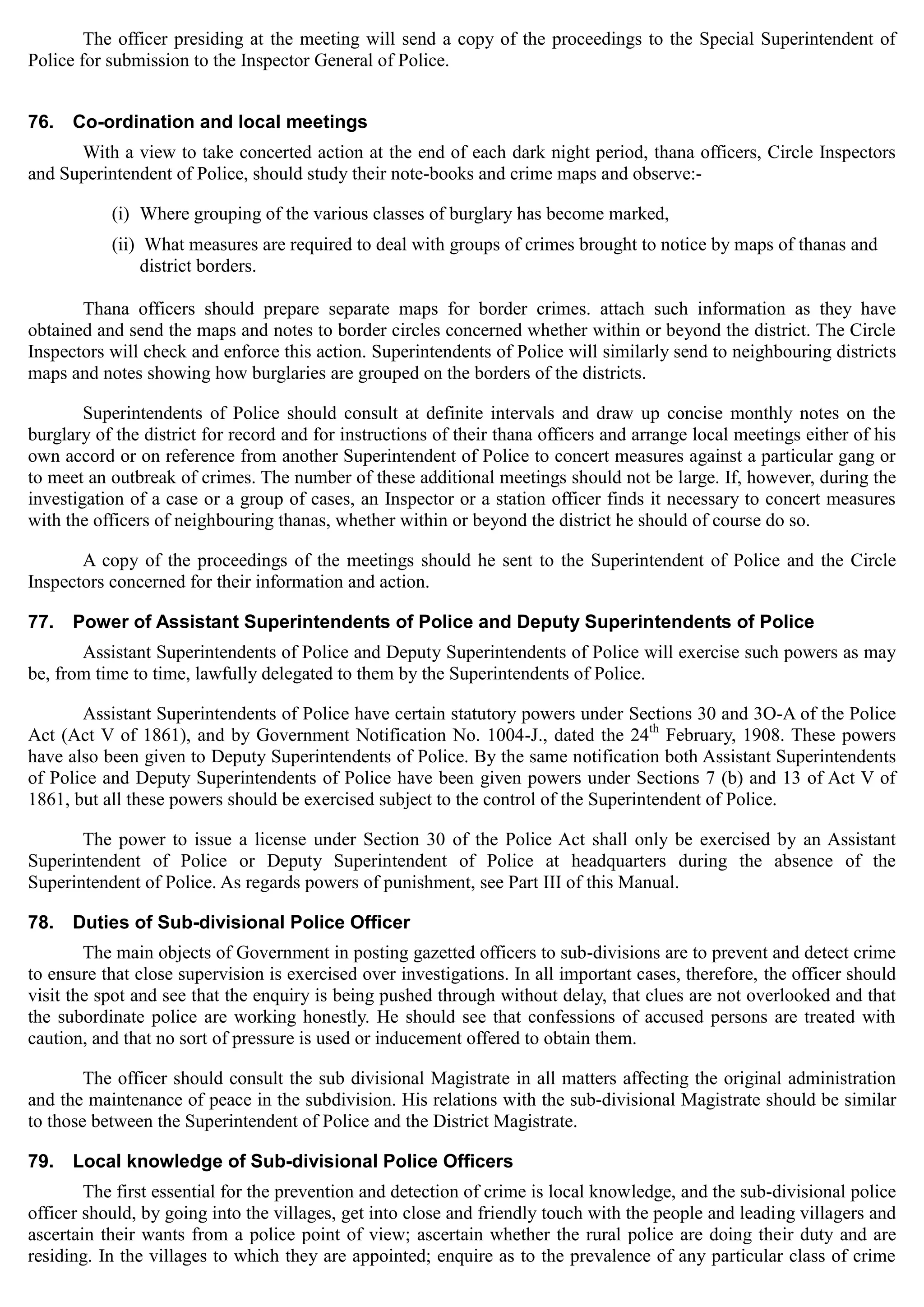
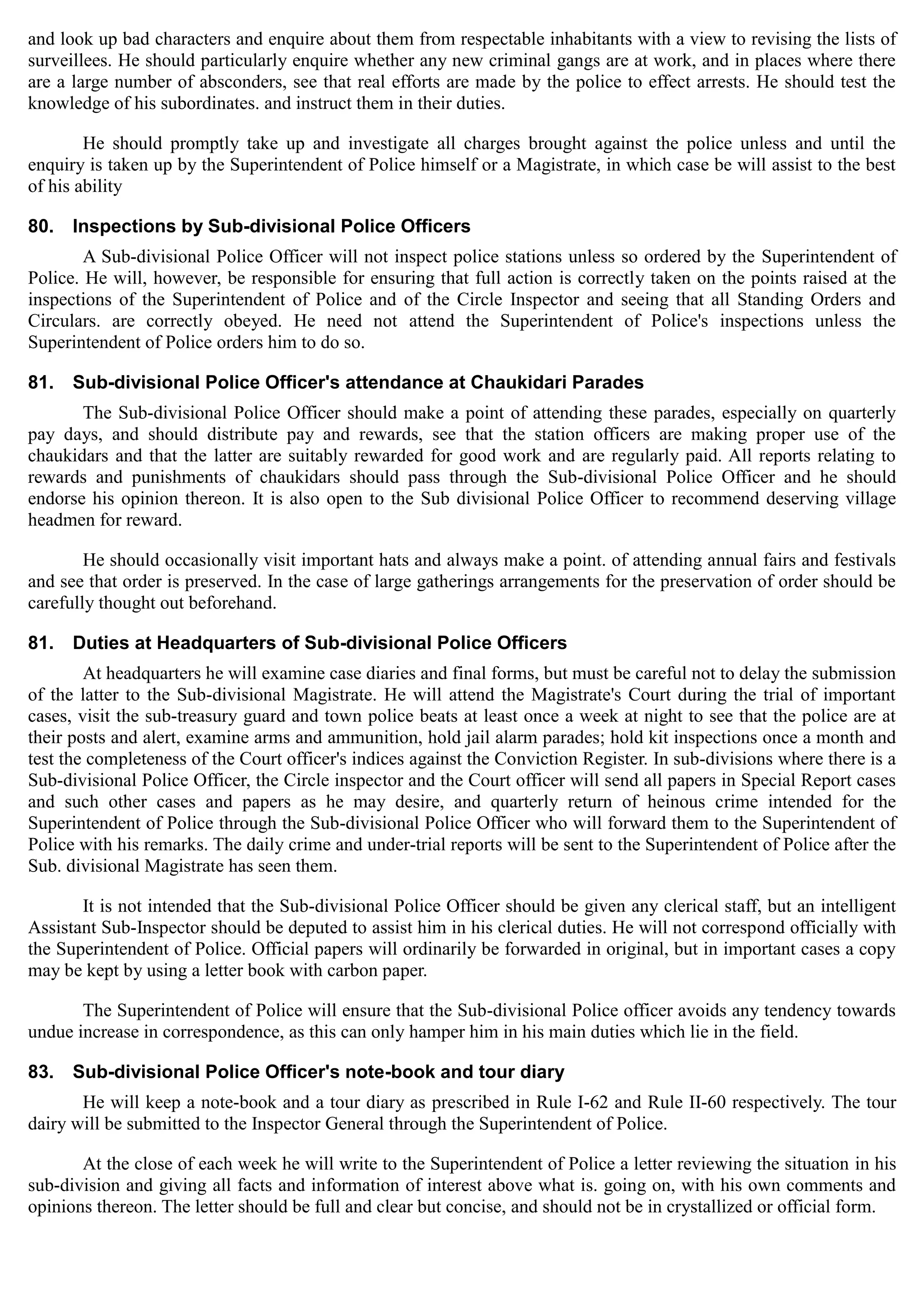
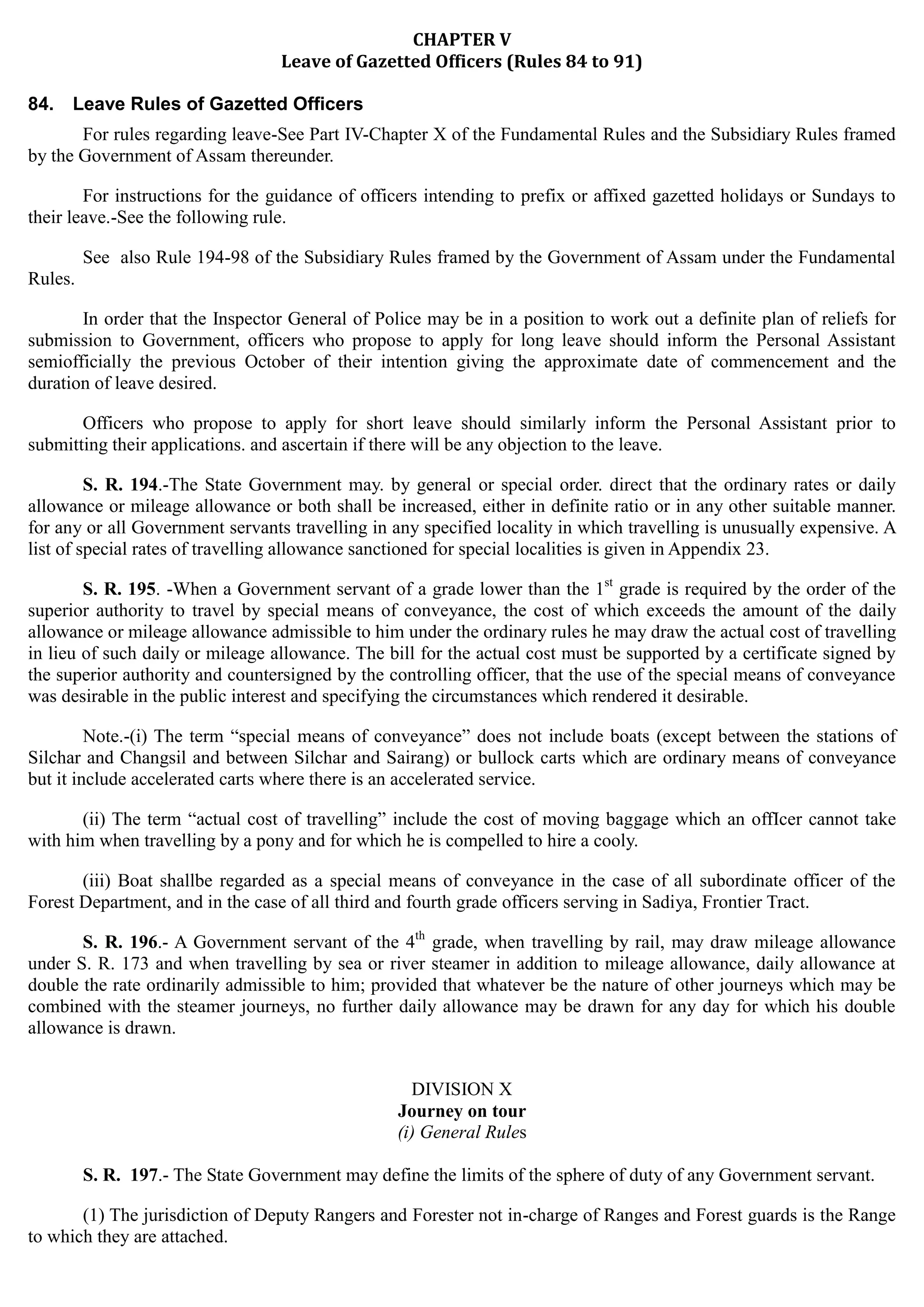
![_____
(2) The ordinary jurisdiction of a Circle Inspector of Police (except Reserve or Court Inspector) is the Circle
in which he is employed. The jurisdiction of Reserve and Court Inspectors and Court Sub-Inspectors, Court
Assistants Sub-Inspectors and Constables is their headquarters station. The jurisdiction of Reserve Head Constables
and Constables and also of Inspectors, Sub-Inspectors and Havildars of the Armed Branch is their headquarters
station. The jurisdiction of Sub-Inspectors, Assistant Sub-Inspectors, Head Constables and the Constables of the
Unarmed Branch is the Police Station to which they are attached. The jurisdiction of the Sub-Inspectors, Assistant
Sub-Inspectors and Constables and of the Circle Inspector's headquarters staff is their headquarters of Police
Station. The jurisdiction of the Sub-Inspectors, Head Constables and Constables of Town Police is the municipal
limit of the town to which they are posted.
(3) The sphere of duty of all records during re-settlement operations is the circle in which they work and
then travelling allowance will be governed by S. R. 202.
(4) The sphere of duty of all personnel of the Government Railway Police is the whole of Government
Railway Police District.
NOTES
S. R. 197.-Sub-rule (2) was substituted vide Correction Slip No. 531 to A.S .R. (HPL 377/76).
S. R. 198.- A Government servant, is on tour when absent on duty from his headquarters either within or
with proper sanction, beyond his sphere of duty.
Note 1.-Government servants attending meeting of tile Court of Executive Council of the Gauhati University
and those, who, though not member of the Board of Agriculture, attend the meetings at Pusa as visitors, are on duty
and will draw travelling allowance accordingly.
Note 2.- The Principal of a Government College or a professor authorised by him in that behalf who attends
the annual convocation of the Gauhati University in order to identify the graduates from his college is on duty and
will draw travelling allowance accordingly.
Note 3.- Civil Surgeons appointed to conduct the examination held by the Assam Medical Examination
Board are on duty and will draw travelling allowance accordingly.
Note 4.- Officers of the Assam Educational Service appointed as outside Examiner in connection with
examinations held by the Assam Medical Examination Board at Dibrugarh are on duty and will draw travelling
allowance accordingly.
Note 5.- Educational Officers who are required to perform journeys on scouting work are on duty and will
be allowed by. competent authority to draw travelling allowance accordingly.
NOTES
S. R. 198.- In Note 2 the words “Gauhati University” were substituted vide C. S. No. 455 to A.S.R., to take
effect from 1st
January, 1948.
Notes 4 and 5 were inserted respectively vide Correction Slip No. 29 to A.S.R. [Reference I.S.G. Department
File No. Medical 996/40] and C.S. No. 151 [Notification No. FA 42/42/11/49, dated 23rd
September, 1942].
85. Requests for casual leave of Gazetted Officers
Superintendents of Police, Assistant Superintendents of' Police and Deputy Superintendents of Police should
forward requests for casual leave through the Deputy Commissioner. Should the Magistrate record an objection to
the grant of leave, the leave applied for cannot be granted. If the leave be granted it will still be necessary for the
police officer to take the Magistrate's orders before leaving the district. The Magistrate should invariably inform the
Commissioner when he consents to the grant of casual leave to Superintendents of Police.
Superintendents of Police, Assistant Superintendents of Police and Deputy Superintendents of Police before
taking casual leave should notify to the district officer their addresses during the period of such leave.](https://image.slidesharecdn.com/assampolicemanualpart1-210925043445/75/Assam-police-manual-part-1-50-2048.jpg)
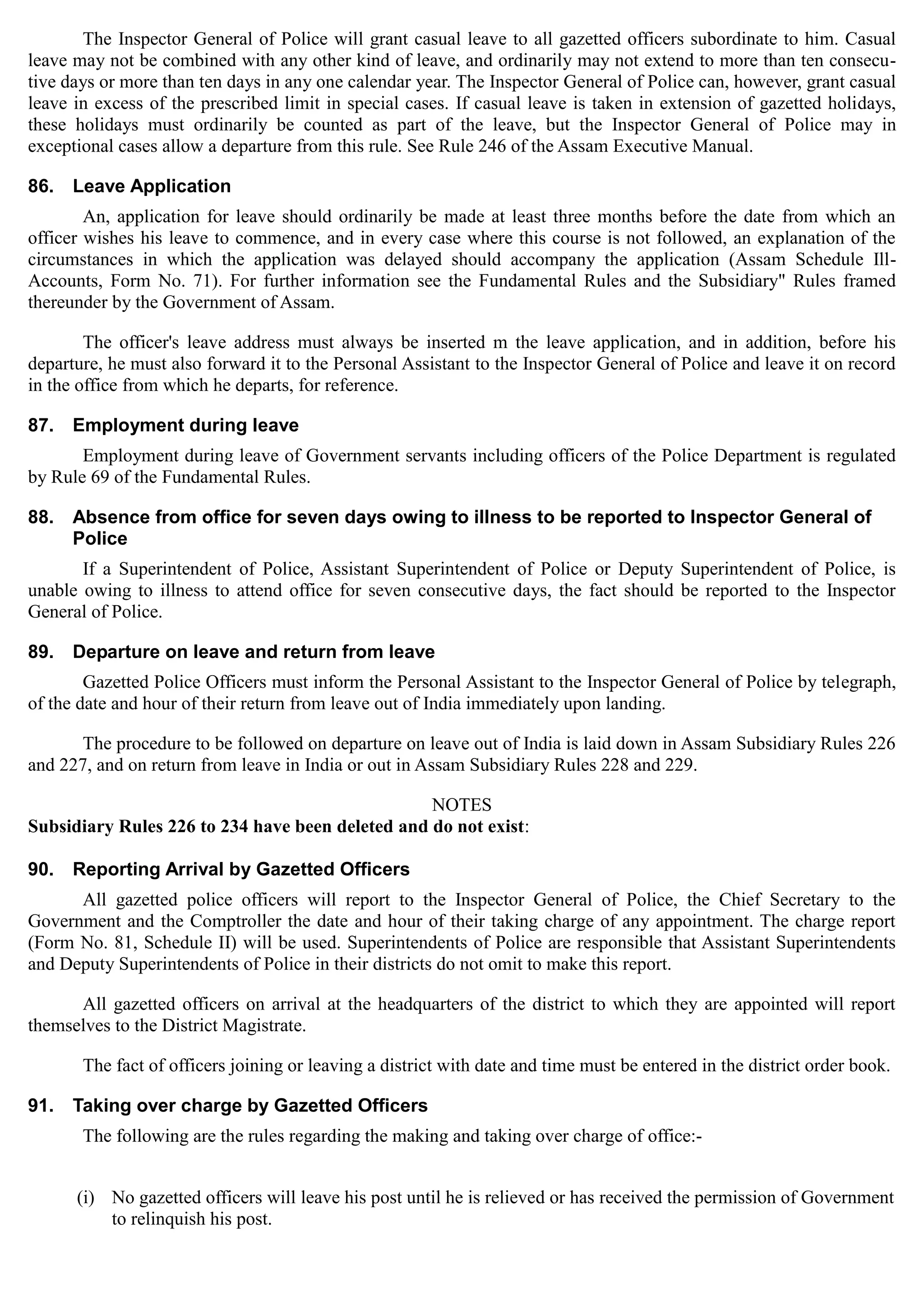
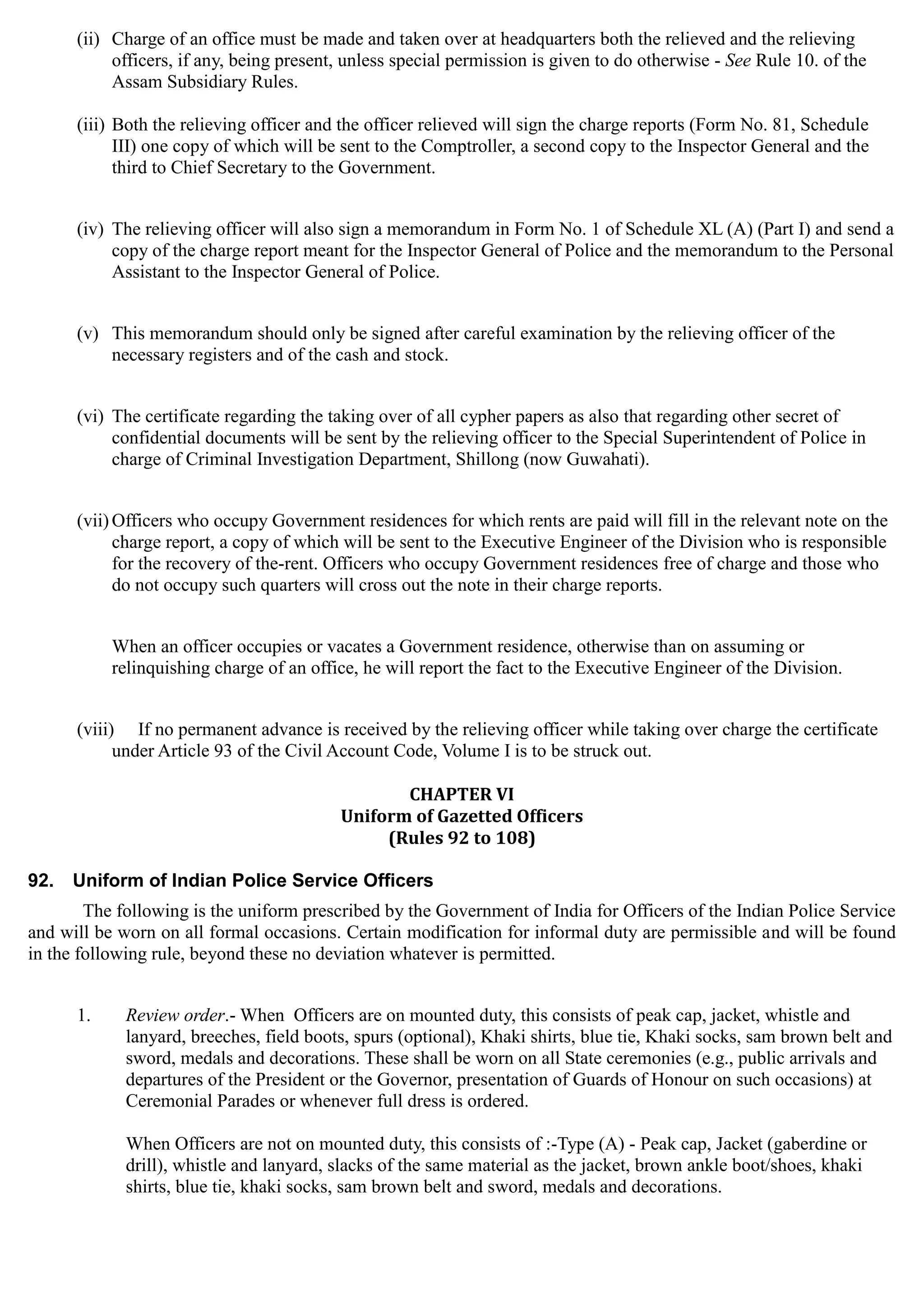
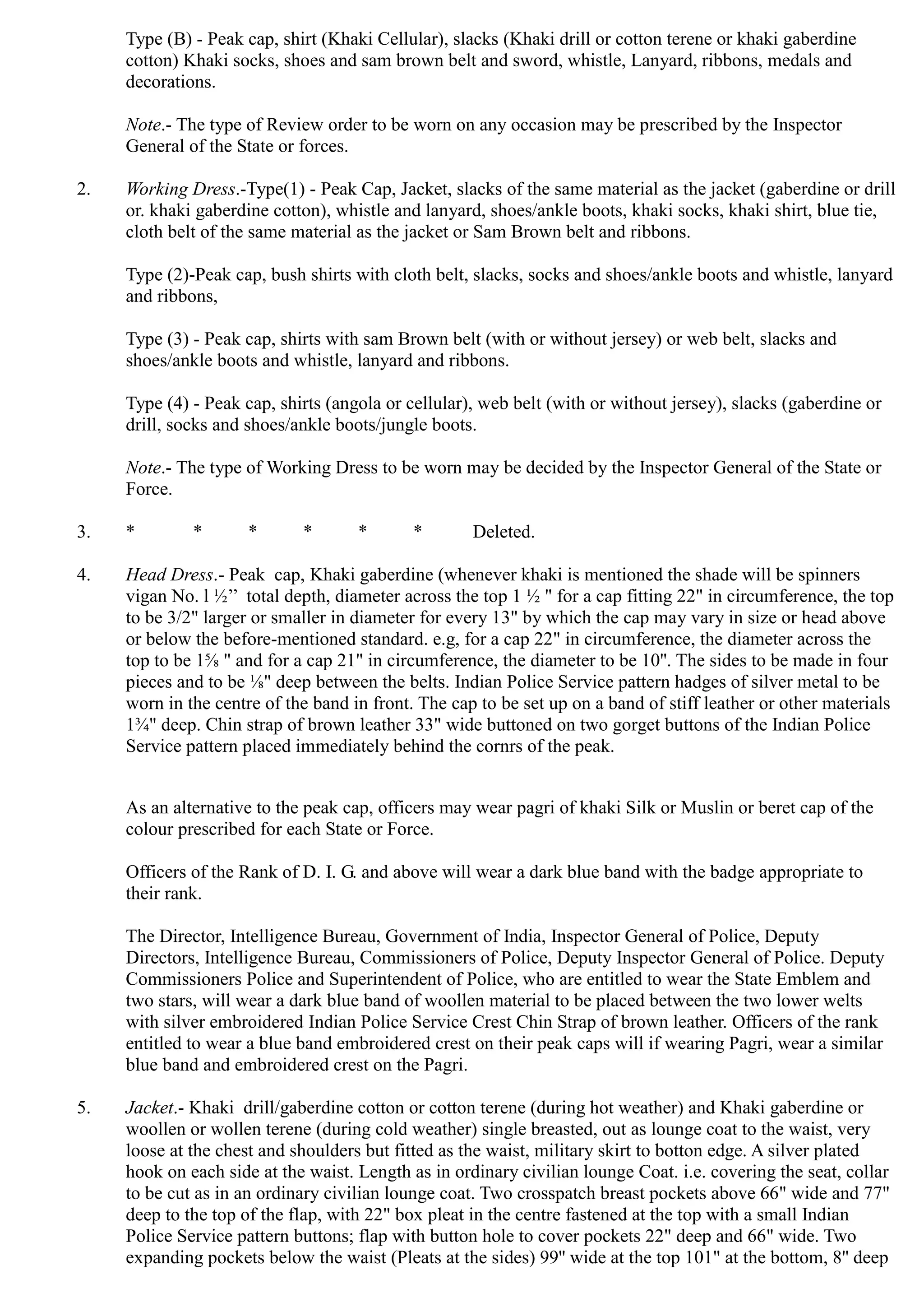
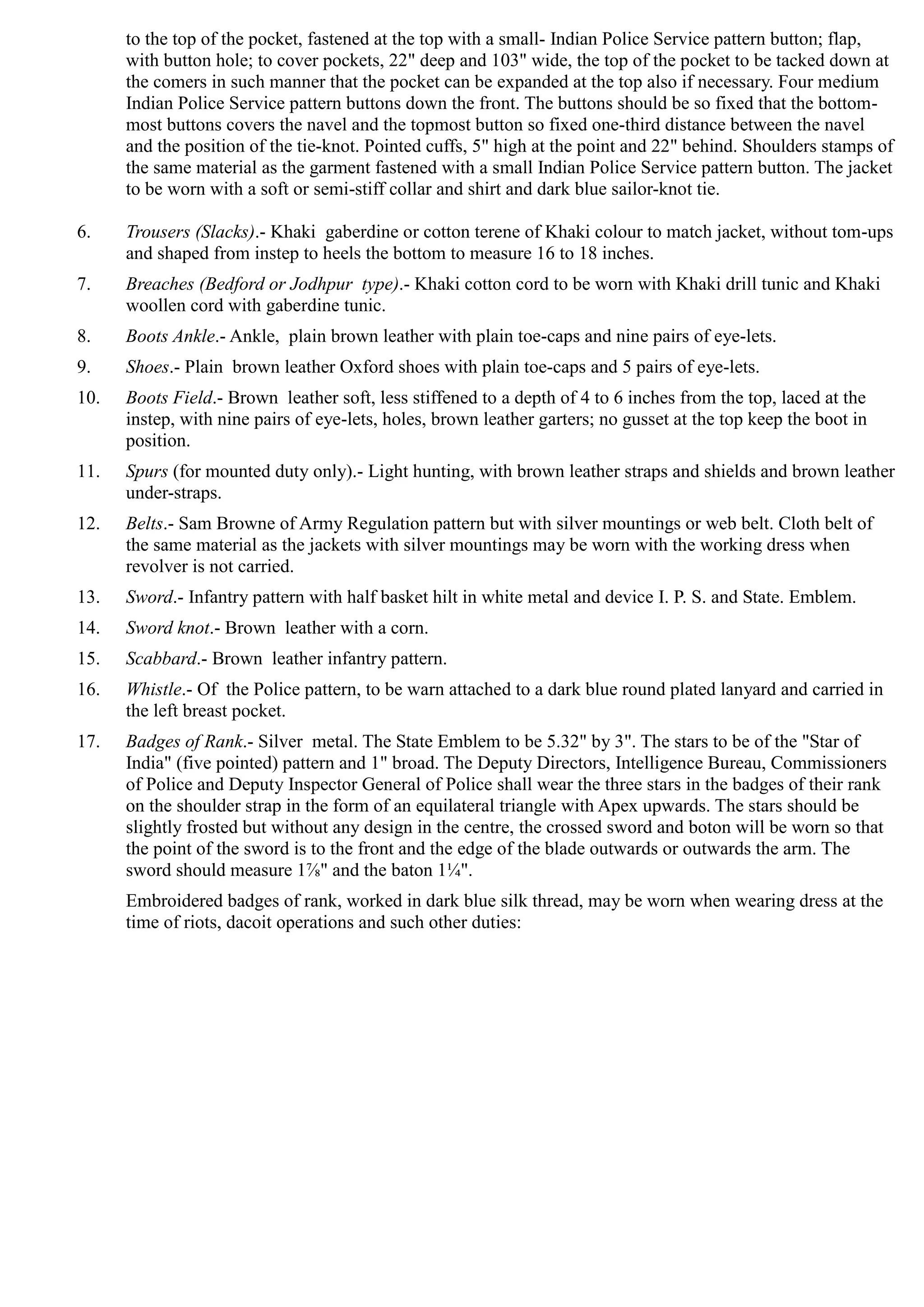
![(a) Director, Intelligence Bureau
(b) (i) Director, Central Bureau of Investigation
(ii) Director General, Central Reserve
Police.
(iii) Director General, Border Security Force.
(iv) Director General, Security.
(c) (i) Inspector General of Police.
(ii) Additional Inspector General of Police.
(iii) Joint Director, Intelligence Bureau.
(iv) Additional Director/Joint Director,
Central Bureau of Investigation.
(v) Commandant, Central Forensic Institute.
(iv) Director, National Police Academy.
(v) Inspector General, Border Security
Force/Central Industrial Security
Force/Central Reserve Police.
(vi) Special Inspector General Indo-Tibetan
Border Police.
(d) All other officer drawing pay above the time
scale including Selection Grade
(e) (i) Superintendent of Police in the Selection
Grade.
(ii) All Officers drawing pay in the senior
time-scale who have put in 15 years'
service and above,
(f) (i) District Superintendent of Police.
(ii) Commandant of a Battalion.
(iii) All officers drawing pay in the senior
time-scale who have more than 10 years
Service and less than 15 years Service.
(g) All officers [Other than those mentioned in (f)
& (i) (ii) above] drawing pay in the senior
time-scale who have 10 years service and less.
(h) Assistant Superintendents of police Incharge
of a Sub-division or holding any post certified
to be of equivalent status or who have 5 years
Service and above.
(i) Assistant Superintendents of police with two
years service or more but less than 5 years
service and (a) not Incharge of a Sub-division
or (b) not holding post of equivalent rank
referred to in (h) above.
(j) Assistant Superintendents of Police with less
than 2 years service
Crossed Sword and baton and the State Emblem and
one Star
Crossed Sword and baton and the State Emblem
Crossed Sword and baton and one Star
The State Emblem and three Stars
The State Emblem and two Stars
The State Emblem and one Star
The State Emblem
Three Stars
Two Stars
One Star](https://image.slidesharecdn.com/assampolicemanualpart1-210925043445/75/Assam-police-manual-part-1-55-2048.jpg)
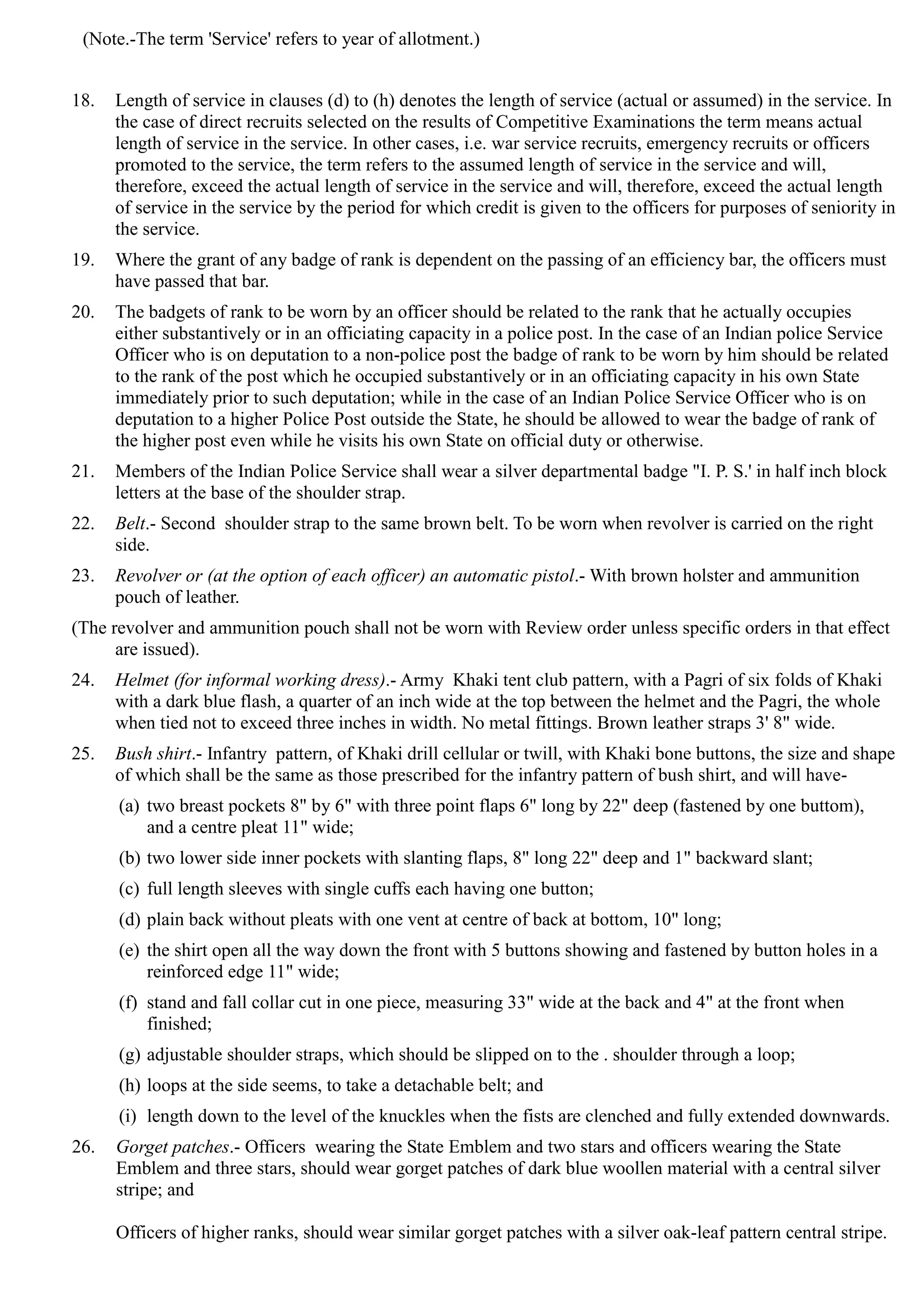
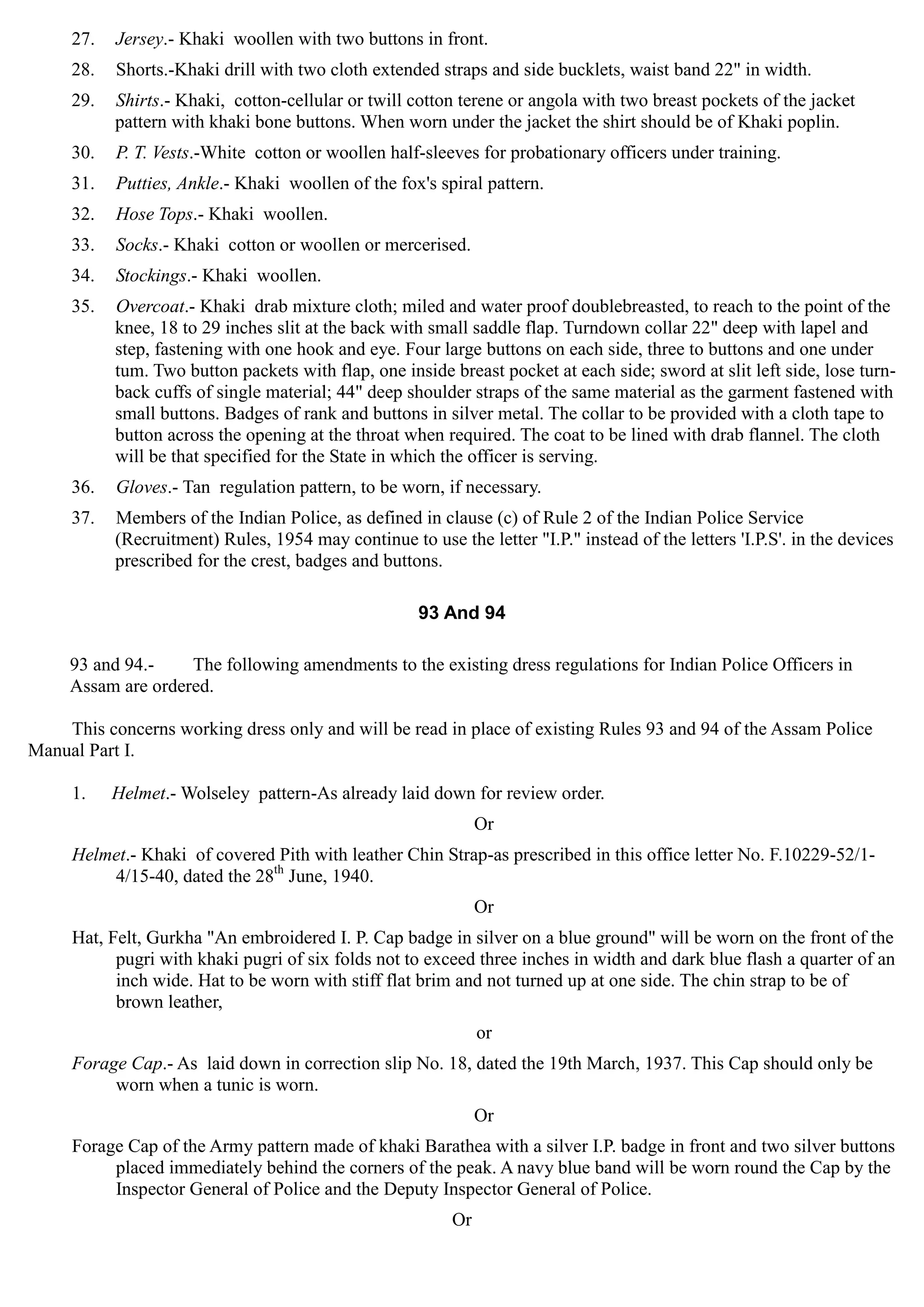
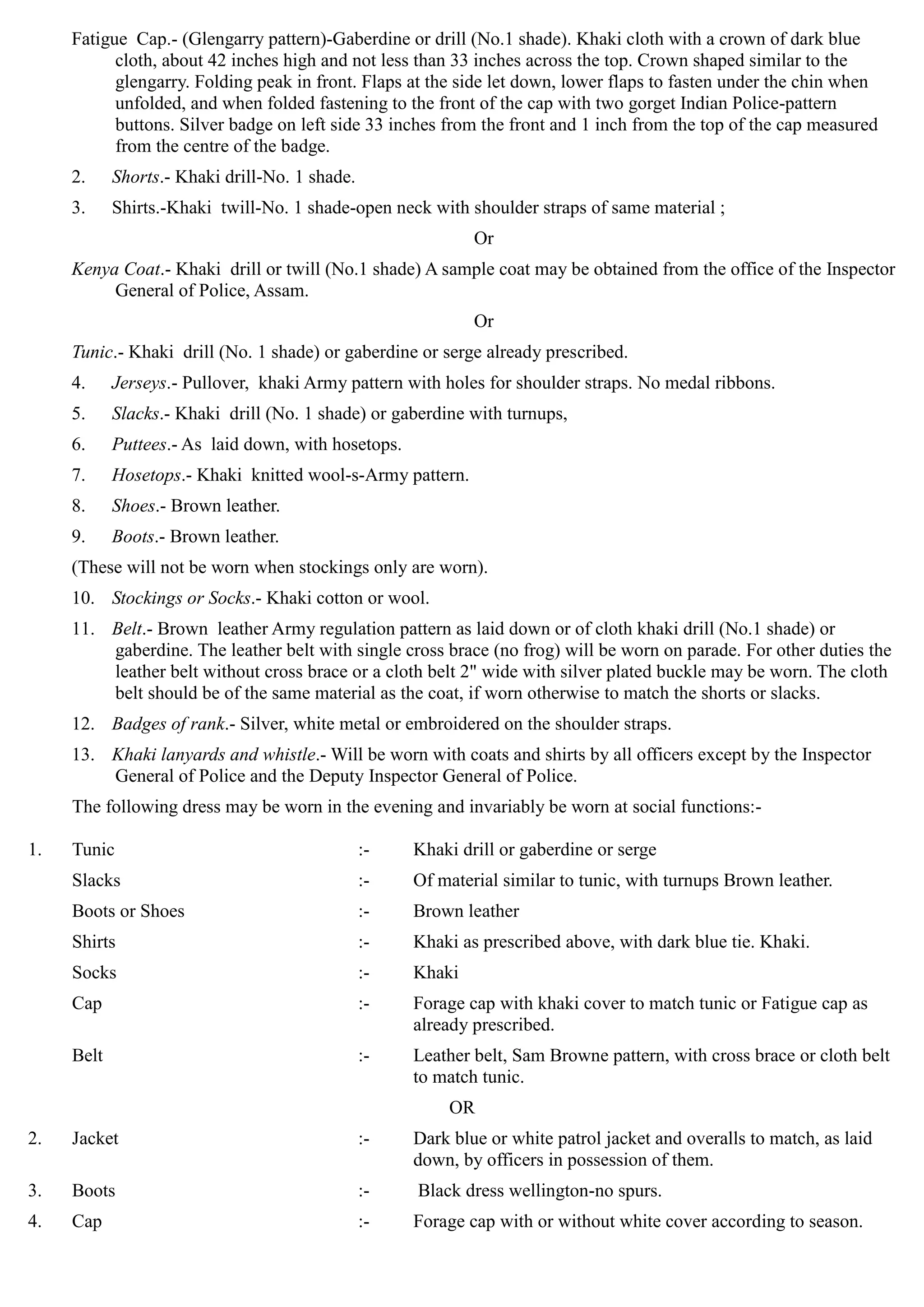
![Note:- 1. Dress for parades will be worn as ordered by the senior officer present.
2. Ties will not be worn except when shirts are worn with tunics.
3. Medal ribbons will be worn with tunics, kenya coats and shirts.
4. The wearing of medals and. decorations will cease.
5. Full dress and mess dress will not be worn on any occasion.
[Approved in Home Department letter No. HPL-352/44/9, dated the 16th
November, 1944. Correction slip
No. 49, dated the 22nd
November, 1944, has been incorporated.]
95. Mess dress - Cold weather
Mess Jacket:- Blue cloth, pointed cuffs, 5 inches high at point and 22 inches behind, of the same material.
Roll collar of black silk, shoulder straps of blue cloth, tacked under the collar, with badges of rank as in working
dress, but without shoulder letters. Miniature medals and decorations to be worn on the left lapel, one inch below
the point of the shoulder, overlapping if necessary, but not projecting beyond the lapel. Colar badges should be
placed 3/4 inch below the medals.
Mess waistcoat.- White marcella, comers cut away open at the front and without collar, to be fastened with 4
small Indian Police buttons 11 inches apart.
Collar and necktie.- Collar, plain white linen, with black tie.
Overalls.- Dark blue cloth, with two stripes of 3 inch plain mohair braid 4 inch apart down the outside seam.
Black leather foot straps with steel buckle.
Boots.- Wellington, black, patent leather.
Spurs.- Box, with plain rowels.
Forage cap.- As in working dress, but with a white cover. Two covers to be provided.
96. Mess dress - hot weather
Mess Jacket.-Two, white drill, without braid or buttons.
Roll collar.- Shoulder straps of similar material with a small Indian Police pattern button at the top. One
inside breast pocket. Sleeves cut plaint with pointed cuffs 5 inches high at point and 22 inches behind. Badges of
rank and collar badges as in cold weather mess dress.
Waistcoat.- As in cold weather mess dress.
Note.- Where the climate renders this desirable, officers may wear a plain dark blue silk kamarband in place
of a waistcoat.
Collar and necktie.-As in cold weather mess dress.
Overalls.-White drill with black leather foot-straps, or as for cold weather, according to climate.
Boots, spurs and forage cap- As in cold weather mess dress.
97. Horse furniture
Bit.- Universal.
Bridle.-Ordinary double.
Girshs.-Dark blue.
Saddle. -Ordinary hunting, fitted with necessary D's.
Frog.- Of brown leather, attached to the shoe case (near side) for carrying the sword scabbard; shoe case
fitted with a leather steading straps.](https://image.slidesharecdn.com/assampolicemanualpart1-210925043445/75/Assam-police-manual-part-1-59-2048.jpg)
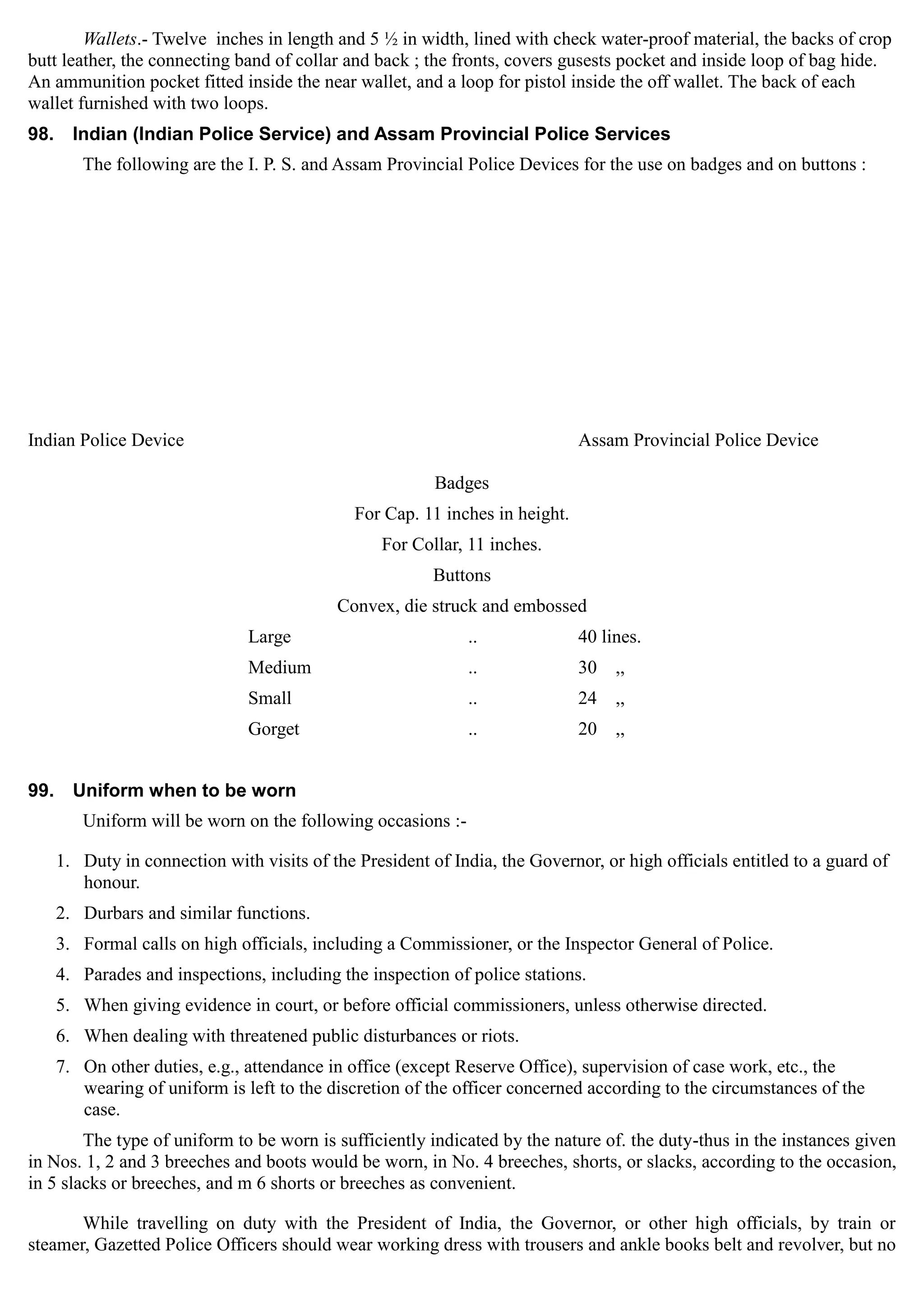
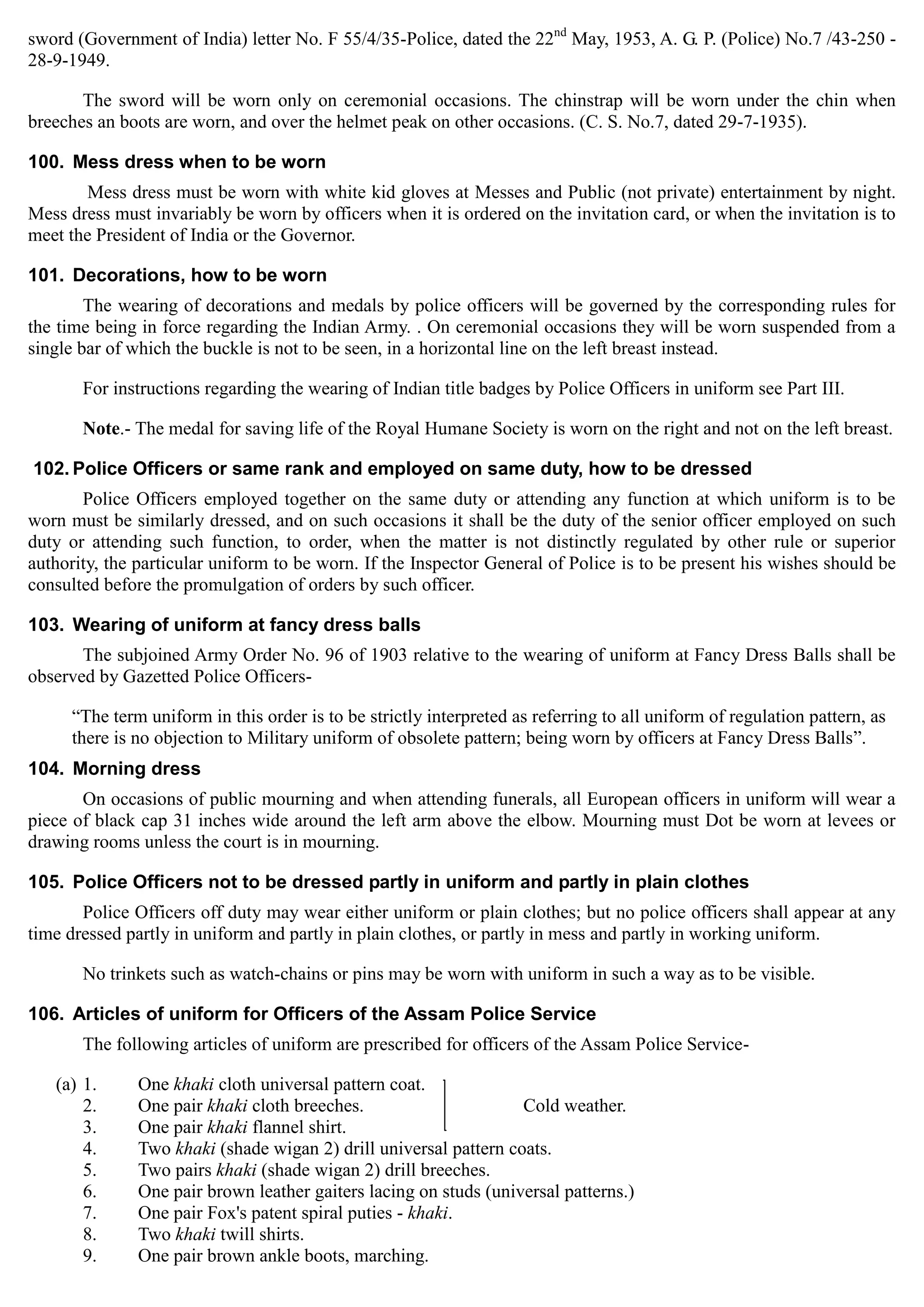

![(b) All Deputy Superintendents of Police who have been or maybe appointed by promotion from the rank of
Inspector of Police are eligible for the grant of an uniform allowance of :
(i) Rupees 400 in the case of those who have five or more years to serve after promotion to the rank of
Deputy Superintendent of Police. The grant of renewable at intervals of ten years only in the case of
officers having ten or more years to serve after promotion to the rank of Deputy Superintendent of
Police.
(ii) Rupees 200 in the case of those who have less than five years to serve after promotion to the rank of
Deputy Superintendent of Police.
2. All Deputy Superintendent of Police who have been or may be appointed by direct recruitment or by
promotion are eligible for the grant of an allowance of a sum not exceeding Rs. 600 for purchase of a horse and
saddlery.
3. Officers receiving the grants must furnish the comptroller, Assam within a month of the drawal of the
money with a certificate to the effect that the price of the uniform, horse and saddlery was not less than the
sanctioned grant. In case where the grant is not fully utilised, the savings effected should be at once refunded to
Government.
[This amendment takes effect from the 1st
April, 1951 ; Reference Home Department letter No. HPL.
523/50/15, dated the 23rd February, 1951].
CHAPTER VII
Police Launches
(Rules 109 to 111)
109. Launches
In certain districts Superintendents of Police have been provided with steam or motor launches.
Superintendents of Police are held responsible by Government for their proper use and up-keep and for the careful
expenditure of the funds allotted for that purpose.
110. Right to use launch
The Commissioner of the Division and the District Magistrate are entitled to the use of the police launch for
police purposes and should communicate with the Superintendent of Police who will arrange that the vessel is ready
for use at the time and place specified in the requisition.
A police launch (except those of the river police, and then only when necessity demands, as in pursuit of
dacoits, etc.) may not be taken by any officer beyond district limits except with the permission of the Inspector
General of Police.
111. Launches not to be used as Tugs
Launches should not ordinarily be used to tow large and heavy boats, but in exceptional circumstances such
as the transport of large forces on special and emergent duty when any long water journey is required to be
accomplished quickly, this rule may be relaxed.
This prohibition does not apply to the towing of patrol boats into position.
CHAPTER VIII
Conduct Rules of Gazetted Officers
(Rule 112)
112. The Government Servants' Conduct Rules
All gazetted officers must study ·.and observe strictly the rules of the Government published in the pamphlet
called “the Government Servants' Conduct Rules.”
[Correction Slip No. 40, dated the 24th
August, 1938).](https://image.slidesharecdn.com/assampolicemanualpart1-210925043445/75/Assam-police-manual-part-1-63-2048.jpg)
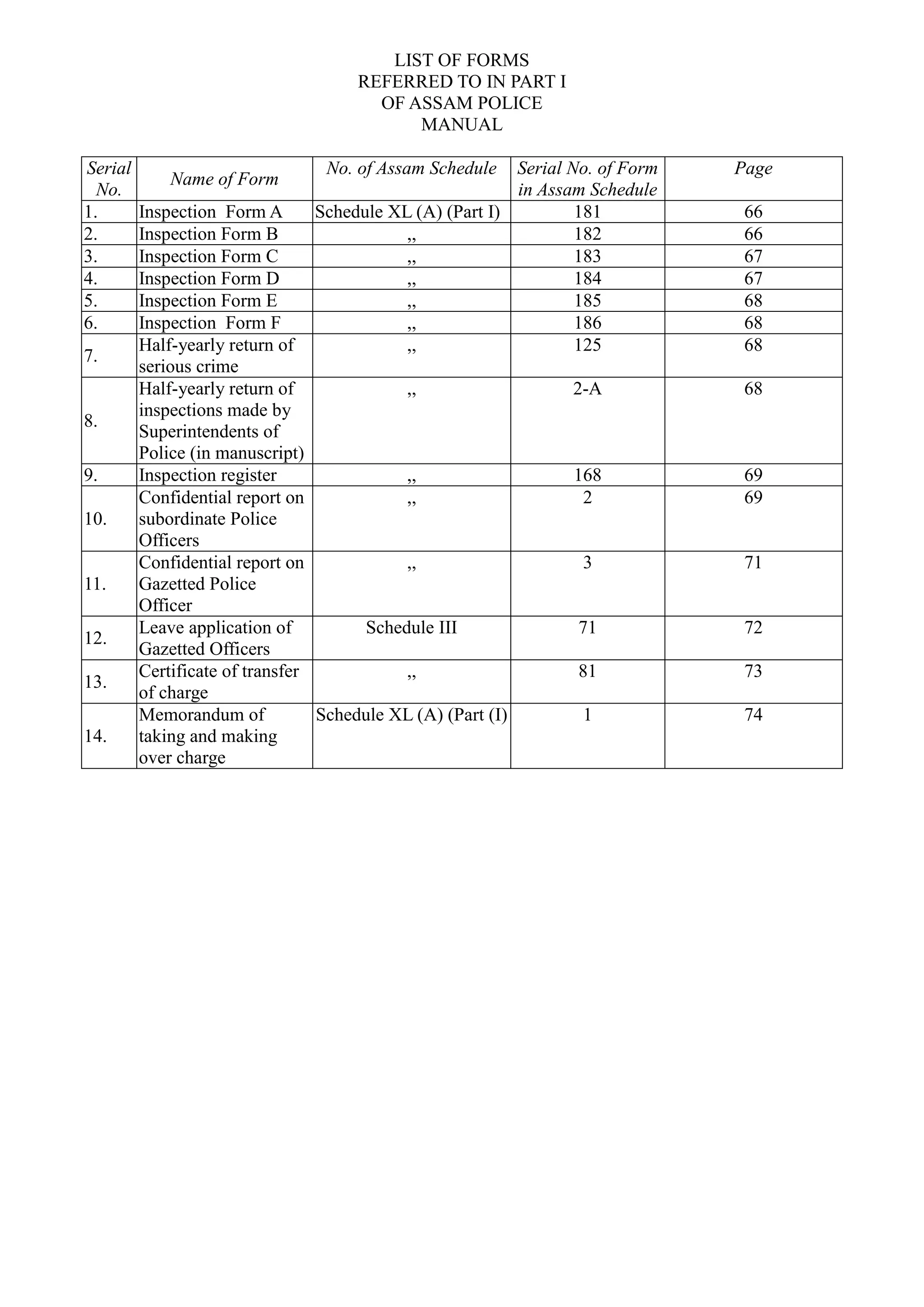
![No. 1
Inspection Form A
[Assam Schedule XL (A) (Part I) Form No. 181]
Referred to in Rule 14.
Statement showing incidence of crime under classes I, II, III and V of Statement 4, and how it has been dealt
with by Police during the quarter ending
COLUMNS
1. Name of Sub-division. 8. Percentage of columns 7 to 5 (cases only)
2. Name of P. S. (O. P. included). 8. Percentage of columns 7 to 5 (cases only)
3. Population. 9. Number in column 7 convicted divided into (a)
cases and (b) persons
4. Number of true cognizable cases (classes I, II,
III and V) reported. 10. Percentage of convicted to tried out, (columns 9
to 7), divided into (a) cases and (b) persons
5. Number of cases in column 4 investigated in
which- Final Forms submitted. 11. Remarks, (Full explanation should be given
here for failure shown in columns 8 or 10). The
6. Percentage of columns 5 to 4 (investigated to be
figures for and name of independent O.P. to be
reported).
shown separately, figures for subordinate O.Ps.
7. Number of cognizable cases investigated which to be included in those P.Ss.
have been tried out, divided into (a) cases and
(b) persons.
N. B.-Separate statement must - be prepared showing the black and red ink entries in the Khatian.
No. 2
Inspection Form B
[Assam Schedule XL (A) (Part I). Form No. 182] Referred to in Rule 14.
Burglary and theft cases
COLUMNS
1. Sub-division. 7. Number not enquired into.
2. Number of true cases under Sections 457/380, 7. Number not enquired into.
I.P. C. reported.
8. Number of caes sent up in Charge Sheet.
3. Number of true cases under Section 457 I.P.C.
Convicted 9. Cases.
reported.
10. Persons.
4. Number of true cases under Sections 457/511
I.P.C, reported. 11. Number of true cases of theft reported to Police.
5. Number of true cases under Section 411, I.P.C. 12. Number not enquired into.
reported. 13. Number of Charge Sheets submitted.
6. Total of columns 2, 3, 4 and 5. Convicted excluding 14. Cases.
direct cases. 15. Persons.
16. Remarks.](https://image.slidesharecdn.com/assampolicemanualpart1-210925043445/75/Assam-police-manual-part-1-65-2048.jpg)
![No.3
Inspection Form C
[Assam Schedule XL(A) (Part I). Form No. 183] Referred to in Rule 14.
Bad Livelihood
COLUMNS
1. Name of Sub-division. 8. Number of cases in column 2 tried in villages.
2. Number instituted on Police report. divided into 9. Average duration from date of Police report of
(a) cases and (b) persons. cases shown in column 5.
3. Number instituted by order of Magistrate. divided 10. Average duration from date of Police report
into (a) cases and (b) persons. shown in column 6.
4. Number instituted on petition. divided into (a) 11. Longest duration from date of Police report of
cases and (b) persons. any case.
Number shown in column 2. 5. Acquitted. divided 12. Number of cases in column 6 in which security
into (a) cases and (b) accepted.
persons.
13. Average amount of security Order.
6. Convicted. divided
14. Remarks (if the securities were upon any grounds
into (a) cases and (b)
unsuitable to the fact to be noted here).
persons.
7. Number of cases shown in column 2 of which
S.P. personally sanctioned the Police reports.
No. 4.
Inspection Form D
[Assam Schedule XL (A) (Part I). Form No. 184] Referred to in Rule 14.
Statement of cases under Police investigation for more than 14 days during the quarter ending
COLUMNS
1. Name of Sub-division. 5. Nature of case, i e.; Section of the law under
which return.
Name of P. S.
6. Nature of Final Report.
2. P. S. number of case.
7. Remarks. (Here should be noted action if any
3. Date of First Information.
taken by S. P. to verify the necessity for delay).
4. Date of Final Report Form.
No.5
Inspection Form E
[Assam Schedule XL (A) (Part I). Form No. 185] Referred to in Rule 14.
Statement of cases sent up by the Police in charge sheet judicially declared intentionally or maliciously false for the
quarter ending
COLUMNS
1. Name of Sub-division. 5. Number of cases column 4 which were originally
2. Name of P.S. Or O.P. returned by Police in Final Report, but sent up in
3. P. S. number of case. Charge Sheet by Magistrate's order.
4. Charge Sheet number. 6. Remarks. (The S. P. will note the action if any,
taken by him.)](https://image.slidesharecdn.com/assampolicemanualpart1-210925043445/75/Assam-police-manual-part-1-66-2048.jpg)
![No.6
Inspection Form F
[Assam Schedule XL (A) (Part I), Form No. 186] Referred to in Rule 14.
Complaints of offences cognisable and non-cognlsable made against the police
COLUMNS
1. Section of Law under which charge made. 6. Finding of investiptiua officer, i. e., whether true
or false.
2. Date of institution of Complaint.
7. Final orders of Court or if not broup,t to trial of
3. Name of complainant.
District Magtstrate.
4. Name and rank of officer complained against.
8. Final action taking departmentally.
5. Date when local enquiry commenced, if any, name
9. Remarks.
and rank of investigatina officer.
No.7
Half-yearly return of serious crime
[Assam Schedule XL (A), Form . No. 12S) Referred to in Rule 44.
(For details see Part IV)
No.8
Half-yearly return of inspections made by Superintendents of Police
[Assam Schedule XL (A), (Part II, Form No. 2-A]-Referred to in Rule 57.
COLUMNS
1. Name of P. S., O. P., or office. 3. Remarks.
2. Date of inspection.
N. B.-If any P. S., O. P., or office has not been inspected during the half-year the reason should be given
shortly and the date of the last Inspections made by the Superintendent and by the Circle Inspector, respectively.
No.9
Inspection Register
[Assam Schedule XL (A) (Part I), Form No. 168] - Referred to in Rule 61.
No. 10
Confidential report on subordinate police officers
[Assam Schedule XL (A) (Part I), Form No. 2]-Referred to m Rule 63
Confidential Report for the year ending 31st December
District___________________
Name ____________________________
Rant ____________________________
1. Character and conduct during the year :
2. Behaviour towards
(a) Superior officers:
(b) Subordinate officers :
(c) The Public*
:
3. Whether fit for promotion to the next higher
* Not required in the case of ministerial officers.](https://image.slidesharecdn.com/assampolicemanualpart1-210925043445/75/Assam-police-manual-part-1-67-2048.jpg)
![(a) Increment.
(b) Rank.
4. For what duties best suited?
5. Health, Physique and activities.
6. Length of time employed in this distriet:
7. If possessed of landed property, the amount thereof and districts in which the property is situated§
:
8. General remarks by the Superintendent of Police¤
:
9. Certified that all unfavourable remarks have been communicated.
Signature of the Superintendent of Police with date
10. General remarks by the Deputy Commissionerψ
:
Signature of the Deputy Commissioner with date
No.11
Confidential report on gazetted police officers
[Assam Schedule XL (A) (Part I), Form No. 3]-Referred to in Rule 64.
(Approved in letter No. 4427 G. J., dated the 23rd
October, 1922).
District ________________
Confidential report on _____________________________________________________for the year ending the
31st December, 19 .
(See instructions on reverse)
1. General ability
2. Tact
3. Temper
4. Judgment
5. Self-reliance
6. Power of Commanding respect
7. Knowledge of vernacular
8. State of health
9. General Remarks
(ON REVERSE)
N. B.-Instructions.- Immediately after the close of each calendar year, the Superintendent of Police will
submit, in duplicate, to the Deputy Commissioner a confidential report in this form on each Assistant and Deputy
Superintendent who has served under him during the previous year, or part of the year. The Deputy Commissioner,
after recording his own opinion on the work of these officers, will forward the reports, together with reports (in
duplicate) In the same form on each offtcer who has served as Superintendent of Police in the district during the
year, to the Divisional Commissioner. The Commissioner will then add his own opinion and forward both copies of
the reports to the Inspector General of Police. One copy of each report will be retained by the Inspector General of
Police, the second being forwarded with the Inspector General's own remarks to the Chief Secretary to the
Government of Assam.
§ It is not necessary each year to note the amount of property held but only alterations should be shown.
¤ All good service or black marks awarded during the year should be shown. Other instructions contained in the Assam Police Manual,
Rule 1-63, regarding the writing of the report should be carefully followed.
ψ Not required in the case of ministerial officers
1. Name and rank of the officer](https://image.slidesharecdn.com/assampolicemanualpart1-210925043445/75/Assam-police-manual-part-1-68-2048.jpg)
![In the case of officers serving in the Railway Police, and the Criminal Investigation Department, the
Superintendent of Railway Police and the Special Superintedent of Police Jn charge of the C. I. D., respectively, will
forward the reports direct to the Inspector General who will forward one copy to the Chief Secretary to the
Government with his own remarks.
The names and designations of the reporting officers should be furnished in each case.
No. 12
Application for leave of absence under Rule of the Fundamental Rule
[Assam Schedule III-Accounts, Form No. 71]
Referred to in Rule 86.
Name and appointment of
officer
Last leave enjoyed Period and nature of leave
applied for and from what
date
Remarks by Controlling
officer
Leave address-
The ________________of _________19___
Signature of applicant.
No.
The .............
Forwarded to the
Comptroller, Assam for
submission to Government
with the usual report.
Controlling Officer
No. 13
Certificate of traosfer of charge
[Assam Schedule III, Form No. 81]:- Referred to in Rules 90 and 91.
No ........
To
The
CHIEF SECRETARY TO THE GOVERNMENT OF ASSAM
COMPTROLLER, ASSAM.
EXECUTIVE ENGINEER,
DIVISION.
Sir,
With reference to Article 47 of the Civil Account Code, we, the undersigned, have the honour to report that
we have this .............. day of …..........at …....................o'clock in the ….........................noon, respectively,
delivered over and received charge of the office of the ..................................................of …............................... in
the...................................... District................................. day of ...............19 .]](https://image.slidesharecdn.com/assampolicemanualpart1-210925043445/75/Assam-police-manual-part-1-69-2048.jpg)
![To be struck out and initialled when there is no official residence.- I have occupied the official residence
allotted to me with effect from
[I have occupied the official residence allotted to me with effect from …............. day of …...........19 .]
…......................... Relieving Officer*
.
[I have vacated the official residence allotted to me with effect from …..................... day of …........ 19 .]
…..........................Relieved Officer*]
And, with reference to Article 78 of Civil Account Code, I (the Relieving Officer) acknowledge to have
received ................ Rs .......................... ( ….................... ) of the Permanent Advance, and that the full amount of
such advance is due from and to be accounted for by me ….............................................. District.
Signature * ….........................
Relieving Officer's
Designation …........................
No. 14
Memorandum of taking and making over charge.
[Assam Schedule XL (A) (Part 1) Form No. I)
Referred to in Rule 91.
I have carefully examined all the office books and accounts and have satisfied myself, so far as lay in my
power, that they have been correctly kept and that the expenditure on account of contract contingencies as shown in
the statement attached hereto has not been excessive up to date.
I have also examined the Registers of lands and Buildings and of Landed Property and found that they have
been kept up to date.
The amount of cash in hand this day is Rs …............................. and is on the following accounts
(Here will follow details)
I have noted all pending matters of an important nature. and have received the note-book of my predecessor.
The clothing account of each officer and the General clothing account of the district have been made up to-
date.
(i) The following sums are due to contractors and others :
(Here will follow details)
or
(ii) No sums are due to contractors or others.
N.B.- When any sum of money is due the heading will be as in. (i) otherwise as in (ii),
(On reverse)
The acquittance rolls for the month before last have been received duly signed and stamped and are filed in
the office.
* The signatures should be legibly written, as when they cannot be deciphered, great deal of delay arises in dealing with these certificates.](https://image.slidesharecdn.com/assampolicemanualpart1-210925043445/75/Assam-police-manual-part-1-70-2048.jpg)
